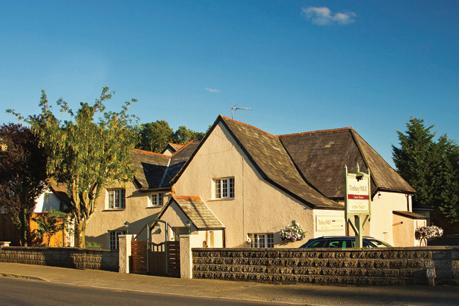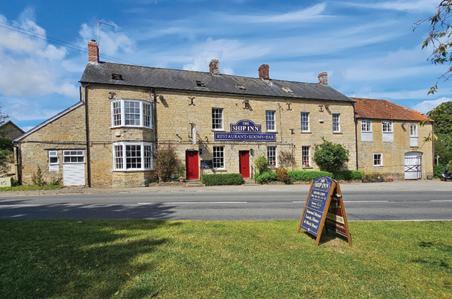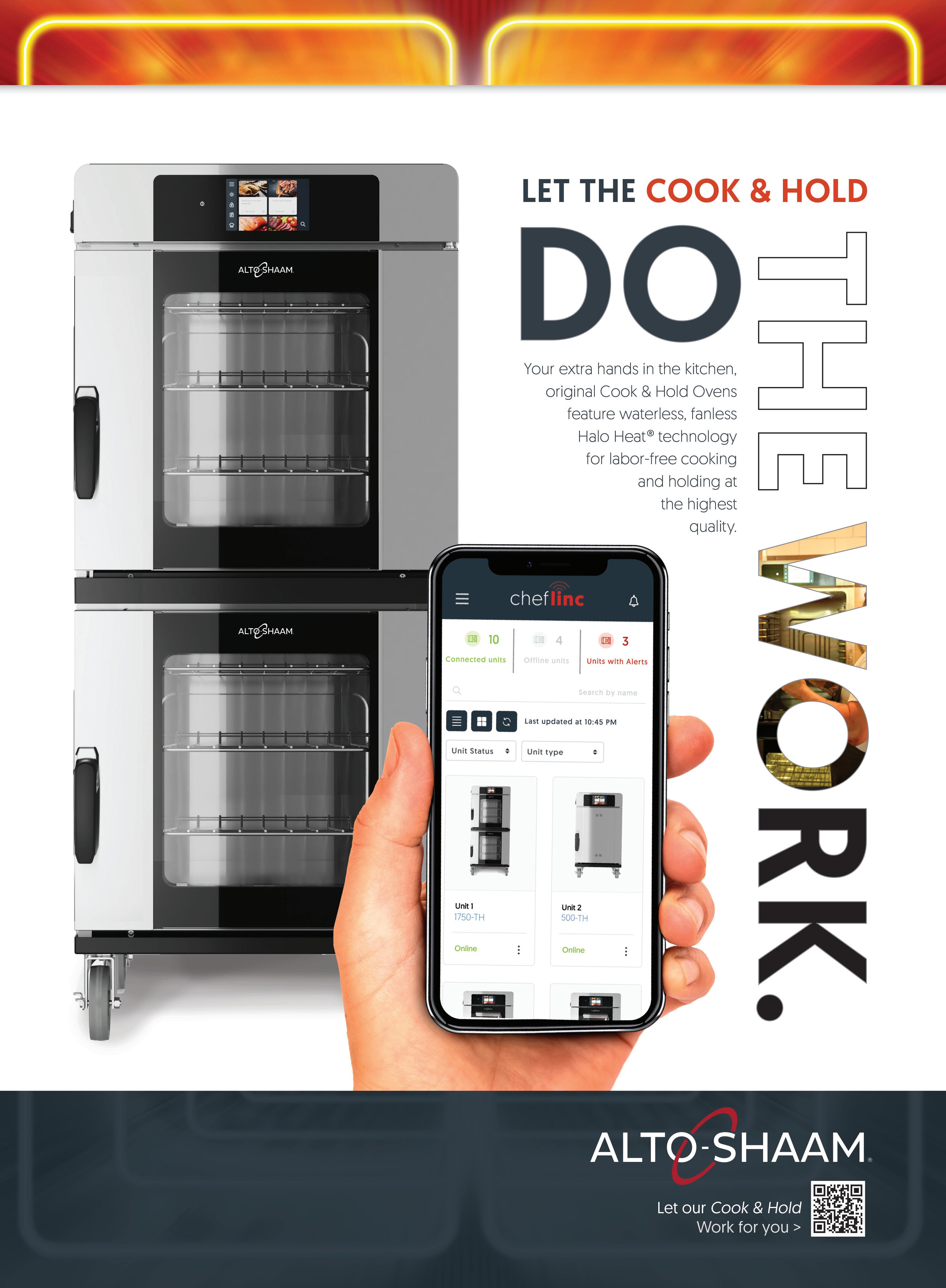


















EDITOR Peter Adams
We are celebrating our 25th anniversary, and far too much has happened in those 25 years for me to comment here, so please see page 10 for my "25 Year Hospitality Review"!
Our lead story provides some good news –well, "good-ish".
Celebrating a slowdown in hospitality closures, welcome though it is, should not be cause for celebration.
Quite the opposite. New openings, thriving businesses, happy operators and happy customers – these are causes for celebration. But we take our good news where we find it.
Summer was indeed glorious, and it has had a massive impact on the bottom line for operators. This uplift has carried through to the beginning of autumn, with average sales in venues rising by 2.8% in the seven days to 27 September compared to the same period in 2024.
They increased again in the following week to 4 October, albeit by a marginal 0.1%. Despite a blip in the first half of September, this builds on a solid end to summer and means on-premise drinks sales have been ahead year-on-year for seven weeks out of ten since late July.
But this success going forward depends heavily on Chancellor Rachel Reeves' Budget next month. Earlier this month, the government announced a fast-track review into licensing laws, and I do welcome that. However, it is not what operators are saying they asked for.
With costs sky-high and footfall down, who would want to keep the lights
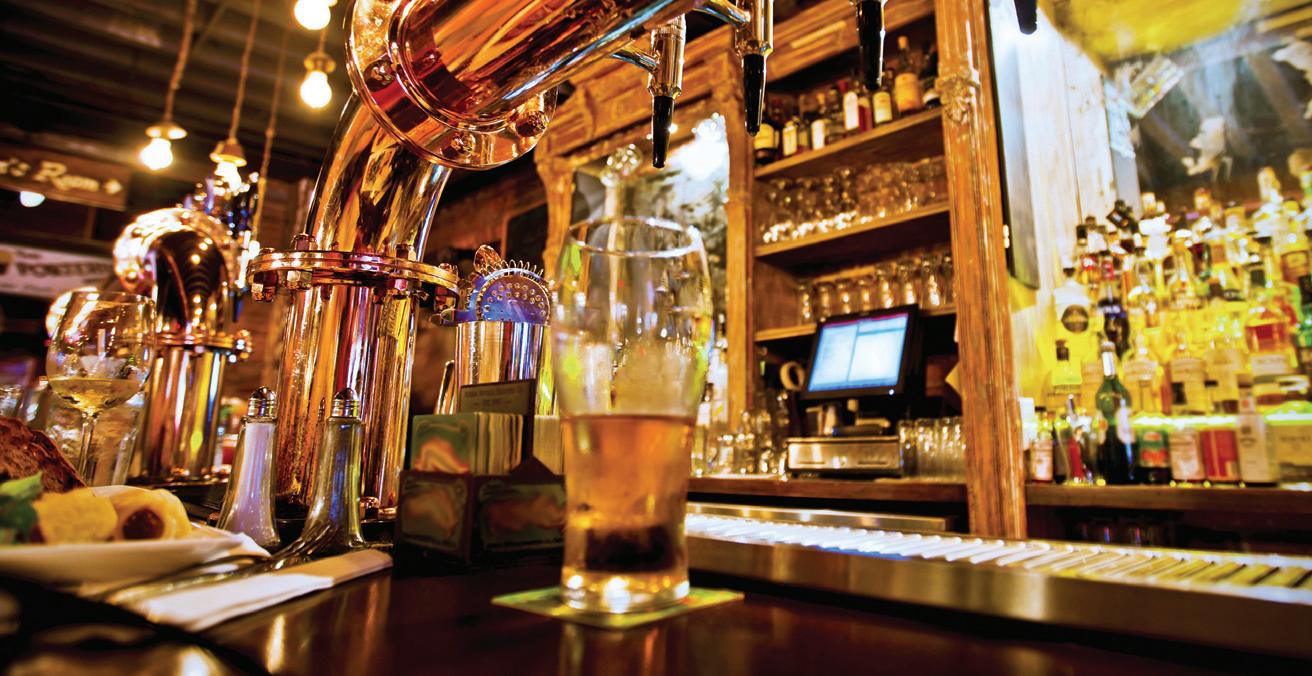
on later in an empty establishment?
I was heartened that MPs have written to the Chancellor outlining their concerns, particularly regarding VAT. Darren Paffey, MP for Southampton Itchen, has once again called for a hospitality VAT cut. It won't happen, of course – not in this parliament's lifetime – but one lives in hope for the future!
The coming weeks will prove critical for our sector, and, as we celebrate a quarter-century of reporting on this dynamic industry, we remain committed to championing the voices of operators and holding decision-makers to account.
As always please do share your views with us!
Please watch out for coming issues where we'll be sharing insight and guidance from industry experts on a range of topics
I would encourage all our readers to follow us on X/Twitter @CLHNews and visit our website at www.catererlicensee.com to sign up for our twice weekly e-newsletter and our weekly digital issue.
I can always be contacted at edit@catererlicensee.com

At The Commercial Oven Store, we take great pride in being your go-to destination for all your commercial oven needs.
We understand that when it comes to running a successful business, having the right equipment is crucial. That’s why we have dedicated ourselves to providing top-notch products, coupled with expert advice, to help you make informed decisions and achieve your goals.
As a supplier of commercial ovens, we have established strong partnerships with leading manufacturers in the industry. By working closely with these renowned brands, we ensure that our customers have access to a wide range of high-quality ovens that meet the diverse needs of various businesses.
Whether you’re in the food service, hospitality, or catering industry, we have the perfect oven to suit your requirements.




At Richard Allen & Associates we are proud to offer our clients a fresh approach to accountancy, making our expertise in this field accessible to all.
The sector has experienced particularly challenging conditions:
• In the first six months of 2025, 1,706 accommodation and food service companies (including hotels, restaurants and pubs) closed
• July 2025 marked the first time hospitality insolvencies rose consecutively for three months since prior to January 2022
• While annual insolvencies fell 7% year-on-year Hospitality monthly figures have been climbing steadily throughout 2025
The employment picture is particularly severe:
• 58,000 workers in accommodation and food services lost their jobs between January 2024 and January 2025
• By August 2025, hospitality had accounted for 53% of all UK job losses since the October 2024 Budget, with 89,000 of the 164,641 total job losses nationwide
• UKHospitality projects that 111,000 hospitality jobs will be lost by the November 2025 Budget
• One in 25 hospitality jobs have been lost, representing 4.1% of all jobs in the sector - seven times higher than the rate in the broader UK economy
Saxon Moseley, partner and head of leisure and hospitality at leading audit, tax and consulting firm RSM UK, said: “After three consecutive months of rising insolvencies, the latest fall will come as a relief for the sector. This was likely helped by good weather over the summer, encouraging consumers to go out and socialise, which led to GDP growth of 1.2% in the sector in August. But with food inflation really biting and challenges passing on further cost increases, it’s unlikely this decline in insolvencies will continue.
“Not only are operators having to factor in higher National Insurance costs, but wages in the food and accommodation sector also hit a record high in August, as operators try to hold onto staff. This combination results in a double whammy for businesses who are caught paying higher hourly wages and more tax on these payments.
“Hospitality sales have been lacklustre for most of this year. Pubs were the main beneficiaries of the hot weather during the summer months, while restaurants and bars struggled. With summer trade now behind us, many will be looking to the Christmas party season in the hopes that provides a boost to sales.
“The hospitality sector will be nervously waiting to see what measures are announced in the budget. There’s an opportunity for government to use the budget as a tool to kickstart the UK economy, but to do that, we need to see investment in the right areas and measures that foster confidence without driving inflation.”
MP’S LETTER
The sector's concerns in the lead up to chancellor Rachel Reeve’s autumn budget have been amplified by growing parliamentary opposition to proposed changes to the business rates system. (See Page 5.)
A group of fifty Labour MPs has written to Chancellor Rachel Reeves expressing alarm over plans to imple-

ment a higher rates band for larger hospitality properties.
The letter, coordinated by Emma Lewell MP, cautions that the proposals risk triggering venue closures and redundancies across an industry already experiencing "acute pressure" from rising operational costs, including those introduced in the Chancellor's previous Budget.
The parliamentarians highlighted that 84,000 positions within the pub and restaurant sectors have been lost since that fiscal statement.
The MPs have urged the Chancellor to abandon the proposed surcharge affecting larger properties—a category encompassing hotels, warehouses and major retail units. Whilst the measure aims to fund reduced rates for smaller high street retailers, major supermarket chains have also voiced strong opposition to the plans.
The letter advocates for a five per cent reduction in VAT applicable to hospitality businesses, arguing this would stimulate consumer demand, encourage capital investment and improve venue viability. Additionally, the MPs called for reduced National Insurance contributions to safeguard entry-level employment following last year's unexpected tax increase.
Labour's previous Budget imposed approximately £3.4 billion in additional annual costs on the hospitality sector, including mandatory wage increases. In April 2025, operators faced a £500 million business rates increase alongside numerous other financial burdens.
Prior to that Budget, smaller businesses had lobbied for an extension of the 75 per cent discount introduced during the Covid pandemic. Instead, the Government reduced this to 40 per cent relief, capped at £110,000 per licensed premises.
Darren Paffey, MP for Southampton Itchen, a signatory to the letter is calling for measures to safeguard the hospitality sector's future, including lower business rates, a VAT cut, and reduced National Insurance Contributions to protect jobs and livelihoods.
Mr Paffey said: "Hospitality businesses are often the beating heart of our communities in Southampton, and I want them to know that I’ve got their back.
"The message from my first two Business Forums was clear: times are tough, and businesses need more support to ensure that they can continue to generate jobs and contribute to our local economy."
Kate Nicholls, chair of UKHospitality, welcomed the parliamentary intervention. "We're encouraged to see substantial cross-party support for our Budget proposals," she stated. "We urge Government to prioritise maximum possible business rates discounts for smaller hospitality businesses whilst exempting larger properties from the surcharge. Alongside reforms to National Insurance contributions and VAT reduction for hospitality, these measures are essential."
The letter's signatories include Dawn Butler, John McDonnell and Alex Sobel, amongst others.

By Sonia Jordan, Restructuring and Insolvency Partner, Knights Professional Services Limited

Being a business owner in 2025 isn’t for the faint of heart, particularly in the hospitality industry. Rising costs and an uncertain market have left many panicked, watching other business owners across the country close their doors for the very last time. But how did we get here, and what can we do to avoid this seemingly inevitable fate before it’s too late?
In a summer period lacking major events that typically boost customer spending, coupled with inflationary pressures caused by increased base costs, recent ONS statistics revealing the loss of a staggering number of jobs in the hospitality industry, although shocking, might not have been as great a shock to those operating in this sector.
When we look back at the post-pandemic period, we see a sector (like many) that has faced increased employment costs, higher business taxation, and decreased customer confidence and spending.
Whereas some other sectors can shift towards technology and increased utilisation of AI, achieving lower costs and increased productivity and profit margins, the hospitality sector relies heavily on human capital. Reportedly, 55% of all jobs lost across the UK economy since October 2024 were lost in the hospitality sector.
We are in (or fast approaching) a trading period which typically heralds a seasonal trading boost in the hospitality sector and a cornerstone period for the UK economy. However, concerns about the forthcoming November Budget are already evident, with widespread speculation of further increases in business taxation. Speculation breeds uncertainty, and uncertainty leads to a lack of confidence for business owners and managers in making investment, expansion or contraction decisions.
JUGGLING COMPETING INTERESTS
For business owners and managers, there is no remoteness from the people directly affected by their decisions. Working face-to-face or in daily contact with employees and suppliers, they see the immediate impact of any decisions they make and feel the weight of responsibility in dealing with the sometimes competing interests of lenders, employees, suppliers, HMRC and landlords, and very often may feel that personal considerations must sit at the bottom of a very long list.
For companies, the legal framework when operating a business in financial stress or distress is complex and can be difficult to navigate, especially as much of the legislation is nuanced with only a few, obvious “hard no’s” or prohibitions.
Necessarily, legislators must provide sufficient scope for business leaders to navigate fluctuating and dynamic situations in real time without over-proscription and without hampering entrepreneurialism. But at the same time, legislators will provide protections for the broader community (including other businesses) to enable trading relationships to develop with confidence.
Broadly speaking, those directly responsible for the management of businesses must:
• Continually monitor and document the review of the financial state of the business.
• Act in the best interests, not only of the company and its shareholders, but also key stakeholders - including employees.
• If the company is insolvent or bordering on insolvency, consider the potential impact on creditors of the company when making decisions in the management of the affairs of the company.
This is a non-exhaustive list and only a fraction of the considerations to be borne in mind and documented. Too often, I have sat across the table from a business owner/manager whose company has gone into an insolvency process (i.e. liquidation or administration) only to advise that they are at personal financial risk of penalties for violating the statutory framework or at risk of disqualification from acting as a director between 2-15 years.
These are not managers who have acted recklessly or without any thought for the consequences of their decisions, but well-intentioned people who feel the weight of their responsibilities and who have genuinely tried to keep the business going, their employees employed, and their suppliers paid.
ENGAGE! ENGAGE! ENGAGE!
The minefield is such that my unchanging message to businesses and individuals over my 30-year career as a business rescue and insolvency specialist has been and will always remain: seek advice from a regulated restructuring and insolvency professional at the first signs of financial or operational difficulties.
Do not fall into the trap of thinking all you have to do is dig deep, plough through and with a fair passing wind, everything will be alright. Neither is it all on your shoulders. The UK has a mature and sophisticated network of regulated restructuring and insolvency professionals who can support business owners and managers through, and most importantly, out the other end of a tempestuous storm. Working with you as a teammate and adviser is often the very protection and assurance you need in times of difficulty.
A new report from hospitality technology provider Zonal, in partnership with CGA by NIQ and UKHospitality, reveals the deep emotional, social and economic value of hospitality venues across the UK – and the urgent need to protect them.
The report, GO Technology: The social value of hospitality, based on a survey of 5,000 nationally representative British adults, shows that 69% of British consumers say hospitality plays an important role in their communities, and 74% agree the industry needs and deserves greater support from Government.
The survey of 5,000 British adults shows the importance that hospitality venues have in our everyday lives and bringing people together, with 67% of respondents agreeing that eating and drinking out is as important to their social lives as it was a year ago.
When asking consumers about a local business that holds significance for them, 66% choose a hospitality venue. More than a fifth (22%) name a pub and 15% cite a restaurant. Cafes & coffee shops (12%) and bars (7%) are also deemed important.
What makes our favourite venues so special comes down to a selection of key factors which shape the connections and memories we make, such as:
• Staff remember me (32%)
• It’s independent (32%)
• Visiting is a tradition with family and friends (27%)
• It’s inclusive to everyone (26%)
• It has a great atmosphere / music I like (25%)

• I have special memories from visits (24%)
Nearly three quarters (72%) of consumers agree the hospitality sector is a good local employer.
The industry is particularly important to younger adults, whether starting a long-term career or earning money in the short-term.
From city centres to rural villages, hospitality is the beating heart of Britain’s social life. Yet closures are rising, especially in rural areas where alternatives are few and far between. Just 21% of rural residents say their high street has improved in the past year – compared to 62% in urban areas.
Tim Chapman, Chief Commercial Officer, Zonal, comments: “The hos-
pitality industry is well aware of the important role we play on our high streets, of the great community work we do, and that we are a fantastic employer and creator of jobs in every corner of the country. However, to see that reflected in consumer sentiment in this research is really encouraging and the sector should take heart from it.
“The report clearly demonstrates that what our pubs, bars, restaurants, cafes and hotels offer to people is so much more than just a plate of food and something to drink. That the majority of people are still prioritising going out, even as the cost of living crisis continues to bite, clearly demonstrates the true value of the hospitality sector.”
Karl Chessell, Business Unit Director – Hospitality Operators and Food, EMEA, CGA by NIQ, says:“Our research makes it very clear that pubs, bars and restaurants have a very special role in people’s lives. The sector has a hugely important part to play in social cohesion, but that role is being compromised by the soaring costs of doing business. Consumers remain very enthusiastic about eating and drinking out, and their desire for their local venues to be protected adds extra weight to the industry’s urgent calls for targeted support.”
Allen Simpson, Chief Executive, UKHospitality, adds: “This research confirms what we hear every day from our members: hospitality is more than just a business – it’s a vital part of our communities, our social lives, and our high streets.
The public is clear: hospitality deserves greater backing, and with the right action from Government, we can unlock its full potential to regenerate high streets and strengthen communities nationwide.”
UKHospitality has launched a new, easy-to-use online tool for hospitality teams to write to their MP, urging Government action
This

Kate Nicholls, Chair of UKHospitality, said: “We know how passionately people who work in hospitality feel about the sector, so this new tool allows them to join the campaign, too.
“There are millions of people that have built a career in this sector and, critically, rely on it for employment and supporting their families. It’s so important that they can make their voice heard.
“I urge everyone involved in hospitality to share this tool with their teams and encourage them to write to their MPs.
“By uniting our voices, we can send a clear message to the Government that the hospitality sector is being taxed out and needs urgent support in the forthcoming Budget.”
Publicans up and down the country have expressed concerns following the announcement that pubs will somehow be ‘saved’ by being allowed to stay open into the early hours.
The Government has announced a review of licensing laws with the stated aim of extending opening hours for pubs, clubs, and restaurants in England and Wales (Scotland would be unaffected).
The reported goal is to boost the night-time economy and support the struggling hospitality sector, however according to campaign group Campaign for Pubs it will do neither of these things and is yet another example of how little the current Government understands (or it seems cares about) pubs and stopping them closing.
Later opening hours, the campaign group said, is not something that publicans have asked for, nor is it something that will make any difference to getting pubs through the cost of living crisis.
The reality is that as a direct result of the Government’s disastrous cost hikes in the last Budget, many pubs have had to reduce opening hours and cut staff numbers and hours. Allowing most pubs to stay open longer is completely meaningless, when already pubs are shutting earlier than usual just to reduce costs and stay afloat.
Staying open later would mean higher energy bills and staff costs, something many publicans couldn’t even contemplate at the moment at a time when the combined impact of the Government’s National Insurance and wage hikes plus sky high energy bills are making it difficult for many landlords to make a living.
In reality, the only few premises that would benefit from this would be city centre bars, that are not the venues that are really struggling at the moment.
Worse still, many of the media articles claim that the measure has been “welcomed by the hospitality industry” whereas in fact, publicans and independent publicans’ representative groups have not been consulted, only those who represent large pub owning companies (often when these companies do not even run the pubs themselves, but merely see this as another opportunity to increase rents and beer prices on hard pressed pub tenants).
Commenting Dawn Hopkins, Vice Chair of the Campaign for Pubs and the licensee of the Rose Pub and Deli, Norwich said:
“Longer opening hours won’t keep pubs open. What we need is real support — lower VAT, help with energy bills, and fairer business rates. Around one pub a day is closing, taking staff, small breweries, and local suppliers down with it.
“Instead of meaningless measures creating absurd headlines, the Government needs to wake up to the situation pubs are in and reduce the cost burden on pubs, through a VAT cut, business rates reform and action to bring down energy costs for small businesses. Yet no one ever asks the people actually running pubs — you’d think listening to publicans might be the intelligent place to start.”
Paul Crossman, Chair of the Campaign for Pubs and a licensee of the Swan, Slip and Volunteer Arms in York said:
“The Government is plain wrong if it thinks the woes of the pub and hospitality industry are in any way due to the licensing laws at this point, and it is actually insulting to hard-pressed publicans to see these reforms framed as any kind of solution to the ongoing crisis in the industry.
“In reality the ground level crisis facing pubs and hospitality boils down to a toxic combination of the ever-rising costs involved in running a hospitality business and reduced customer spend amid the ongoing cost of living crisis. That is why in reality most pubs have already curtailed their opening hours, while nightclubs have closed in droves.
“These are the immediate issues that the Government should focus their attention upon by heeding desperate universal calls for action on VAT, employers NI, energy costs and business rates. We need action in all those areas and more if pubs, nightclubs and wider hospitality are to have any chance of recovering, not a tweak to licensing laws which, in practice, will only likely further benefit off-licences and supermarkets seeking to sell cheap unsupervised alcohol further into the night.
“Meanwhile the growth potential of our own domestic brewers and other suppliers is being squandered as they are actively excluded from accessing most of their own local pub market due to contractual “tied” product supply arrangements which hugely favour generic global brands, and which are imposed and strictly enforced by corporate pub owners. If the Govt really wants the UK’s pubs to be able to help boost national economic growth, then the ongoing corporate abuse of the sector is one specific and crucial area where it could and should be taking urgent action.”
The Oxford Partnership’s latest Market Watch report, produced in collaboration with Vianet, shows that while the UK’s hospitality sector has settled into a steadier rhythm after the summer surge, inflation continues to squeeze real-term growth.
In September, the number of open outlets edged down to 99,691 (0.3% vs August), yet those that remained open saw occupancy rise +1.3% and average dwell times reach 142 minutes. Consumers are visiting less often but staying longer and spending more, though spend per head increases (+0.9% on drink and +1.6% on food) continue to lag behind the Bank of England’s inflation forecast of 4.0% for the same period.
Category performance reflected a selective consumer mindset. World Lager remained the best-performing lager category (+3.3% over the last
four weeks), followed by a steady showing from Premium Lager (+0.5%). Stout was September’s standout performer, surging +8.8% month-on-month, reinforcing the appeal of trusted, heritage-led brands. Across the regions, the pattern is clear: fewer venues, longer visits, and higher spend per head. London, the East Midlands and the East of England all reported dwell time increases of more than 10%, signalling that consumers are valuing hospitality occasions more, even as the overall estate contracts.
Alison Jordan, CEO of The Oxford Partnership, commented: “What we’re seeing now is a more measured, experience-led recovery. Consumers are going out less frequently, but when they do, they’re making it count, staying longer, trading up, and choosing quality over quantity.

Operators have shown incredible tenacity, maintaining opening hours and service standards despite intense cost pressures. The coming Budget is a critical moment; stability on business rates and taxation could be the difference between steady progress and another wave of closures.”
Despite the tightening outlet base, operators continue to protect trading availability, with the average hospitality venue open 64.6 hours per week, unchanged year on year.
As the industry heads toward the crucial Christmas trading period, The Oxford Partnership notes that true recovery depends on real-term growth catching up with inflation, underpinned by government measures that support reinvestment and job retention.
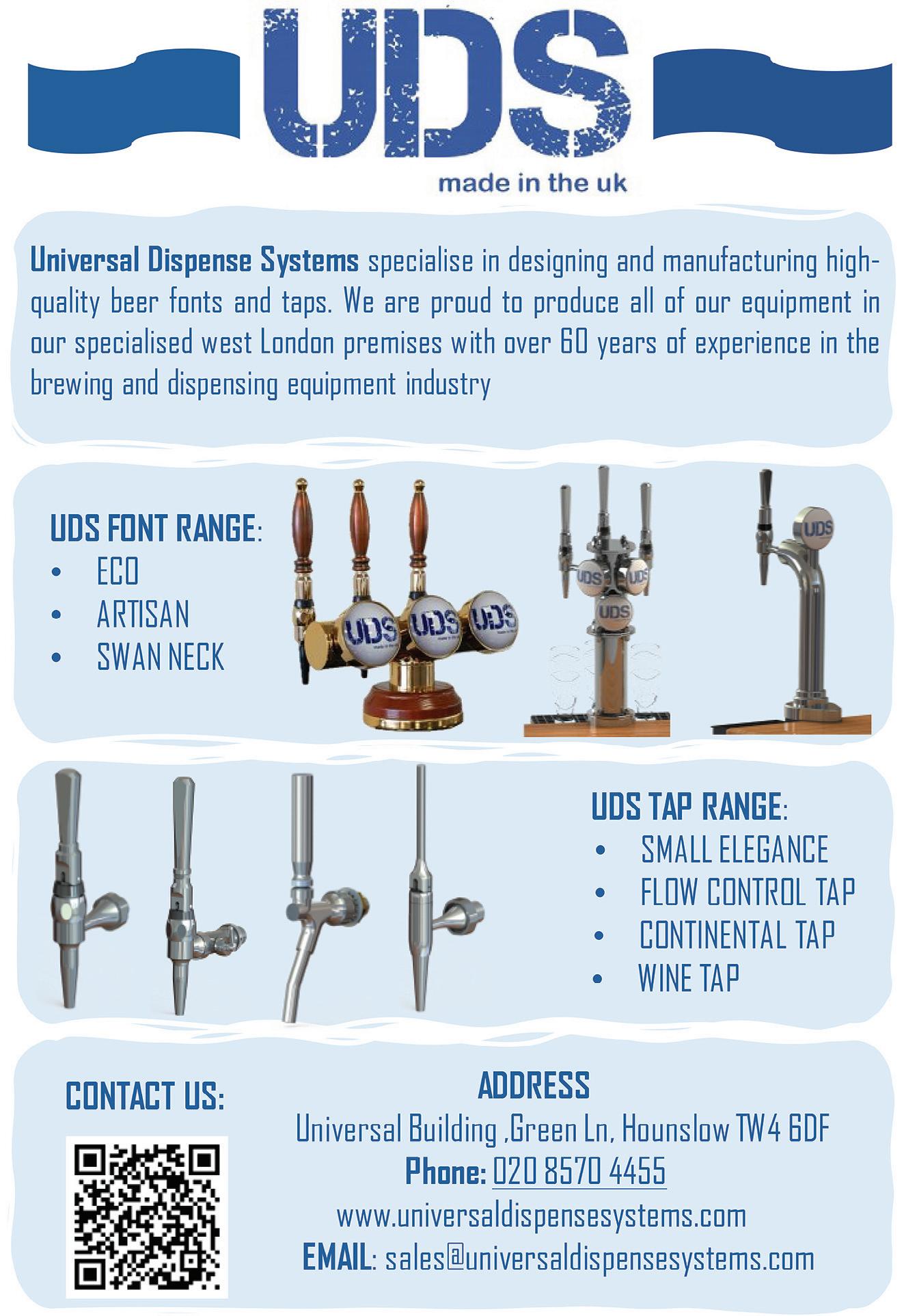
By Wetherspoon Chairman Tim Martin

The entire hospitality industry is united in its view that pubs, clubs and restaurants pay wildly excessive taxes, especially VAT and business rates, in comparison with supermarkets.
This tax disparity is harming businesses and high streets, but also the social fabric of the nation –where, other than pubs, can you temporarily escape the attentions of your own family?
Supermarkets pay zero VAT in respect of food sales, whereas pubs and restaurants pay 20%, enabling supermarkets, in effect, to subsidise the selling price of beer, wine and spirits.
A consequent anomaly is that food for posh dinner parties in Notting Hill or the Cotswolds is VATfree, whereas fish and chips at your local pub attracts the full 20%. Just ask Jeremy Clarkson.
As a result of these perverse tax incentives, as investment bank Morgan Stanley recently reported, pubs have lost approximately 50% of their beer trade to supermarkets since the millennium, having lost a substantial amount even before then.
Unfortunately, VAT is not the only hospitality disadvantage. Pubs also pay about 20 times more business rates per pint than supermarkets. Something underhand is afoot.
Here’s how this faulty system works. The explanation is just about complicated enough, so that few people in the government, and maybe even in the Treasury, really understand the details - and therefore the enormous hospitality disadvantage.
The Rateable Value of any business is set by the Valuation Office Agency (VOA), and is equal to the yearly rent the property could have been let for on the open market. For a pub, this is something called the ‘market rent’, which is typically around 10-12% of a pub’s annual turnover.
The Rateable Value is then multiplied by the “National Non-Domestic Rate Multiplier”- the NDRM. For 2025/26 the multiplier is 0.555.
Therefore, a typical pub pays business rates calculated as 0.555 x 10% = 5.6% of its annual turnover. So a pub with sales of £600,000 per annum (less than half the Wetherspoon average) will pay business rates of £33,600 - 5.6% of £600,000 equals £33,600.
Put another way, for every £1 of sales, a pub will pay business rates of 5.6p. That’s 28p on every £5 pint of beer - approximately the average price of a pint these days.
Let’s now compare this with the business rates supermarkets pay. Back in December 2020, Reuters reported that Asda would “pay business rates of £340m… to the UK government… waiving tax relief.”
Asda’s sales were about £23bn in that year, so the business rates payable were just under 1.5% of sales, meaning a £5 pint cost them only 8p.
Unfortunately, the tax disparity per pint between pubs and supermarkets is much worse than that. With their much lower overheads, the average pint of beer bought from a supermarket will be far,
far less than £5 - maybe as little as £1 a pint, meaning a business rate ‘levy’ of only 1.5p.
So, 1.5p in a supermarket versus 28p in a pub… which is nearly 20 TIMES more. Trade organisation UK Hospitality, acting on behalf of the industry, has made a strong case for reducing hospitality taxes, in its heroic campaign to reduce the business rate multiplier.
Unfortunately, this sensible and easy-to-understand approach risks being undermined by a recent, well-meaning suggestion from Greene King, which argues that business rates should be based on profits, rather than sales.

However, this would surely create a nightmare of complexity. Agreeing with government valuation officers a Rateable Value based on the market rent on average, or “hypothetical”, sales is complex enough - but substituting profits for sales involves far more complex calculations, and it’s hard to see how this could benefit publicans, or indeed the government.
Government valuation officers, and those who negotiate with them on behalf of pubs, have built up a substantial body of knowledge, based on local pub sales comparisons.
Reverting to a profits-based analysis would require a huge educational programme, in effect creating a massive increase in demand for tax advisors, which is surely every citizen’s nightmare.
As things stand today, the valuation officers’ primary task, in concert with their pub counterparts, is to estimate the annual sales of a pub on which the market rent is based - that is to say, one number only.
However, a system based on profits is infinitely more complex - the Wetherspoon profit and loss account, for example, has 170 different lines, mostly representing costs, which differ from pub to pub.
In reality, it would be all-but-impossible to agree these costs for every pub in the land. We are sure that Greene King’s heart is in the right place, especially since they brew the sainted
Abbot Ale, but feel they’ve wandered off course, perhaps after a heavy session, by recommending a profitsbased analysis.
Finally, when Jacques Borel campaigned, a few years ago, in the UK for a fairer VAT rate for pubs, clubs and restaurants, which he had successfully obtained in many other European countries, the industry was disunited.
Ted Tuppen of Enterprise Inns and Rooney Anand of Greene King, for example, refused to support Jacques’ campaign. A disunited industry ended up paying far higher VAT than almost any other European country - as the table from The Scottish Hospitality Group, below, illustrates.
The lesson is: Keep It Simple, Stupid. It’s a basic principle that taxes should be fair and equitable. All we’re asking for is equality with supermarkets, which are doing an excellent job for their customers - the same rate of VAT and the same business rates per pint.
That way, of course, the government will collect more taxes in the end, as there will be a more successful hospitality industry, more employment, more vibrant town centres and less vacant shops and pubs. Tax equality equates to sensible economic policies - and we are sure that the entire nation will drink to that.
It’s down to the final straight in the search for the 2025 KP of the Year as Winterhalter, the company behind the awards, has unveiled this year’s shortlist.
The winner will be announced in the next few weeks, and will be chosen from a top ten selected by this year’s judging panel.
The shortlist includes KPs from across the foodservice industry. Stephen Kinkead is managing director of Winterhalter UK and is one of the judges. He said, “The calibre of the entrants this year has been superb and spread over an eclectic mix of establishments, from nursing homes to football stadia, each with so many amazing kitchen porters. The judging was, at times, intense, and this was the hardest year I have experienced to get to the top ten. It underlines how this competition grows from strength to strength.”
THE SHORTLIST IS:
• Hans Tegner of Millstream Hotel – nominated by Annie Brierley
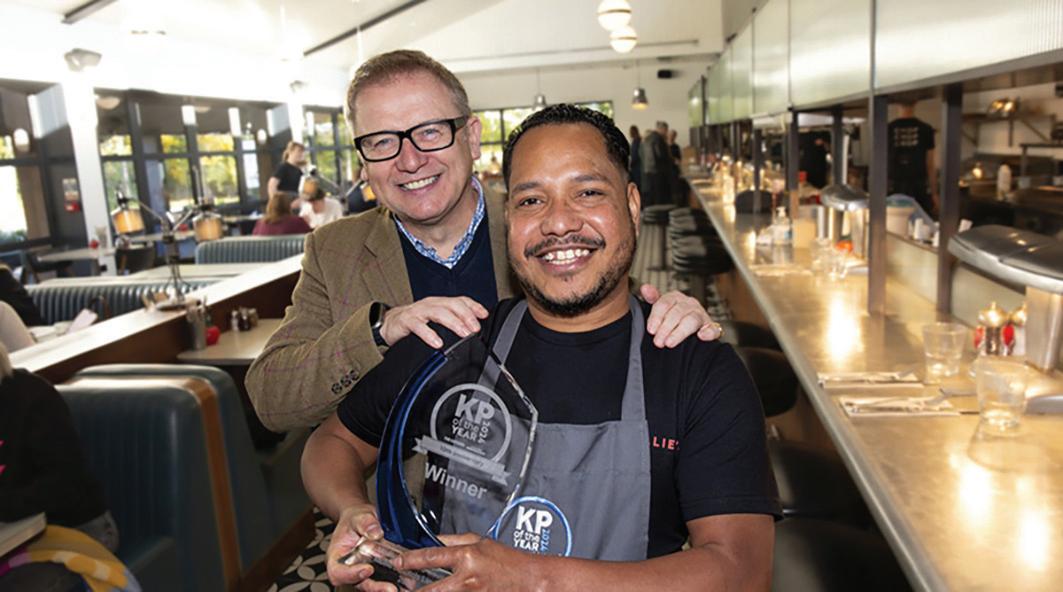
• Haroon Ahmad Babai of The Landmark London Hotel – nominated by Anna Jasiewicz
• Hayley Gibbens of TNS Catering – nominated by Nicole Bunting
• Jose Farinha of The Honourable Society of Lincoln’s Inn – nominated by David Bush
• Motahar Hossin of A.Wong – nominated by Andrew Wong
• Ram Meadows of Liverpool FC – nominated by Christine Fawcett
• Said Ali Ibrahim of JW Marriott Grosvenor House London – nominated by Stuart Bowery
AVLA and Britannia Hotels confirm that they have reached an extrajudicial settlement of copyright infringement proceedings raised by AVLA in the Court of Session, Edinburgh under s.20 of the Copyright Designs and Patents Act 1988. The terms of settlement include the agreement by Britannia Hotels to enter the AVLA Licence for all of the hotels they operate in the UK.
Audiovisual Licensing Alliance (AVLA) Limited is a UK not-for-profit licensing body established by the community of audiovisual creatives, including producers, authors, performers, directors, and visual artists. Recognised and monitored by the UK government, AVLA manages a vast repertoire that spans films, series, documentaries, cartoons, and other shows regularly broadcast on the major national television channels and beyond.
– nominated by Andrew Turner
• Venetia Wisher of The Genuine Dining Co – nominated by Jade Walker
• Yared Hailesilassie of Sam’s Riverside (Genuine Restaurants Limited) – nominated by Fanny Stocker
One of the judges was Kerth Gumbs, head chef, Fenchurch at the Sky Garden: “I’m amazed to see the sheer number of entrants this year — It was extremely difficult to get to the shortlist,” he said. “It’s so important to recognise our unsung heroes.
Congratulations to all the finalists, and best wishes to the future winners — we truly appreciate everything you do.”
Also on the panel was Lisa Jenkins, chief executive, RACA, who said, “Our final top ten demonstrates an incredible group of experienced and skilled kitchen porters.” Meanwhile Steve Groves, head chef, Glyndebourne (Compass), described judging this year’s KP of the Year as “genuinely inspiring.” He added, “The standard was incredibly high, and it was a reminder of how much heart, pride and quiet leadership exists in kitchens up and down the country.” Dipna Anand, chef-owner, Brilliant Gastro and Kate Brooke-Green, head of food, Mollie’s Motels, completed the judging panel.
The 2025 KP of the Year will be awarded the coveted trophy, £1,000 in vouchers and a celebratory meal for family and friends in a casual dining restaurant of their choice. Furthermore, their employer will get a Winterhalter dishwasher worth up to £10,000. Two highly commended KPs each receive a trophy and gift vouchers, and every KP nominated will receive a bespoke KP of the Year Oliver Hardy apron.
More information about the competition can be found at www.kpoftheyear.com
Hotels, aparthotels, serviced apartments, B&Bs, and similar establishments are legally required to obtain an AVLA licence if they provide guests with access to TV channels featuring audiovisual content from AVLA’s repertoire. This requirement applies both to televisions in bedrooms and in communal areas, such as restaurants or bars. Operating without the licence constitutes a legal infringement of the rights of the creators AVLA represents.
Max Rumney, Co-Chairs of AVLA, stated: “Respecting copyright laws is crucial not only to avoid legal or reputational risks, but also to support creators. As a not-for-profit organisation, AVLA distributes the vast majority of licence fees directly to the rightsholders we represent. In an industry that normally operates on a projectdriven basis, this contribution is key to ensure that the talent required for ground-breaking British content remains and continues to be significant contributors to the UK economy.
Hotels that prioritise compliance demonstrate their commitment to ethical business practices and respect for intellectual property rights. We encourage businesses that have yet to obtain an AVLA licence to contact our team and regularise their position to avoid legal risks and higher costs.”
The government has published detailed guidance setting out which properties will qualify for the new Retail, Hospitality and Leisure (RHL) lower business rates multipliers — a major reform due to take effect from 1 April 2026 to coincide with the 2026 Revaluation.
Under the new system, announced at the Autumn Budget 2024, two lower business rates multipliers will apply to RHL properties in England with rateable values (RVs) below £500,000:
• A Small Business RHL Multiplier for properties under £51,000 RV
• A Standard RHL Multiplier for properties between £51,000 and £499,999 RV
The move marks the first time that shops, restaurants, pubs, cafés, hotels, and other qualifying venues will receive a permanent, structural reduction in their business rates bills — replacing the short-term discretionary reliefs that have been renewed, albeit at different levels of discount, annually since 2020.

There will be no cash cap under the new regime, meaning all qualifying premises within a retail, hospitality, or leisure chain will benefit, not limited to a cash cap under the previous system which largely excluded chains. The government has also confirmed that eligibility will be determined strictly in accordance with new statutory definitions rather than local authority discretion.
The Non-Domestic Rating (Definition of Qualifying Retail, Hospitality or Leisure Hereditament) Regulations 2025 (SI 2025/1093) now laid before Parliament set out the qualifying criteria, broadly mirroring the current 40% RHL relief scheme in scope but applying it on a statutory rather than discretionary basis.
The new multipliers will apply only to occupied hereditaments and will be restricted to those “wholly or mainly” used for in-person retail, hospitality, or leisure activity provided to “visiting members of the public.”
AMONG THE PROPERTY TYPES TO QUALIFY ARE:
• Retail – shops, supermarkets, florists, newsagents, opticians, markets, petrol stations/garages, jewelers,
chemists, garden centres, tattooists, beauty salons and
• Hospitality – cafés, takeaways, restaurants, pubs, nightclubs, bars, hotels and guest houses,
• Leisure – cinemas, theatres, galleries, museums, gyms, health spas, sports clubs, bowling alleys, soft play centres and theme parks
• Excluded uses include financial, medical, and professional services, taxi/minicab firms and certain specialist uses such as betting shops, conference centres, and transport hubs.
Rates for the two new RHL multipliers will be confirmed at the Autumn Budget 2025 on 26 November, once the 2026 Revaluation and wider fiscal context are known.
Commenting on the announcement Alex Probyn, Practice Leader, Europe & Asia-Pacific Property Tax, at global tax firm Ryan said: “With the cash cap of £110,000 in relief removed this is a major boost for multi-site operators.
But many will now be anxiously waiting to see whether their larger stores and venues over £500,000 in rateable value, which are excluded from the lower tax rates, will attract the new supplement to standard rates. Across the retail, hospitality and leisure sectors, up to 4,353 premises could be caught by the supplement — facing an estimated £482 million a year extra in business rates.
Whilst gains from lower bills from the new lower RHL multipliers also risk being clawed back in part through higher bills on warehouses, distribution centres and corporate HQs — many of which are expected to face not only the supplement but sharp increases under the revaluation, creating a potential double hit. For single-site and independent operators, the reduction in the multiplier will be broadly in line with existing discounts — offering stability rather than a step-change, but still far below the 75% relief in the previous financial year.”
From April 2026, a new surtax of up to 10p in the pound will apply to properties with an RV above £500,000 as part of the new five-tier multiplier system. These policies apply to England only, as business rates are a devolved tax.

By Julie Gowland, Partner and Head of Licensing at Birketts LLP
(https://www.birketts.co.uk/people/julie-gowland/)

The recent controversy surrounding the Manor Farm pub in Birmingham, where a group of individuals draped in England flags were refused entry, has sparked national debate. But beyond the headlines and social media outrage lies a deeper issue that those within the alcohol licensing industry must consider: the legal and ethical responsibilities of operators under the Licensing Act 2003.
According to reports, the group refused entry had been part of a 200-strong protest against asylum seekers housed at a nearby hotel. Many were intoxicated and confrontational, prompting the pub’s management to deny entry in the interest of safety and public order.
While some critics framed the refusal as unpatriotic or discriminatory, the decision aligns with the core licensing objectives enshrined in the Licensing Act 2003:
1. Prevention of crime and disorder
2. Public safety
3. Prevention of public nuisance
4. Protection of children from harm
These objectives are the foundation of every licensing decision and operational policy.
THE
Operators of licensed premises are legally bound to uphold these objectives. This includes refusing entry to individuals who are intoxicated, aggressive, or likely to disrupt the peace. Section 141 of the Licensing Act makes it an offence to knowingly sell alcohol to a person who is drunk.
Moreover, the Designated Premises Supervisor (DPS), a mandatory role for any premises selling alcohol, must ensure that alcohol is sold responsibly and that staff are trained to identify and manage risks associated with intoxication and disorder.
Greene King, the pub’s parent company, stated that the refused entry was not politically motivated but rather based on concerns over safety and association with protest activity. The manager asked patrons to leave flags at the door to avoid escalating tensions, a decision that aligns with the operator’s duty to prevent disorder and protect staff.
In addition to statutory duties, operators also have a common law right to refuse entry to individuals provided that the refusal is not discriminatory based on the protected characteristics under the Equality Act 2010. Licensed premises are private property, not public spaces, and there is no automatic right of entry for members of the public. This discretion is crucial in managing risk and maintaining order.
In this case, the Manor Farm team acted within their rights and responsibilities. Their refusal was not about the flag itself, but the behaviour and context surrounding its display.
The Licensing Act does not provide a precise definition of “drunk”, nor does it prescribe a one-size-fits-all approach to managing public order. Operators must use discretion, informed by training and experience, to assess risk. This includes evaluating whether a group’s presence could escalate tensions or compromise the safety of other patrons.
The statutory guidance under Section 182 of the Act reinforces this, stating that licence conditions must be tailored to the individual premises and that operators cannot be held responsible for customer behaviour once they leave the premises.
The statutory guidance under Section 182 of the Licensing Act 2003 emphasises that licensing decisions must be proportionate and tailored to the premises. Operators are encouraged to document incidents and decisions to demonstrate compliance with licensing objectives and avoid liability in appeals or judicial reviews.
THE MANOR FARM INCIDENT HIGHLIGHTS THE NEED FOR CLARITY FOR OPERATORS NAVIGATING COMPLEX SOCIAL DYNAMICS, IN PARTICULAR:
1. Clearer guidance on managing politically charged situations
2. Enhanced training on identifying and responding to public order risks
3. Legal protections for staff facing abuse while enforcing licensing conditions
4. Operators are not arbiters of patriotism – they are custodians of public safety. Their decisions must be respected when made in good faith and in line with the law.
PRACTICAL TIPS FOR OPERATORS:
• Train staff to recognise signs of intoxication and disorder.
• Keep incident logs to justify refusals including time, behaviour observed, staff actions and retain any CCTV footage.
• Apply dress codes and search policies consistently.
• Avoid refusals based on political symbols unless linked to behaviour.
• Consult your premises licence for specific conditions.
STANDING FIRM ON LICENSING PRINCIPLES
Political tensions increasingly spill into public spaces and operators must be equipped not only with legal knowledge but also with the confidence to act decisively and fairly. Industry bodies and licensing authorities are increasingly working together to provide clearer frameworks for managing such incidents, ensuring that frontline staff are supported in upholding the law.

Bristol hoteliers are hoping the Autumn budget won’t put a dampener on what is shaping up to be a promising end to 2025.
Chancellor Rachel Reeves will stand at the Dispatch Box on 26 November when the hospitality sector will again be hoping for an early Christmas present to boost their businesses.
Trade body UKHospitality is once again calling for lower business rates, a reduction on VAT for hospitality businesses and changes to National Insurance Contributions for employers.
Adam Flint, Chair of Bristol Hoteliers Association (BHA), said: “The final quarter of 2025 for the hotels and city is very buoyant compared to other quarters this year, which is very encouraging.
“We have enjoyed a wonderful end-of-summer boost, thanks to Bristol hosting two quarter finals and both semi-finals of the Women’s Rugby World Cup, and only this week, it was announced that work is finally set to begin on the long-awaited YTL Arena in Filton,
so there is plenty of cause for optimism.
“We are hoping that this will not be undone by any measures Rachel Reeves announces in next month’s budget, because while the fourth quarter of this year does look very promising, many hospitality businesses are still struggling at present in the face of many challenges.
“Food and beverage costs are still rising – particularly over the past few months – as are energy bills, and many businesses are still coming to terms with the changes that came into force in April this year around National Insurance Contributions and living wage increases.”
He said the continuing cost-of-living crisis is having an impact on consumers, too, as household budgets continue to be stretched, which means ‘leisure travel’ is often one of the first things to be cut when belts are being tightened.
“With all that in mind, we are keeping everything crossed that the Chancellor will be kind to us this autumn and recognise the huge contribution we make to the nation’s economy.”
Daily Drinks Tracker shows.
Average drinks sales in managed venues in the week to Saturday 13 September were 1.4% behind the same period in 2024. The gap widened to 3.0% in the following seven days to 20 September. Daily comparisons were ahead on four days of the fortnight, but behind on ten.
The Tracker’s figures represent a slight softening of trading for pubs, bars and suppliers after a solid end to summer. Sales had been ahead year-on-year for five weeks out of six between late July and early September.
Continuing a pattern set throughout the summer, Long Alcoholic Drinks (LAD) categories proved most attractive to consumers over the fortnight. Beer sales were 1.0% ahead in the week to 13 September, though down by

over the following seven days. Cider sales rose
and fell 4.8% in the two weeks. Soft drinks (up 1.0% and down 1.8%) were virtually level across the fortnight.
However, spirits and wine sales faced more pressure on spending. Spirits sales were down by 7.1% and 6.2% in the weeks to 13 and 20 September respectively, while wine’s drops were even steeper at 8.5% and 7.6%.
Rachel Weller, CGA by NIQ’s commercial lead, UK & Ireland, said: “The key On Premise sales patterns that we saw over summer—of generally flat sales but resilience for LAD brands—look like they are extending into the autumn season. Growth is largely being driven by higher prices rather than increased volumes, and many consumers are clearly still keeping a very close eye on value when they drink out. The cooler months will hopefully bring better fortunes for the spirits and wine categories, but pubs, bars and suppliers will have to work hard for any year-on-year gains.”
The BII has revealed the results of its summer survey of members, with a shocking 35% saying if the Government doesn’t reduce the tax burden on the sector at the Autumn Budget, they could be forced to close their businesses.
Despite a strong summer of trading for many, with 60% seeing turnovers equal to or greater than the same period in 2024, with huge tax rises from last year’s budget hitting hard since April, pubs have been forced to take drastic measures to make ends meet.
With Covid related debts still being repaid, the energy crisis creating bills up to three times as much as they were in 2021, and high food and drink inflation of over 20% in recent years, the sector was already under huge pressure.
From April, National Insurance contributions (NICs) have risen by 10% from 13.8% to 15%, and the NIC secondary threshold dropped from £9,100 to £5,000, meaning virtually all part-time staff are in scope for businesses to contribute NI, and the final blow of minimum wage rising to £12.21 (an increase of 50% over the last five years) has seen costs of employment soar.

A previous survey alongside fellow trade associations, UKHospitality, BBPA and Hospitality Ulster, showed hospitality businesses shrinking their workforces and capacity to 85%, just to meet the increased tax demands. With 89,000 job losses in the sector since last Autumn, the budget now set for 26th November 2025 will be critical on deciding the future for pubs across the UK.
Conversely, the survey also revealed that with a significant reduction in the tax burden, over 70% said it would trigger investment in their pub business, with nearly 50% of pubs saying that they would grow their teams.
Steve Alton, BII CEO said: “Our members and the wider pub sector are being pushed to breaking point by unfair and unsustainable tax burdens. We have shown time and time again that we have the potential to be a powerhouse of economic growth, given the right support, but Government have forced us into a corner with over £1 in every £3 we take over the bar going straight to Treasury, alongside a raft of overheads that are
completely out of our control.
“When the energy crisis hit, our pubs invested in energy saving equipment and sustainable practices. When Covid hit, we were the community hubs, fundraising and caring for the vulnerable. When food and drink inflation became relentlessly high, we reengineered our menus and protected our customers from the full effects of the prices we should have passed on.
“Now the full effect of the doubling of Business Rates, with the reduction of relief from 75% to 40%, alongside the immense rise in the cost of employment, have left pubs with little choice. They have had to cut jobs, opening hours, and many are working 70 hours a week, just to serve their communities and collect tax for the Treasury.
“If the Chancellor doesn’t recognise the devastating impact last Autumn’s budget has already had on our sector, not even six months since it came into force, and remove some of the pressure on our pubs, the consequences will be dire.
“Last week, I joined a passionate and eloquent group of operators, sharing their experiences at a roundtable meeting with the Business Minister, which left him in no doubt of the impact they make on their communities, as well as the eyewatering amount of tax they have to pay.
“Referencing the brilliant operators he met, his words in the hospitality debate in parliament last Wednesday that ‘hospitality is truly the backbone of our high streets, and the lifeblood of our communities’ are yet another reinforcement of the vital nature of our sector, economically, socially and culturally.
“But these words must be met with immediate action, to protect thousands of jobs, and every community in the UK. Our members have been clear on their priorities for support from Government. A cut in VAT on all pub sales, in line with other European countries, a full reform of the business rates system that leads to permanently lower rates bills than they currently pay, and a reversal of the NICs increases.
“Without a reduction in the tax burden, we will lose a huge number of viable businesses and jobs, providing immeasurable support and connection in every community.
Brakspear recently held its 13th annual Hospitality Awards, bringing together publicans and industry professionals on the banks of the Thames in Henley-on-Thames to recognise outstanding achievement across the brewery’s pub estate.
The awards ceremony celebrated pubs and operators who have demonstrated exceptional performance over the past year, with winners selected through a comprehensive judging process that included business development metrics, customer feedback, mystery visits, TripAdvisor reviews, and assessments by independent industry judges.
Five categories recognised different aspects of pub excellence, with awards going to operators who have shown creativity, community engagement, and business acumen alongside exceptional food and drink offerings.
2024 WINNERS
• Green Fingers Award: The Blackwood Arms, Burnham

• Best Cellar Award: The Dog & Duck, Wokingham
• Best Sunday Roast Award: The Lamb Inn, Great Rissington
• Best Newcomer Award: The Dew Drop Inn, Hurley
• Heart of the Community Award: The Star & Eagle, Goudhurst
The judging process recognised not only commercial success but also the real difference these establishments make within their local communities, highlighting operators who have gone above and beyond in their service delivery and community engagement.
Brakspear extended congratulations to all winners and finalists, acknowledging the dedication of publicans across their estate who maintain high standards of operation throughout the year.
The awards were supported by key industry sponsors including Carlsberg Britvic, Heineken, Diageo, Berkmann Wines, and Beavertown, whose partnership enabled the celebration of excellence across the pub sector.
Rapid rises in operational costs are damaging hospitality’s capital expenditure programmes, the latest Business Confidence Survey from CGA by NIQ and Sona reveals.
The survey of industry leaders shows that nearly two thirds (63%) have increased their operational expenditure over the last 12 months, following inflationary pressures on the costs of labour, food and drink and other key inputs. However, only a third (34%) have increased their capital expenditure. Close to half (45%) have been forced to cut their capex—more than double the 20% who have reduced their operational expenditure.
The Survey highlights a growing split in hospitality, with 25% of hospitality leaders currently able to increase both their operational and capital expenditure, but 14% forced to reduce both. This indicates the current fragility of the sector, with 9% of leaders reporting that they now have no cash reserves to draw on, while 53% have fewer than six months of reserves.

Soaring costs have been particularly damaging for smaller operators, the Business Confidence Survey shows. Just 22% of independents have increased their capital expenditure year-on-year, while 60% have been forced to cut it—15 percentage points more than the sector average.
Intense cost pressures are forcing businesses to make difficult decisions on investment, but leaders recognise the value of capex in sustaining sales and keeping pace with competitors. Two thirds (65%) of leaders say site refurbishments are a high or medium priority for investment, while 55% say the same about workforce management technology. Half (50%) identify both customer-facing technology and site acquisitions as high or medium priorities.
Despite low optimism at the moment, the Business Confidence Survey provides some cause for cautious
confidence about the outlook. While three in five (61%) leaders say the economic environment is currently a barrier to their capital expenditure, only 27% cite consumer sentiment—an indication that Britain’s underlying demand for hospitality remains strong.
Karl Chessell, director – hospitality operators and food, EMEA at CGA by NIQ, said: “April’s increases in pay levels and National Insurance contributions have added yet more weight to the heavy cost burdens on hospitality businesses. They have further polarised the sector, between successful and efficient businesses that are able to invest across the board, and weaker ones that are struggling to keep up with day-to-day costs and are scaling back capital projects. All leaders are acutely aware of the importance of capex, especially in areas like technology, which can unlock efficiencies and extra revenue. Investment here feels a big stretch for some operators at the moment—especially smaller ones—but it’s going to be essential if businesses are to stay competitive and meet guests’ evolving needs.”
Paul Watson, VP of hospitality at Sona, said: “As operational costs continue to climb, hospitality businesses are rightly reassessing how they allocate resources, but the findings from this survey underscore the critical need to invest in the right solutions for your business. Intelligent, AI-driven solutions can deliver immediate efficiencies in scheduling, labour optimisation and compliance, helping operators reduce overheads without compromising service quality.
“A recent adopter of Sona saw an improvement in labour by 0.5%, within a couple of weeks from putting the product in the hands of the operators. They also realised further improvements as the solution bedded in, and these learned improvements are where the power of our AI-native workforce management solution is unlocked. For smaller and independent businesses especially, targeted tech investment isn’t just a cost, it’s a strategic lever to unlock resilience, agility and long-term competitiveness in a volatile market.”

As CLH NEWS reaches its 25th anniversary, we reflect on an incredible journey that has seen the UK hospitality and licensed on-trade sector transform in ways few could have predicted when we first went to press in 2000.
It has been a remarkable quarter century full of highs and lows, from boom times to unprecedented crises, and through it all, we have been privileged to document, serve, and support this vibrant industry that sits at the very heart of British social life.
When CLH NEWS launched in 2000, the sector was riding a wave of optimism. The UK pub industry was thriving, with traditional “boozers” standing alongside a new generation of style bars and gastro-pubs that were redefining what hospitality meant. The tie between breweries and pubs was still the dominant model, and smoking in pubs was simply part of the atmosphere.
The early 2000s saw the rise of premium brands, craft beers beginning their journey from niche to mainstream, and an explosion in the variety of spirits available behind the bar. The traditional pub was evolving, and we were there to chronicle every step.
Perhaps no single change has been more debated than the smoking ban, introduced in England in 2007. The licensed trade faced this seismic shift with a mixture of trepidation and innovation, with many venues investing heavily in outdoor spaces and heated areas. While some predicted doom, the sector adapted with characteristic resilience.
The Licensing Act 2003, which came into force in 2005, brought the most significant overhaul of licensing laws in decades. Extended opening hours and the consolidation of licensing authorities transformed how venues operated, offering both new opportunities and fresh complexities.
The introduction of mandatory licensing for door supervisors, the designated premises supervisor role, and evolving health and safety regulations have all required constant adaptation from operators navigating an increasingly complex regulatory landscape.

The 2008 financial crisis hit the sector hard, (and us too) with consumer spending plummeting and business failures mounting. Many beloved establishments closed their doors for the final time, and the term "pub closures" became a regular feature in industry headlines. Our offices were above a pub, a great pub “the Jug of Ale” in fact, where over the years we got to know so many people some of whom we are still in touch with. Sadly closed, reinvented and closed for many years now.
However, and thankfully, the resilience shown by operators during this period laid the groundwork for the fighting spirit that would prove essential in years to come.
Rising business rates, beer duty escalations, and the introduction of the National Living Wage in 2016 have consistently squeezed margins, forcing operators to become ever more innovative and efficient. The challenge of maintaining profitability while delivering value has been a constant theme throughout our 25 years.
The transformation brought by technology has been nothing short of revolutionary.

In 2000, online bookings were rare and social media didn't exist. Today, venues live and die by their online reputation, with review platforms like TripAdvisor wielding enormous influence.
The rise of food delivery apps has created both opportunities and challenges, allowing pubs and restaurants to reach new customers while competing with aggregators that take significant commissions. Digital payment systems, electronic point-of-sale systems, and online ordering have fundamentally changed how hospitality businesses operate.
Social media marketing has become essential, with Instagram-worthy interiors and dishes now factored into venue design. The pandemic accelerated this digital transformation exponentially, with QR code menus and app-based ordering becoming mainstream almost overnight.
THE CRAFT REVOLUTION AND PREMIUMISATION
The past 25 years have witnessed an extraordinary renaissance in British brewing and distilling. The craft beer movement, which began as a trickle in the early 2000s, became a flood that transformed the drinks landscape. Microbreweries proliferated, and consumer tastes shifted toward quality, provenance, and authenticity.
The gin boom of the 2010s saw Britain reclaim its crown as a spirits innovator, with hundreds of artisan distilleries opening across the country. Premium spirits, specialist cocktails, and low-and-no alcohol options have all carved out significant market share, responding to increasingly sophisticated and health-conscious consumers.
The food side of the equation evolved just as dramatically, with the gastro-pub movement elevating pub dining to new heights. Locally sourced ingredients, seasonal menus, and culinary innovation became hallmarks of successful venues.
Nothing in our 25-year history compares to the impact of COVID-19.
The pandemic brought the sector to its knees with lockdowns, capacity restrictions, and social distancing requirements that made normal operation impossible. Venues closed for months, staff were furloughed, and the very future of hospitality hung in the balance.
Yet from this darkness came remarkable innovation. Pubs became impromptu off-licenses, restaurants pivoted to takeaway and delivery, and the entire sector demonstrated extraordinary creativity and determination. The support shown by local communities for their cherished venues was genuinely moving and highlighted the irreplaceable role hospitality plays in British life.
The recovery has been challenging, with staffing shortages, supply chain disruptions, and changing consumer behaviours all complicating the return to profitability. Many businesses sadly never reopened, and those that survived emerged into a very different landscape.
PERENNIAL CHALLENGE
Recruitment and retention have been persistent challenges throughout our 25 years, but the issue has become critical in recent years.
Brexit brought perhaps the most significant structural challenge facing modern UK hospitality. The departure of EU workers, who had traditionally filled vital roles across kitchens, bars, and front-of-house teams, cre-
ated acute staffing shortages that persist today
The sector has responded by focusing on training, career development, and improved working conditions, working to transform hospitality from a stop-gap job into a genuine career choice. Yet the challenge remains acute, with many venues unable to operate at full capacity due to staff shortages.
Environmental concerns have moved from the periphery to the centre of hospitality operations. Plastic straws, single-use containers, food waste, and energy consumption are now front-and-centre considerations for responsible operators. The sector has embraced sustainability not just as a moral imperative but as a business opportunity, with consumers increasingly choosing venues that align with their values.
Mental health awareness, inclusive hiring practices, and community engagement have also become essential components of progressive hospitality businesses, reflecting broader social changes.
CHANGING CONSUMER PREFERENCES: THE GENERATION Z EFFECT
Another profound shift has been in consumer attitudes and behaviours, particularly among Generation Z. This demographic has embraced healthier lifestyles with enthusiasm, fundamentally altering demand patterns across the sector. The low and no-alcohol movement has grown from fringe trend to major market force, with alcohol-free beers, spirits, and cocktails now commanding prime bar real estate. Plant-based and vegan options have moved from afterthought to headline act, with dedicated vegan restaurants flourishing and traditional venues expanding their meat-free offerings.
Wellness-focused consumers increasingly scrutinize ingredients, seek nutritional information, and make choices aligned with personal health goals and ethical values. This generational shift has challenged operators to rethink their offerings while presenting exciting opportunities for innovation.
Modern consumers are now increasingly prioritizing experiences over mere transactions. Pop-up restaurants and immersive dining experiences have captured imaginations, while competitive socializing venues combining food, drink, and entertainment have redefined nights out.
The boundaries between dining, drinking, and entertainment have blurred, creating hybrid concepts that appeal to experience-hungry customers.

As CLH NEWS celebrates 25 years, the sector faces a new constellation of challenges: persistent inflation, energy costs that remain elevated, ongoing staffing shortages, and the need to balance profitability with the expectations of more demanding consumers.
Yet if our quarter century has taught us anything, it is that UK hospitality is defined by its resilience, creativity, and unwavering commitment to bringing people together.
From the traditional corner pub to the cutting-edge cocktail bar, from the family-run restaurant to the multi-site operator, this sector remains the beating heart of British social life.
We are immensely proud to have served this remarkable industry for 25 years. Here's to the innovators, the grafters, the dreamers, and the hospitality professionals who make it all happen.
And we hope-Here's to the next 25 years of stories yet to be written. Thank you for letting us be part of your journey.

Companies across the country looking to recruit the right people for their businesses are increasingly harnessing the benefits of the no-fee recruitment service provided by Jobcentre Plus.
With more businesses finding it hard to fill their vacancies with suitable candidates, the Jobcentre Plus professional recruitment service aims to back your business, while providing opportunities for jobseekers in the local community.
This comprehensive support includes providing expert advice on recruitment best practice, help with advertising your jobs locally, finding the right candidates for your business, shortlisting CVs, and even giving you the space to interview at a local jobcentre. They can also assist with setting up work trials, work experience and apprenticeships and provide guidance on employing people with disabilities or health conditions.
Dalmeny Resort Hotel in Lytham is one of many businesses already using the service.
Chris, owner of the Dalmeny Resort reports “The benefits that we have experienced are the ability to identify key personnel accurately. There is a personal vetting process, and candidates are matched to positions far more efficiently than on any other platform I have ever used.”
He also highlights how easy it has been to develop a productive relationship with Julie, their local JCP Employer Adviser. “We have a great relationship. I was a little bit sceptical at the beginning, but the candidates she sent changed my perception of Jobcentre Plus as a whole.”
Julie says it is all about knowing what the employer needs: “I find the right people and the relationship with the employer continues to go from strength to strength.”


Thanks to the service, the hotel has recruited local candidates for a wide variety of roles. “The obvious benefits of working with the jobcentre are the ability to react quickly to recruitment requirements” says Chris. “My advice to any local business would be to use it! It’s a free service. The personal touch is 100%. And for me it is more about human relationships than looking at CVs. It’s a lot more human.”
Whether you have 1 vacancy or 100, our Jobcentre Plus Employer Advisers can help to take the hassle out of recruitment, leaving you to get on with business.
To find out what we can offer you, visit business.gov.uk/recruit and fill out our simple enquiry form.
A local Employer Adviser will then call you back to discuss your recruitment needs and how we can support you.
You can also find out about our full range of services at gov.uk/jobcentre-plus-help-for-recruiters/ recruitment-advice-and-support
Eligibility Criteria Apply
By Hannah Strawbridge, CEO, Founder, and Employment Law Solicitor at Han Law

Recruitment and retention remain chronic issues in hospitality and unlicensed trade sectors. With staff shortages, many operators are understandably keen to fill shifts quickly. But taking on someone who does not have the legal right to work in the UK carries serious risks. From February 2024, civil penalties for employers have been sharply increased, and ignorance or sloppy checks are no defence. Here’s what you need to know — what the law requires, what can go wrong, what penalties you face, and how to avoid them.
Under the Immigration, Asylum and Nationality Act 2006 (as amended), any employer in the UK must ensure that anyone they employ has the legal right to work here. That includes:
- UK citizens;
- nationals from certain recognised countries;
- people with valid visas, residence, or immigration status that permits work;
- and some other categories, depending on immigration rules.
The employer must conduct right-to-work checks before employment
begins. Those checks must follow the Home Office’s prescribed method of inspecting original documents (or using the Home Office online system / identity verification service, where applicable), and these must be copied or recorded and checked for expiry. If someone has time limited permission, then follow up or repeat checks are necessary. If you don’t do them properly, you may lose the “statutory excuse” defence.
It's worth noting that if you employ someone knowing, or with reasonable cause to believe, they do not have the right to work then criminal penalties may apply in addition to civil penalties.
The penalties for employing illegal workers are now very stiff:
- For a first breach, the maximum civil penalty per illegal worker is £45,000.
- For repeat offences, the maximum rises to £60,000 per illegal worker.
- Employers may also face criminal liability (including potentially unlimited fines and imprisonment) if they knew or had “reasonable cause to believe” that the worker did not have the right to work.
Other consequences may include loss or refusal of a Sponsor Licence, reputational damage, and in some cases, Director disqualification.
THRESHOLDS, OCCUPATION, AND SECTOR SPECIFIC
While the law and penalties apply across all sectors, including hospitality and the unlicensed trade, some particulars are especially relevant:
- Even for part time, casual, zero hours workers, or seasonal staff, the same rules apply.
- If someone’s immigration status is time limited, you must track expiry and repeat checks.
- With the rise of platform work and subcontracting, many more arrangements may fall under future legislation.
A recent example of this was In July 2025, a fish and chip shop owner in Surrey was fined £40,000 for employing someone who allegedly used false identity documents. The employee had provided several documents,
including a passport copy and NI number, but the employer failed to check the original passport. This shows that even small errors including clerical omissions such as failure to verify original documents can lead to large penalties.
HOW HOSPITALITY OPERATORS CAN PROTECT THEMSELVES
Given the tight labour market, here are best practices to avoid accidentally employing someone illegally:
1. Establish and follow a standard right to work check procedure.
2. Check before someone starts.
3. Keep good records.
4. Train your staff.
5. Use the Employer Checking Service where necessary.
6. Self audit and seek legal advice.
For operators in hospitality and unlicensed trade, it is more important than ever to get ‘right to work’ checks absolutely right. With penalties now ranging up to £60,000 per illegal worker for repeat breaches, the financial and reputational risks are high. The law demands diligence: original documents, documented checks, follow ups, and robust internal policies. If you do so, you protect your business; if you neglect these obligations, the cost can be ruinous.
RIGHT TO WORK CHECK – QUICK CHECKLIST FOR HOSPITALITY OPERATORS
*Obtain original documents or use the official online checking service.
*Check validity – photos, names, dates of birth, expiry dates.
*Make and keep copies (with date and name of checker).
*Conduct follow up checks if permission is time limited.
* Train staff on correct procedure.
*Keep records for at least two years after employment ends.
One of Wiltshire’s best-known pubs which shut last year is well on the way to being saved by the local community … but people now need to buy shares to get it reopened and renovated.
The 17th Century Grade II listed Ivy Inn at Heddington is loved by people locally and regionally so the closure sparked an instant community response with a group called Friends of The Ivy quickly set up to save it and a sale has now been agreed with current owner Wadworth brewery.
The Friends have produced a comprehensive business plan and hope the share offer will raise at least £350,000 which would see The Ivy bought and insured along with some vital basic renovation work.
Friends chairman, retired GP Dr Paul Moyle-Harris, said: “This is an emotional more than a financial investment to save a unique part of British heritage. The first timber frames for The Ivy were being put up at about the same time the keel was being laid for the Mayflower around 1600 – that’s 20 years before the ship took the first pilgrims to what became the USA.

“The Ivy is an iconic historic inn, an integral part of Wiltshire’s heritage and culture, so we must do all we can to save it and everyone can now play an important part in making that happen.
“The Ivy used to be a destination pub with people travelling from miles around for the fine quality of its food and ales. We are absolutely determined to ensure The Ivy regains that formidable reputation and are committed to make it the quintessential English pub for the 21st century.”
The ultimate target from the share scheme is £800,000 which would also pay for a full revamp including redesigning and redecorating the interior, extending the kitchen and toilets, upgrading the bar, better accommodation for the pub manager and improved energy efficiency, including a wood burning stove.
The minimum needed is £350,000 and as soon as the target is hit and the Friends know the pub can be bought they will also be applying for extra funds via grants, donations and loans.
It’s certainly looking promising with more than £200,000 already pledged and that was even before the share offer opened on Monday, September 22, with financial help coming from as far away as Kent, Dorset and Germany as the scheme captured people’s imagination and support.
People can buy shares by investing a minimum £100 and up to a maximum of £20,000. The share offer will close in six weeks on Halloween, October 31, 2025, although it could be extended for a further six weeks into midDecember.
The Ivy will be run as a Community Benefit Society managed by the community, for the community and every shareholder will be a member of the society and entitled to vote on matters affecting it.
The Friends have set up a Seed Enterprise Investment Scheme. Under this, people who invest £10,000 or more will get a 50% reduction in their tax bill the same year. That means if they buy shares worth £10,000 in the pub they’ll get £5,000 knocked off their tax bill in that tax year. Other tax incentives could then follow. This scheme is already proving popular so people are urged to invest as soon as possible to avoid the risk of missing out.
People investing under £10,000 will be eligible for a 30% tax rebate under a similar scheme called the Enterprise Investment Scheme.
For the latest information on The Ivy and to buy shares go to https://friendsoftheivy.org.uk/purchase-shares
Rational says it is the first manufacturer in the industry to provide full transparency on the climate impact of its cooking systems using verified methods and real usage data.
The global market leader in thermal food preparation has determined the product carbon footprint (PCF) for its iCombi Pro, iCombi Classic, iVario Pro and iHexagon cooking systems. The PCF shows the CO₂ footprint of a product throughout its entire life cycle, from manufacture to disposal.
Dr Peter Stadelmann, chief executive of Rational, said: “With the PCF values of our cooking systems, we are providing customers with a valuable tool to help them achieve their own climate targets and make informed investment decisions.”

The PCF values help all catering and hospitality establishments take into account their greenhouse gas emissions during the usage phase right from the planning stage, record them and integrate them into their own climate balance sheet.
Stephan Caspers, head of ESG, sustainability & risk management at Rational, added: “This is particularly relevant for companies that disclose their environmental impact as part of ESG reporting and other regulatory requirements, or that must comply with emission targets due to their building infrastructure or plans.
“Most emissions occur during the usage phase and therefore make up the most significant part of the PCF. That’s why it’s crucial that the data is reliable and provides a realistic picture.”
Britain’s pubs, bars and nightclubs experienced a downturn in custom during September, with transaction data revealing a half-percentage point decline compared to the same period last year.
The contraction in on-trade spending formed part of a broader pattern of cautious consumer behaviour, as households reduced non-essential expenditure in anticipation of the government’s autumn fiscal statement scheduled for November.
According to payment card data analysis by Barclaycard, the wider hospitality sector managed only marginal growth of 0.4% year-on-year. Within this, food-led establishments including restaurants, coffee shops and bakeries recorded a modest 0.8% uplift, whilst delivery and takeaway services contracted by 0.6%.
The figures indicate that consumers are reconsidering even relatively modest indulgences, with traditional “affordable treats” coming under scrutiny as family budgets face pressure.
Broader economic indicators painted a similar picture, with overall consumer card transactions falling 0.7% year-on-year. Spending on essential goods and services showed a more pronounced decline of 2.6%, sug-
gesting households are making difficult choices across all categories.
The analysis suggests widespread pre-emptive action by consumers, with approximately half of UK adults reportedly making adjustments to their household finances in recent weeks. Of these, around one-third are prioritising building financial reserves rather than maintaining previous spending patterns.
Spending on public transport saw its greatest decline since March 2021 in September, down -2.6 per cent, following widespread transport strikes. Over one in three (36 per cent) Londoners said strike action reduced their monthly outgoings, with the biggest savings made on office food or lunches (£29 less), eating out (£29 less) and non-food retail (£26 less). Overall, face-to-face spending decreased -1.6 per cent across the UK – its greatest fall since June 2024.
The travel category saw marginal annual growth of 0.8 per cent in September, below August’s 3.1 per cent. Within this, travel agents saw the strongest performance, up 4.2 per cent, however hotel spending (2.2 per cent) dipped for the first time since July 2024 and airlines (-4.3 per cent) declined for the first time in over four years. Looking ahead, 38 per cent of those planning to cut non-essential spending say they will
spend less on holidays abroad.
Takeaways, however, dipped -0.6 per cent in September, as 53 per cent of those looking to reduce discretionary outgoings intend to spend less ordering meals “on-demand”. Of those treating themselves even when on a budget, a quarter (24 per cent) are opting to buy ingredients to make home-made treats, which likely contributed to the 1.5 per cent growth in food and drink specialist stores.
Karen Johnson, Head of Retail at Barclays, said: “It is encouraging to see that UK consumers feel confident in their ability to manage their budgets, amid ongoing cost of living concerns. We’re continuing to see cautious spending, and shoppers are consistently seeking out areas they can cut back on. However, multiple retail categories have proven to be resilient in recent months, with furniture, clothing, and beauty all remaining in growth since February of this year.”
Julien Lafargue, Chief Market Strategist, Barclays Private Bank and Wealth Management, said: “Although spending habits keep evolving, the UK consumer remains resilient in the face of an uncertain macroeconomic backdrop. With wage growth continuing to outpace inflation, there is room for spending to accelerate again when visibility improves.”
Chancellor Rachel Reeves has announced plans for a mandatory work placement scheme targeting young people who have been unemployed for 18 months, a move that could provide the hospitality sector with access to a new pool of potential workers.
Speaking at Labour’s annual conference in Liverpool, Reeves pledged to deliver “nothing less than the abolition of long-term youth unemployment” through the initiative, which will require young Universal Credit claimants to accept guaranteed paid work placements or face benefit sanctions.
The scheme expands upon the youth guarantee announced last November, which promised 18 to 21-year-olds in England access to apprenticeships, training, education or employment support.
Under the new proposals, any young person claiming Universal Credit for 18 months without being in work or education will be offered a guaranteed paid placement designed to develop employable skills. Those refusing without reasonable grounds could lose their benefits.
The chancellor framed the policy around building a society based on “contribution”, emphasising that work placements would equip participants with the capabilities needed to secure permanent employment.
Current government figures show approximately 948,000 people aged 16 to 24 – roughly one in eight young adults – are not in education, employment or training.
The announcement comes as the hospitality and licensed trade sectors continue to grapple with persistent recruitment difficulties. Many

operators have reported ongoing challenges in filling both front-ofhouse and back-of-house positions since the pandemic.
The scheme could offer hospitality businesses structured access to young workers seeking to build workplace skills and experience. Paid placements in pubs, restaurants, hotels and other venues could provide participants with customer service capabilities, team working experience and operational knowledge highly valued across the sector.
However, questions remain about implementation details, including how placements will be allocated between sectors, what level of remuneration will be required, and what support will be available to employers taking on participants who may have limited work experience.
The hospitality industry has traditionally served as an entry point to the workforce for young people, with many senior industry figures having begun their careers in junior roles. Industry bodies may view the scheme as an opportunity to engage with potential long-term employees while addressing immediate staffing needs.
Policy Chair of the Federation of Small Businesses (FSB), Tina McKenzie, said: “This is a hugely important announcement – offering thousands of young people a crucial chance in life.
“Reprioritising spending from employment programmes which aren’t working to this type of scheme is exactly the way to get much-needed bang for taxpayer cash. This was a key plank of FSB’s submissions on spending plans for the Department of Work and Pensions earlier this year.
“It is a welcome commitment that – done right – will help small businesses do what they do best, provide jobs in our local communities, and help those who need it most get into work.
“Key to getting the details right is making sure there is a backstop offer to those who are now over-25, particularly those with health challenges; that young people out of work for health reasons are not excluded through misguided double funding rules; and that small businesses are enabled to play a full role in the delivery of the scheme.
“We look forward to working with the Treasury to get the important details of this announcement right, and we hope it heralds a pro-jobs, pro-self-employment, pro-business, pro-growth Budget in two months’ time.”
Where overnight visitor levies are introduced, businesses must have a voice in their design and rollout, according to High Streets UK (HSUK), the pro-growth partnership representing over 5,000 businesses across nine UK cities.
It warns that failing to do so could result in unintended consequences for a tourism sector which is still working hard to recover.
High Streets UK is calling for any levies to be managed locally, proportionate and affordable, co-designed with business, visibility reinvested in the visitor economy, and aligned with a wider visitor economy strategy – strengthening, rather than undermining local tourism.
The future of the levy was a central topic at HSUK’s Tourism Forum, held in Edinburgh earlier this month. Business leaders and industry experts gathered to discuss policy-led opportunities to strengthen Britain’s competitiveness as a tourist destination, as well as share best practice from flagship city centre destinations.

During the session, HSUK members discussed proposals for overnight visitor levies – per-night charges added to hotel and accommodation bills – and set out an eight-point plan for their design and roll-out, should they be introduced. Various iterations of overnight visitor levies already exist across the UK, with levies set to be introduced in Edinburgh and Aberdeen, and in Wales at the discretion of local authorities.
In England, levy-style schemes are already in place in Manchester and Liverpool but are operated by Accommodation BIDs, with funds directed by businesses as opposed to local government.
HSUK has urged that overnight visitor levies should not be introduced in areas already covered by Accommodation BIDs, or risk overburdening the sector.
Fresh research conducted by HSUK ahead of the Forum found that public awareness of how levies work
remains low, with nearly half of those surveyed saying they did not know the charge would apply to domestic tourists staying overnight in UK destinations.
However, the research also found that support for overnight visitor levies rises significantly when funds are ringfenced and visibly reinvested locally. Almost as many respondents favoured reinvesting the funds into high street regeneration and support for small businesses (23%) as tackling social issues (25%), underlining the need for businesses to have a seat at the table.
Dee Corsi, Chair of High Streets UK, said: “As the representative body for flagship high street destinations across the UK, we know the important role that sustainable tourism can play in driving growth for the UK economy. Our destinations already generate over £50 billion in economic value every year.
“If properly managed, a proportionate overnight visitor levy could provide funds to invest in our high streets, create jobs and improve tourism infrastructure. But the public is clear –revenues must be ringfenced, visible and managed locally. That is why businesses need a seat at the table: to help shape the policy and avoid unintended consequences for a sector still working hard to recover.”
The Government has identified tourism as a driver of economic growth, with a commitment to increase visitor numbers and improve the overall visitor experience. According to the Tourism Alliance, domestic tourism generates £31 billion directly from overnight stays, rising to £72 billion once indirect effects are included, and supports around 2.5 million jobs nationwide.
HSUK’s Tourism Forum is the third in a series of quarterly discussions convened by the group to shape government policy on the biggest challenges facing flagship destinations. In addition to overnight visitor levies, attendees at the Tourism Forum also discussed the need for a new, digital VAT-free shopping scheme, which could unlock billions in additional spending across the economy.
By Simon East, Partner in Real Estate team at Knights (www.knightsplc.com) specialising
in all aspects of commercial property.

The concept of the upwards-only rent review has been with us for many decades in the commercial property sector. Historically, before inflation really got going as an economic reality, leases reserved a rent that was fixed for the term, which could be hundreds of years. There was no need to build in a rent review mechanism – £100 was worth more or less the same in 1900 as it had been in 1800.
By the 1960s, however, inflation began to take hold and took off hugely in the 1970s. Landlords would no longer be comfortable fixing rents for even a few years and instead began building in the ability to review the rent periodically. Very quickly the market adopted a mechanism known as the upwards-only open market rent review (whereby the rent could go up to the current market rate but not down), and the rack-rented lease was born (echoing, perhaps, the pain that this inflicted on tenants).
At a time when market rents were rising rapidly, nobody was too concerned by this apparent iniquity, however the two recessions of the early 1990s and 2007-8 created some significant downwards price corrections. Yet when the time for rent reviews came around, tenants found themselves stuck with high rents that, whilst they did not go up, did not come down either to match the market rate.
A number of countries have already moved to ban upwards-only reviews, and now the UK government is looking to do the same for England and Wales. (There are no plans currently mooted by the Scottish government to introduce a similar ban in Scotland.) These proposals are contained in the English Devolution and Community Empowerment Bill, published in July 2025, and in summary:
• This would ban upwards only rent reviews for new leases for business tenants.
• The ban would not be retrospective and would only apply to leases entered into after the bill (once enacted) comes into force (except where pursuant to an agreement for lease entered into before that).
• All types of upwards only rent review would be banned, including open market, index linked or turnover rents (these are typically seen in the retail industry in shopping centres).
• Stepped rents (ie those where there are fixed increases agreed at the outset and written into the lease) would not be affected by the ban.
• In leases where rent reviews can only be triggered by the landlord (which are relatively rare these days), the legislation would allow tenants to force a review where they thought that the premises were over-rented – otherwise the landlord could simply sit on its hands and just ignore the review.
The implications for the hospitality sector will largely mirror those for the wider business community, with one or two different emphases.
One thing we may see, as a result of the ban, is shorter leases. Already in recent years there has been a trend for shorter leases and, given that the typical rent review pattern is five-yearly, many leases are already no longer than that, meaning that they do not contain rent reviews at all. However within the hospitality sector leases do tend to be longer that this, with 15 year terms not uncommon; it remains to be seen whether landlords are going to become reluctant now to grant leases as long as this with the distinct possibility that, for example, they find themselves receiving less rent in ten years’ time than they do now.
Another consequence may be the introduction of more leases containing stepped rents – where the parties agree in advance how the rents will rise throughout the term. As we have seen above, these types of rent increases will not be caught by the ban. The downside for tenants is that they are locking in rent increases for years to come without knowing how the market may change over that period.
We could also see more frequent rent reviews, perhaps with the three-yearly review becoming the norm. That way, a landlord whose rent review coincides with a downturn would not have that lower rent locked in for so long.
Index linked rents may also become more popular. Although these would also have to be upwards/downwards, historically inflation has always tended to tick up so rents would still rise at review – even if market rents had fallen: inflation measures price rises across the whole economy, ignoring sector-specific downturns which may drag down rents for a particular sector.
The bill has a long way to go before it becomes law, and we do not know how many of the proposals will survive as it makes its way through the parliamentary process.
We also cannot know, ultimately, what consequences it might have for the commercial rental sector, including any which might be unintended: it is foreseeable that in the short-term rents might rise, as the market builds uncertainty on future rents into up-front pricing.
What we do know, if the bill becomes law in anything like its present form, is that it will represent one of the biggest shake ups in landlord and tenant legislation for 30 years.
As new research highlights the time pressures landlords are under, HEINEKEN Smartdispense®, Jodie Kidd, and Merlin Griffiths join forces to offer three landlords the chance to win a £10k prize package, designed to give them some time back.
• 88% of publicans say that the time they spend with their customers is the most value for their business
• Over a third (36%) of publicans and their team spend 6 hours or more each week on cellar management
• Publicans spend on average £160 a week on cellar management New research from HEINEKEN SmartDispense® reveals that over a third of publicans (36%) and their teams are spending six hours or more each week on cellar management, costing them on average £160 weekly.
This significant time and financial investment detract from what publicans themselves value most, time spent with their customers.

A resounding 88% of publicans state that personally spending time with their customers is the most impactful way for them to spend time for their business[6] and 75% of them want to spend more time with guests.
And this customer-facing role is vital, with 87% of publicans believing it is very important that their pub is at the heart of their local community. This is echoed by consumers, with 98% of Brits viewing their local as a cornerstone of the community.
Following the launch of the final episode of vodcast series, Three Landlords Walk into a Bar, where publican and former model Jodie Kidd and on-screen barman Merlin Griffiths speak to inspiring landlords from across
the country, HEINEKEN SmartDispense® has launched a new competition to give three landlords a prize package worth over £10k each to help them do more of what they do best.
James Woodman, SmartDispense® Director, commented: “Our latest SmartDispense® insight shows publicans see huge value in being front and centre of their businesses engaging with their customers and community, however the wider pressures of running a business are preventing them from spending time where they have the most impact.
“With this campaign we want to showcase how publicans can not only deliver excellent quality in their draught beer and cider offer but also give them time back to focus on their customers. We know how hard pub operators work and how important publicans are to their consumers, so with this competition we wanted to give something back to incredible landlords.”
The new competition from HEINEKE SmartDispense® seeks to empower publicans to reclaim their time, save on costs, and focus on what matters most—their customers and their community.
The £10,000 prize package that will be won by publicans in September, October and November includes:
• A year free of draught dispense technology SmartDispense®
• Four free Kegs of Beer or Cider
• Installation of a new T-bar dispense system
• Perfect pour training
For more information on HEINEKEN SmartDispense® and to enter the competition to win a free keg of beer each month for a year at https://smartdispense.heineken.co.uk/10k-prize/
Regale launches bold new Papaya, 100% recyclable next-generation product – available for Panasonic NE-1878, NE-1864 and NE-1815 (also compatible with the popular, now-discontinued NE-1843 and NE-1853 models).
Regale has unveiled the Microsave Generation 2 (Gen:2) cavity liner, a major step forward in the evolution of its market-leading microwave protection solution.
Made from a more robust 100% recyclable material, Gen:2 supports operators’ sustainability goals while delivering up to a 20% saving compared with the existing range.

Like the original Microsave, Gen:2 protects valuable microwave equipment from grease and food particles which, if left, can cause serious or unrepairable damage. Both models are dishwasher safe, food safe, and offer a quick, hygienic cleaning solution for busy kitchens.
The striking Papaya finish marks Gen:2 as the next stage of development and makes it instantly recognisable in fast-paced kitchens. Papaya also symbolises speed, innovation and progress — qualities that reflect the product’s next-generation design.
The new liner is fully compatible with the Panasonic NE-1878, NE-1864 and NE-1815 inverter microwaves, with plans to extend the range further over the next 12 months.
Iain Phillips, Managing Director of Regale, commented: “As the largest independent commercial microwave specialist in the UK, and the largest reseller of Panasonic catering equipment products in the world, it is imperative that we adapt and move with the industry, ensuring that our product range also aligns with the evolving demands of modern foodservice operators.
“Operators are currently facing huge pressures, not only with the impact of both the National Living Wage/National Minimum Wage and National Insurance contributions, but also with rising energy bills. At Regale we fully understand and appreciate these challenges, which is why we have developed Microsave Gen:2 — a more costeffective option, using a material that is not only durable but 100% recyclable too.”
Both the original transparent Microsave liner and the new Gen:2 will be sold side by side, giving operators flexibility and choice when selecting the right protection for their Panasonic microwaves. The new Microsave Gen:2 Papaya liner will be available from 1st November, with samples from 1st October. Stock will be ready for next working day delivery. Visit www.regale.co.uk for

By David Dillon, CEO of URocked

Back in 2016, a government report concluded that 100% of tips in restaurants, hotels and bars should go to workers and not their employers. This signalled the start of a drawnout process that should have put the matter to rest when, just under a year ago, the UK Tipping Law came into force. Fast forward to today, however, and the topic remains a source of controversy. In August, for example, news broke that a former employee of The Ivy chain was taking the company to a tribunal, claiming that he had received a “totally unfair” £97 share of a £31,600 tips pot. For its part, The Ivy has gone on record saying it “absolutely refute[s]” the waiter’s allegations and will challenge them at the tribunal.
While the Tribunal is not due to convene until April 2026, the situation serves as a timely reminder that the law set out a statutory Code of Practice on fair and transparent distribution of tips. To recap, as of October 1st last year, employers were required to fairly distribute all tips, gratuities and service charges to workers without any deductions. Tips must be paid to staff no later than the end of the month following the one in which the customer paid them, with employers also required to have a formal written policy explaining how they allocate tips.
As is currently being played out with The Ivy and its former employee, workers can bring a claim to an
Employment Tribunal if they believe an employer is not complying with the law. Employers face the potential of a £5,000 fine for non-compliance for every employee who has been affected.
A smooth process?
For the thousands of UK employers to whom the Tipping Law now applies, compliance has brought a series of practical challenges. Smaller businesses, in particular, may still be feeling the strain of keeping systems, records and policies compliant, while larger chains face the challenge of ensuring consistency across multiple sites. For many employers, the law has therefore become not just a compliance issue but also a test of how to balance legal obligations with the realities of day-to-day operations.
For instance, because tips must be passed on to staff without deductions, they can no longer be used to offset business costs such as administration, National Insurance or card processing fees. The requirement to pay tips no later than the end of the following month has also meant existing payroll systems have often needed updating to handle these payments reliably.
Collectively, these measures have added to the administrative workload for businesses nationwide, particularly for those operating across multiple sites or with high staff turnover, where reconciling payments and maintaining transparency can become a significant burden. Businesses that previously relied on discretionary approaches to pooling or distributing tips should, by now, be properly aligned with a more formal framework, ideally backed by efficiency processes and technologies.
Then there are the issues associated with getting tips from customers to employee bank accounts. In practice, this means capturing tips alongside customer payments, separating them accurately from the bill and reconciling the amounts before passing them on to staff. In this context, inefficient or fragmented payment systems add to the administrative workload, increase the risk of errors and make it harder for businesses to meet their obligations under the law.
UKinbound has released its latest Business Barometer results, showing that businesses across the UK’s inbound visitor economy are reporting stable trading conditions heading into the final quarter of 2025, with performance expected to remain broadly in line with 2024 levels.
The survey, conducted by Qa Research in September 2025, asked members to assess anticipated business for October, November and December 2025 compared with the same period in 2024, as well as to reflect on performance during summer 2025 and their outlook for 2026. 40% of respondents said bookings/visitor numbers for Q4 2025 are expected to be about the same as Q4 2024, and 31% said they are due to be higher. Meanwhile, 40% and 35% anticipate revenues to remain stable or increase respectively. On average, businesses forecasting growth expect bookings/visitor numbers to rise by 16% and revenue by 14%. Looking back to the summer, 50% of respondents met their forecasts and 20% exceeded them, with several citing stronger-than-expected visitor numbers and a higher volume of last-minute bookings. However, some noted a slowdown in US demand and softer domestic visitor levels.
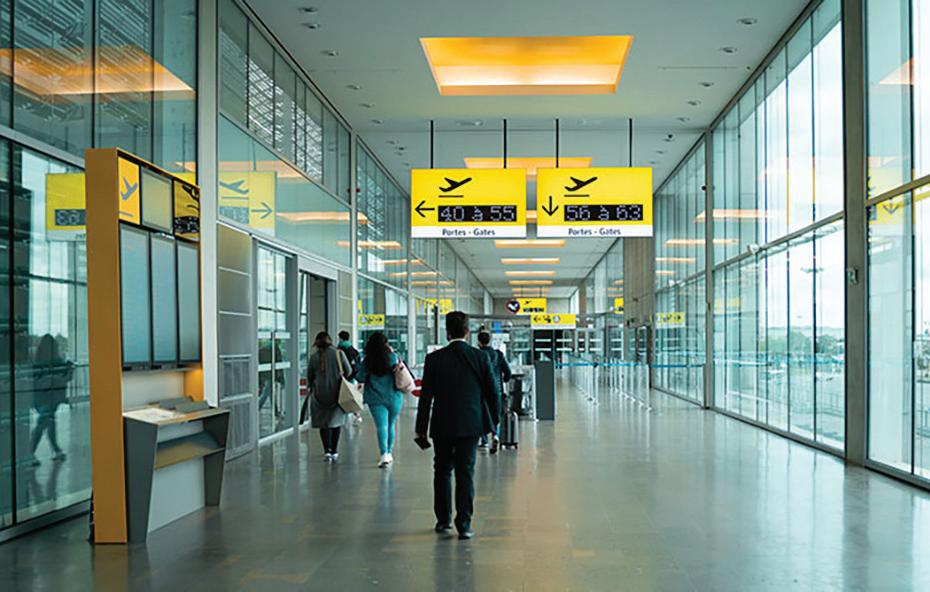
The USA and China continue to be the most frequently cited growth markets, although performance across Europe remains mixed, with some declines recorded in Germany, France and Canada.
Over half of respondents indicated growth from at least one overseas market, but a similar proportion also recorded declines elsewhere, reflecting uneven performance across key source regions.
Almost half (48%) of businesses expect to meet their 2025 performance next year, while two-in-five (40%) expect to exceed this year’s performance, supported by early group bookings and sustained demand from long-haul markets.
Respondents identified rising costs, uncertainty in the US market and geopolitical instability as the main factors shaping expectations for 2026.
Joss Croft OBE, CEO of UKinbound, said: “We hear that domestic tourism has been a real challenge this year, so it’s encouraging to see many of our members reporting stable trading and pockets of growth heading into the final quarter of the year. Demand from long-haul markets such as the US and China remain strong, and early signs for 2026 bookings suggest that international appetite for visiting the UK continues to build.
“Our members are working hard to convert this demand into real economic growth for destinations right across the country, but to fully unlock the sector’s potential, we need a policy environment that helps businesses invest, compete and grow with confidence.”
provider
mitment to food allergy awareness by renewing a four-year strategic partnership with the charity.
This continued collaboration supports The Natasha Allergy Research Foundation’s mission to #MakeAllergyHistory and reflects Bidfood’s dedication to creating safer, more inclusive food experiences across the hospitality and foodservice industry.
Andrew Selley, CEO of Bidcorp UK, said: “We are proud to continue our partnership with The Natasha Allergy Research Foundation, whose work is making a real difference to the millions of people affected by food allergies across the UK. “At Bidfood, we believe everyone should feel safe and confident when it comes to food, and by supporting the Foundation’s pioneering research and education, we hope to play our part in creating a future where food allergies no longer hold people back from living their lives to the fullest.”
The

after their daughter Natasha died aged 15 from a severe allergic reaction to sesame.
Through campaigning, education and research, the charity’s mission is to #MakeAllergyHistory, in particular food allergy, and improve the lives of the millions of people in the UK with food allergies. The couple have both been awarded OBEs for their work around food allergy.
Natasha’s Foundation is one of the only allergy charities dedicated to medical research. It wants to understand what is causing the dramatic rise in allergic disease – and develop ways to prevent, treat and ultimately eradicate it, creating a world that is safe for everyone.
Tanya Ednan-Laperouse OBE says: “The dramatic increase in allergic diseases over the past three decades highlights just how urgent it is to understand the root causes of the global allergy crisis. Today, food allergies affect millions – including 1 in 13 school children – making this work more vital than ever. We’re incredibly grateful that Bidfood is continuing its support of our mission to #MakeAllergyHistory. Their partnership is helping us raise awareness and drive forward pioneering scientific research that will change lives.”
founded in 2019 by Tanya and Nadim Ednan-Laperouse OBEs
British pubs and publicans have been at the heart of their local areas for centuries, meeting social needs and connecting communities, but new research has put a figure on just how much social value they bring.
Groundbreaking research from Pub is The Hub, the not-for-profit organisation that helps pubs to diversify and provide essential local services and activities, called ‘Pub is The Hub: Social Value’ has established that for every £1 spent investing in the provision of services and activities in the pub an average of £8.28 of social value is created.
It confirms that pubs offer social value that supports community cohesion, job security, well-being, increased social interaction and resilient communities. The report also reveals that pubs help people to overcome social isolation and replace the loss of services in rural and deprived areas.
Backed by The National Lottery Community Fund, the report measures the social value delivered by publicans and their pubs, through Pub is The Hub support, to help provide a range of vital services and activities in their local areas.

Calculating social value is an academic process that measures the added value an initiative brings to society and refers to the wider positive impact an activity, project or organisation has beyond just financial or economic returns.
The evaluation, which focuses on Pub is The Hub projects implemented between 2022 and 2024, analysed the impact of adding new services and activities. It examined how the introduction of amenities such as village stores, community cafes, and allotments, as well as events such as theatre and arts performances, help to reduce social isolation and address community needs. The evaluation also highlighted the crucial role of the publican in these efforts.
It concluded that diversified pub-based initiatives will have lasting effects on the overall improved local wellbeing for individuals and their families as well as in reducing loneliness, improving mental health and giving people greater independence.
The evaluation also found that the social value created by pubs meets several of the UN’s Sustainable Development Goals. It aligned the Pub is The Hub projects with a broader impact including tackling issues such as poverty, inequality, good health and local wellbeing.
Pub is The Hub chief executive John Longden OBE said: “Publicans and their pubs have a vital social role in supporting local communities and helping people to overcome social isolation and alleviate feelings of loneliness. They have a significant social value that is beyond economic impact. They are crucial in helping to bring people together, and helping with the provision of lost services and amenities.”
He added: “There needs to be wider recognition of the important role that individual publicans and the vital role their pubs have in rural communities and deprived areas as social hubs. Pubs contribute to the general wellbeing of locals and help drive social cohesion and community resilience in local areas.”
Cornwall Rural Community Charity (CRCC), development and evaluation manager, Gemma Finnegan, who independently conducted the research, said: “The report shows that Pub is The Hub’s success lies in its ability to leverage strategic relationships and its deep knowledge of both the industry and local communities to quickly drive meaningful social change.”
The Halfway in Tal-y-Coed, Wales, opened a village store and an event space in a marquee, with the support from Pub is The Hub.
Publican Rhiannon Metters said: “We are situated in an isolated rural community with the pub being the hub of the area. It is so important that we support local people ensuring they are not feeling isolated and alone.
“With the nearest supermarket being 20 mins away the village store here in this isolated rural area is such a support to people in the local community. The marquee has become a space where we run local courses such as CPR and craft workshops to help bring people together.”
Latest data from Lumina Intelligence’s Eating and Drinking Out Panel reveals that ongoing cost-of-living pressures and rising inflation have dampened consumer confidence, leading to a decline in participation in the out-of-home market.
The sector experienced a -1ppt drop in consumer engagement, with the outlook remaining uncertain as the Autumn budget approaches.
Despite gloomy weather towards the end of summer, pubs and bars benefited from a surge in visits, as consumers sought to make the most of remaining opportunities for outdoor socialising.

Pubs & Bars increased their share of occasions by +2.5ppts, with drink-only occasions specifically gaining +1.3ppts. In contrast, lunch occasions saw a notable decline of -1.9ppts.
As the weather turned, consumer preferences also evolved. Routine lunch occasions fell back, while delivery gained traction, rising by +1.4ppts.
Comforting dishes and warmer staples grew in popularity, while lighter seasonal options such as salads and ice creams declined.
Finger-food classics and hearty meals became firm favourites as consumers adjusted their choices to match the cooler conditions.
The high level of food inflation, which is causing significant challenges for out-of-home operators, is set to continue across the autumn and into the peak festive trading period, warns hospitality purchasing specialist Lynx Purchasing.
Spiralling prices on a range of food and drink staples are adding to the higher costs already facing the sector in areas such as wages and NI contributions. The warning comes as Lynx Purchasing publishes the Autumn 2025 edition of its regular Market Forecast.
“While the official ONS inflation rate is currently 3.8%, which is a challenge in itself, at 4.2% food inflation is significantly higher,” says Rachel Dobson, managing director of Lynx Purchasing. “With a higher rate of food price increases forecast to continue well into 2026, operators planning autumn menus, as well as trying to secure advance festive bookings, are walking a tightrope.

“Consumer confidence is fragile, making it hard to increase menu prices, but at the same time, food inflation quickly erodes operators’ margins, unless they can either save on purchasing costs, or pass at least some of the increase onto customers via higher menu prices.
“In addition, the impact of the extreme weather across the summer, from wildfires in Europe to water shortages for UK farmers, will be felt in produce prices for some months to come,”
The Market Forecast uses exclusive insight supplied by the range of suppliers that Lynx works with, as well as official inflation data, to look at food and drink pricing across the coming months.
AREAS FLAGGED UP IN THE AUTUMN 2025 LYNX PURCHASING MARKET FORECAST INCLUDE:
Beef: UK cattle farmers remain reluctant to expand production due to very high rearing costs. As a result, beef prices are expected to rise further across the autumn, as retailers compete for the available supplies. This leaves hospitality operators in the challenging position of dealing with higher prices and lower availability as the peak season approaches.
Chicken: While prices have been more stable recently, costs are rising in line with the general food inflation trend, and poultry supplies remain vulnerable to avian flu, as well as higher feed costs.
Produce: Suppliers are warning that the effects of extreme weather across the summer will impact price and availability for some time. Broccoli and cauliflower are already in short supply, while the combination of the heatwave and hosepipe bans made it harder to plant UK winter crops of a range of produce, including potatoes, parsnips and carrots, Furter afield, European production of salad crops such as tomatoes, peppers, cucumbers and lettuce has been restricted by widespread wildfires.
Dairy: Dairy prices have been high for much of this year, and producers have warned that higher costs in areas such as cattle feed, as well as a shortage of labour, will continue to have an impact. Butter has seen sharp price increases, and the challenges also affect prices of manufactured products which use dairy, as well as cheese.
IN CONTRAST, THERE IS MORE POSITIVE NEWS IN SOME MENU AREAS:
Fish & Seafood: Cooler waters in autumn create good conditions for a wide range of fish and seafood, with species including mackerel, coley, plaice, lemon sole and mussels from UK waters expected to be good value.
Potatoes: Despite concerns about the impact of the hot summer, suppliers are reporting that the UK crop is good in terms of quality and yield, which should keep prices at reasonable levels across the autumn and winter. Higher European production should also mean processed potato products will be better value.
Dobson adds: “Operators who can keep menus flexible and work with suppliers with suppliers to make then most of changing availability are best places to mitigate the impact of high levels of food inflation.
“Using specials boards to feature better value cuts of meat, or less familiar fish varieties, can boost margins and appeal to customers looking for something different when they eat out. Many varieties of UK grown fruit and veg, such as kale, chard, parsnips and pears, did well despite the hot weather, and offer good value and availability.”
Dobson adds: “When it comes to planning festive menus and trying to secure bookings, the best advice is for operators to talk to suppliers abouts availability and plan accordingly. For example, farmed smoked

Upskilling is essential for the hospitality industry to increase productivity and sales and attract candidates who want to grow with the company. Here, Caroline Evans, VP of Enterprise Sales at FutureLearn (www.futurelearn.com), discusses how hospitality businesses can close skills gaps, adapt to technology shifts and retain top talent through targeted learning pathways.
Hospitality is often mis-labelled as a ‘temporary’ or ‘stop gap’ career, which is why upskilling or reskilling isn’t always seen as a priority for those in the industry. But it has proven to be a game-changer, driving significant improvements across multiple areas. Research has shown that reskilling efforts in hospitality directly improve guest satisfaction scores by 15% – and soft skill development, such as communication training, further boosts customer satisfaction by 18%.
Aside from improving the customer experience, research has also found that upskilling boosts the sector’s financial returns, with 62% of hotels reporting reduced operational costs after prioritising staff development. Perhaps most notably, reskilling initiatives have contributed to a 25% reduction in staff turnover – an issue the hospitality industry has long grappled with.
Creating a tailored learning plan in hospitality can be challenging. Given that employees often work varied shifts, are time stretched and often tired after physically demanding shifts, learning should be flexible, accessible and designed to fit seamlessly around busy staff schedules.
Access anytime, anywhere is essential, with on-demand, mobile-friendly platforms enabling employees to learn at their convenience, whether between shifts or during downtime. Bite-sized modules, typically 5-10 min-
utes long, are ideal for microlearning, as it will let staff absorb key concepts quickly, without feeling overwhelmed or fatigued. This will ensure training is not only effective but also practical, empowering employees to upskill without disrupting their workflow.
More importantly, in hospitality, building the right learning path starts with understanding the bigger picture. Training should never be a tick-box exercise; instead, it should directly support the business’ goals. That means understanding the desired outcomes: for example, is it about boosting guest satisfaction scores, increasing upselling and revenue or reducing staff turnover? By linking training initiatives to measurable KPIs, hospitality businesses can ensure learning is not only relevant but also delivers tangible results.
The next step is assessing where the skill gaps lie. This involves a mix of methods, from managers observing staff on the job and reviewing customer feedback, to running mystery guest audits and self-assessment surveys. Performance data, such as upsell conversion rates or error tracking, can also help to highlight areas where staff need extra support. Once employers have a clear picture of the strengths and weaknesses across their team, they can start to design targeted learning plans.
Another key part of this is offering visible career pathways; which will help to motivate employees by allowing them to see how today’s learning will contribute to tomorrow’s opportunities. These pathways should clearly link training to tangible outcomes like promotions, pay rises or new responsibilities. Layered pathways, progressing from entry-level to supervisory and eventually managerial roles, provide a clear roadmap for growth, inspiring staff to invest in their development.
Segmentation is also crucial here, as not all roles have the same requirements. Frontline staff such as waiters, receptionists and housekeepers often need focused training on service excellence, communication and efficiency. Supervisors, on the other hand, may benefit more from leadership and performance management training, while managers may require development in strategy, finance or change management. Given the variety needed, online learning platforms, such as FutureLearn, which host a variety of courses will often be ideal. These will allow employees to find the right course for their training needs, while sticking to learning on the go and at a pace at timeline that suits them.
Finally, the learning path should never be static. Gathering ongoing feedback through tracking performance improvements – whether through customer reviews, upselling success or internal audits – can help employers to adjust pathways to reflect evolving needs. Recognition programmes, such as awards or incentives, further reinforce progress and create a culture where learning is seen as part of the everyday fabric of hospitality, helping the business to stay alive when markets are tight and stretched.
of £357.05 in August 2025, up from £346.52 the previous month, and up 6.4% year-on-year.
Payrolled employees in the sector also rose from 2,085,155 in August 2025 to 2,111,295 in September 2025, while food and accommodation vacancies fell slightly from 78,000 to 74,000 in the same period.
Saxon Moseley, partner and head of leisure and hospitality at RSM UK, comments: “The steep rise in hospitality wages to a record high will come as a big concern to the sector, particularly following a prolonged period of subdued sales. This puts more pressure on margins, with every £1 increase in wages also leading to additional employers’ NIC, resulting in a double whammy on operators’ costs.

“Payrolled employees in the hospitality industry rose for the first time since April 2025 and is only the second increase since March 2024. With vacancies coming down again after a surprise rise the previous month, this suggests operators have hit the bottom in terms of cutting staff numbers and are cautiously hiring again. Businesses are also likely to apply the brakes on recruitment as they wait to see what announcements come out of the Autumn Budget.
“After bearing the brunt of this year’s tax rises, the sector is calling out to the government for bold, meaningful support measures in the budget. Operators will also be hoping the budget gives consumers a spring in their step, so they feel confident enough to part ways with their money, particularly in the lead up to the important Christmas season.”

Brother UK’s trusted labelling solutions have long helped restaurants, hotels, and caterers take control of stock rotation — delivering consistency, compliance, and cost-savings through intuitive technology that’s quick to learn and makes a measurable impact.
At the heart of this is Brother’s TD-2D range of professional label printers — compact, versatile, and designed to fit seamlessly into busy kitchen environments. Ideal for everything from crowded prep benches to mobile trolleys. Optional battery packs and carry handles for added flexibility, and selected models support linerless label printing, helping to reduce waste and eliminate non-recyclable backing paper. Built for real-world conditions, the TD-2D range performs reliably even when used with wet hands.
Combined with Brother’s partnerships with leading food independent software vendors (ISVs), the solution automates expiry tracking, reduces food waste, and eliminates handwritten errors — all while saving valuable time and improving consistency during peak service periods.
In fast-paced hospitality settings with short shelf lives and shifting teams, reliable labelling is essential. Stock rotation solutions help maintain food safety, quality, and compliance, while other labelling solutions — including ingredient and allergen labelling for food pre-packed for direct sale (PPDS) — ensure allergens and ingredients are clearly identified, helping operators meet legal labelling obligations such as Natasha’s Law and protect cus-
tomers with allergies.
Simon Brennan, senior business manager for Specialist Print Solutions at Brother UK, said: “Kitchen teams work fast, under pressure and can’t afford mistakes – especially when it comes to food safety. That’s where our labelling solution comes in.
“By replacing handwritten day-dot stickers with a Brother TD-2D device, kitchens can print clear, consistent labels in seconds. It’s a faster, safer way to manage stock rotation, reduce food waste, and stay compliant with Food Standards Agency guidelines — ensuring food safety and quality even when shifts change or service peaks.

“And because our devices are compact, portable and support linerless printing, they’re built for real kitchen conditions – reducing clutter, cutting waste and keeping staff moving. It’s labelling that
them focus on food, not faults.”
To find out how your kitchen can save time, reduce waste and improve compliance, visit www.brother.co.uk/stock-rotation

By Paul Wainwright at Harrison

We are drowning in a sea of AI articles, filling inboxes and flooding social media. We are in stage one of the hype cycle: ‘hysteria’. It’s the new buzz word, just as ‘strategy’ and ‘authentic’ once dominated the design world, or when everything had to be ‘Smart’.
To be clear, I am a champion of AI and embracing new technology. Tools which are indispensable today once caused panic: CAD, POS systems, the internet, and even the calculator. Would I go as far as saying I couldn’t live without AI? Probably not, but it definitely makes my life easier, saving time and bringing focus to my weekly tasks.
In hospitality right now, I see examples of AI being used positively to benefit operations, and wildly overused for the sake of it.
AI IS A TOOL, NOT MAGIC
At its heart, AI is a fancy screwdriver. Use it to hammer in nails, you’re using it wrong, but you’ll get the same result. AI is a tool, nothing more, nothing less. Large Language Models (LLMs) create the illusion of intelligence rather than true cognition. And yet, the hype can quickly outpace reality.
Taco Bell’s recent drive-thru experiment went viral – customers ordered absurd amounts of water, in one clip a request for 18,000 cups sent the system into a loop of confusion. Or, the AI repeatedly asked, “And what will you drink with that?”, after a drink had been ordered. It is not the first, either: McDonald’s AI added bacon to ice cream orders. Both companies had to pause and reconsider how and where the technology could actually work. Demonstrable of what happens when the promise of AI meets the real world.
Closer to home, AI argued with me when I questioned the information it was giving from outdated details from Wikipedia – which is also self-editable. There lies the problem with current AI models: it’s only as good as the information it can draw on, and that information can be manipulated.
Current AI is an illusion – pattern recognition and algorithms. The moment you understand AI is not magic, nor is it a monster, is when you can see its true potential.
AI will change industries, jobs will disappear. This is the unavoidable cost of progress. The car replaced the horse as the main form of transport and industries were forced to evolve or die. The print press, once the marvel of the world, is now it’s saved for specialty and limited runs. Some jobs will change, some will disappear, and others evolve. The ones left standing will emerge in a new world of possibilities. Rockefeller, Akio Morita, and the Michelin brothers all stood at a crossroads of technology like we stand now and grew to become global leaders in their field.
AI models should remove the burden of repetitive work, allowing data-heavy tasks to be done faster and with greater accuracy.
In hospitality, value can be added to Marketing and Loyalty, Training and Staff Development, Operations and Efficiency, and Guest Experience.
The assumption is AI=efficiency=value, and that’s not always the case. For example, predictive demand can optimise staffing models. However, over-optimising could lead to fragility – a kitchen staffed ‘just enough’ based on an AI forecast could collapse when unexpected diners arrive. Humans are unpredictable and AI doesn’t have the wherewithal to understand this.
Sometimes the value is found in slowing down or personal connection. AI should never be used to remove the human-added value. Empathy, creativity, leadership, emotional connection and strategy can all benefit from the integration of AI, but humans need to be central as well. Understanding AI, both its limitations and benefits, will allow businesses to move up the value chain rather than compete with it.
Experiment daily, but with smaller tasks. Keep systems and checks in place and remember, it took six years for a company specialising in AI space planning to train its system using US building code before it was market ready. Teams must understand how to use AI responsibly. I can’t stress enough that foundations matter. What you get out is only as good as what you put in.
AI is best used as decision support, not absolute control. The sweet spot today is augment, not fully automate. The best hospitality players will use AI to remove friction in background processes and free up humans to deliver warmth, surprise, and care, the bits guests actually remember.
The question to ask is not “Where can we add AI?” but “Where is our human talent currently wasted, and how can AI give that time back?”
And my final words… Don’t Panic.
The return to office working is reshaping how Britain takes its lunch break, with more workers ditching desk sandwiches in favour of dining out, according to new data from OpenTable.
With 41% of businesses increasing their requirement for onsite working over the past year in the UK, as reported by the British Chambers of Commerce, OpenTable dining data reveals that weekday lunchtime dining (12pm – 3pm) has risen by 4% in 2025 to date (1st January – 7th September) compared to the same period in 2024.
This trend correlates to the revival of in-person business interactions.
OpenTable’s business dining data shows diners are spending 8% more per person on business meals year-on-year (YoY). The £41+ price bracket on OpenTable has seen the largest increase (+8% YoY) between 12pm – 3pm, highlighting that professionals are opting for higher-value meals – whether treating themselves or entertaining clients.

Sasha Shaker, Senior Director at OpenTable in the UK and Ireland, said: Our recent data highlights a marked rise in UK weekday lunchtime dining, with diners also spending more on business meals. This uptick could reflect the growing popularity of in-person meetings and hybrid work, with the business lunch a key moment for teams to connect and collaborate.”
The biggest weekday lunchtime dining increases are being seen midto-late week, with Fridays up 7%, Thursdays up 5%, and Wednesdays up 4% year-on-year. Alongside this, solo lunch dining on weekdays has climbed 16% YoY, suggesting that workers may be using their breaks as valuable personal time.
This shift may reflect a broader cultural change: as hybrid work balances time between home and the office, workers seem to be reclaiming lunch breaks as an opportunity to reset, recharge, and reconnect. Whether through solo dining or client-facing meals, the rise of the ‘power lunch’ underlines the evolving role of the midday break in the UK’s work culture.
Having a well-trained workforce is vital to the success of companies in the fastpaced foodservice sector. Being engaged with a training programme can have a positive impact on staff development and retention. If your business is a single unit or a chain specialising in seafood, at Seafish, we can support your training needs.
Our online self-study Elementary Food Hygiene and Elementary Health & Safety programmes are currently funded for people working in the UK seafood industry. Serving staff and fish friers can study our online learning materials containing seafood examples, at a place, pace and time suitable to them. The multiple-choice exam is invigilated remotely and successful candidates receive a nationally recognised qualification.

We also offer a half-day Principles of Fish Quality Assessment training course which is delivered remotely, so learners don’t have to worry about travelling time and travel costs. It teaches fish friers and chefs how to assess part processed fish, usually fillets, using the Torry cooked scheme. Apprenticeships combine practical on the job training with additional study. An apprentice is employed by a
business and is paid while they gain experience. They are available to both new recruits and existing staff.
Mark Drummond, owner of Towngate Fisheries in Bradford, explains:
“Having an apprentice work in the business has helped to develop staff training systems. It gives us something to promote on our social media and helps show we are a professional business with high standards.”
Seafish also works in collaboration with the KFE School of Frying Excellence in Market Deeping and the National Federation of Fish Friers in Leeds. Both offer training courses to meet the needs of a fish frier. Topics including preparation and cooking techniques are covered along with the importance of good frying medium management.
To find out more about these training opportunities, please see our Onshore Training Courses webpage at www.seafish.org/safety-and-training/onshore-training/onshore-training-courses/ or email our Onshore Training team; onshore@seafish.co.uk

London, UK – Small accommodation businesses globally spend more time managing daily operations than attracting guests, according to new research from SiteMinder, the world’s leading hotel guest acquisition and revenue platform.
SiteMinder’s study, which uncovers challenges in the small accommodation sector, shows that nearly half (49%) of small accommodation providers prioritise property management tasks over guest acquisition, while only 16% dedicate more time to growing their bookings.
Despite these pressures, 53% of small hoteliers say they would prefer to focus on guest acquisition. However, 40% cite ‘lack of knowledge’ as the biggest barrier to adopting technology that could help attract more guests, while 29% maintain static room pricing, either never changing their rates or adjusting them only once annually.

These findings come as SiteMinder unveils the next generation of Little Hotelier, now a comprehensive platform for small accommodation businesses. With this upgrade, Little Hotelier offers advanced distribution and revenue tools previously available only to larger properties.“Our conversations with accommodation providers have made it clear that while managing daily operations such as guest check-ins and coordinating housekeeping remains essential, it shouldn’t come at the expense of growing their bookings,” says Leah Rankin, SiteMinder’s Chief Product Officer.
“Running a successful accommodation business today means giving these hoteliers the tools that let them work smarter, not harder – tools that help them continue delivering excellent guest experiences while simplifying the path to attracting new bookings. We designed an all-new Little Hotelier to do just that: bringing world-class distribution technology and pricing intelligence into a property management solution small accom-
modation providers already feel comfortable with. It’s about meeting them where they are, at the heart of day-to-day operations, and giving them greater control over their bookings in a centralised platform.”
As part of Little Hotelier’s major upgrade, small accommodation providers will gain access to SiteMinder’s latest revenue-driving solutions: Dynamic Revenue Plus and Channels Plus.
Dynamic Revenue Plus is the only mobile-first solution that allows hotels to access and act upon live market intelligence, including demand-driving local events and competitor movements. This means small accommodation providers can optimise their bookings in real time, from their mobile or desktop, by taking immediate action on their pricing and distribution strategy.
Channels Plus, meanwhile, makes it easier for small properties to broaden their reach by seamlessly connecting to multiple booking channels in a single setup.
Rankin adds: “At a time when the accommodation landscape is becoming increasingly complex and competitive, small hoteliers have a valuable opportunity to be more dynamic with their pricing and marketing strategies. By making Dynamic Revenue Plus and Channels Plus available through Little Hotelier, accommodation providers – from family-run B&Bs to independent hotels – can now adjust their rates as demand-driving opportunities arise, maximise their occupancy with more booking channels and simplify their operations within a perfectly-sized property management system.”
Backed by SiteMinder’s trusted technology and global ecosystem, Little Hotelier is available to new customers globally, with existing users set to gain access later this year ahead. Broader expansion is planned from February 2026. To learn more, visit www.littlehotelier.com
Stonegate Group Raise £80,000 For LGBTQ+
Stonegate Group has raised £80,000 for Stonewall Housing, the UK’s leading charity for LGBTQ+ people who are homeless or living in unsafe environments.
Since the partnership began in January 2022, Stonegate has supported Stonewall Housing through Pride campaigns, special events, and venue-led fundraising, as well as through sales of Polari and Rainbow Pilsner beers in its LGBTQ+ venues, with a portion of proceeds going directly to the charity.
Pride Month 2025 played a key role in this fundraising effort, with £11,922.20 raised through special Pride drinks activations alone.
This included £10,000 from Heineken sales, £1,362.20 from Rainbow Pilsner and Portobello Polari (with 10p from every pint donated to Stonewall Housing all year), and £560 from Be At One’s Pride-themed ‘Matcha Matcha Man’ cocktail, which donated 50p from each sale in June. Across the year so far, sales of Rainbow Pilsner and Portobello Polari have generated over £8,488.90 towards the total.

Pride celebrations also drove a significant uplift in key cities, with Manchester, Brighton and London seeing the strongest increases in trade in Stonegate venues during Pride weekends.
This fundraising reflects Stonegate’s wider ‘Serving with Pride’ campaign – an initiative to create safe, welcoming, and inclusive spaces across its venues, while championing the LGBTQ+ community year-round. Through themed drinks, Pride events, and visible allyship in venues, ‘Serving with Pride’ highlights Stonegate’s commitment to inclusivity and helps connect people with vital support services like Stonewall Housing.
The money raised so far has had a direct and meaningful impact, helping Stonewall Housing support nearly 4,000 LGBTQ+ people a year who are facing or experiencing homelessness. The funding has contributed to
keeping the charity’s national housing advice line running, strengthening its casework services, and enabling faster responses to urgent referrals.
Claire Linacre Hilton, Director of Development at Stonewall Housing, said: “Stonegate’s support has had a powerful and tangible impact. Their fundraising and national visibility through its network of pubs, bars and venues have enabled us to reach thousands of LGBTQ+ people facing or experiencing homelessness, and to keep vital services running at a time of unprecedented demand. It’s a partnership grounded in shared purpose, and we’re proud of what we’ve achieved together – with real ambition for what comes next.”
The partnership provides vital visibility in Stonegate’s LGBTQ+ venues, signposting those in crisis towards Stonewall Housing’s support. From posters and calendars to Pride activations, this visibility has proved lifesaving for people who may not otherwise have known where to turn.
Liam Martyn, Area Manager for Stonegate Group’s LGBTQ+ venues, said: “We’re incredibly proud of the partnership with Stonewall Housing and everything it represents. Our teams and guests get behind the fundraising with real passion, and the difference it makes is clear. We’re excited to keep building on this success and to continue raising awareness and funds for such an important cause.”
Claire continued: “Partnerships like this one are vital because LGBTQ+ homelessness is still far too hidden and that invisibility can be dangerous. Through its venues and campaigns, Stonegate is helping us reach people who might never have heard of us otherwise, while also raising the funds that keep our services running. We’re facing soaring demand and rising costs across the housing and homelessness sector, so support like this allows us to respond quickly and flexibly, and to grow our reach beyond London to meet need across the UK.”

The UK’s hospitality sector has always been one of the nation’s most vibrant and resilient industries – a cornerstone of our economy and our communities. From family-run pubs to luxury hotels and leisure destinations, these venues bring people together, create jobs, and drive local prosperity. Yet, like many industries, hospitality continues to navigate a period of significant change, shaped by evolving consumer habits, rising operational costs, and shifting economic conditions.
Amid these changes, there’s also a clear opportunity for innovation and renewal. One area where hospitality venues can truly benefit is by embracing the rapid growth of electric vehicles (EVs) and the infrastructure that supports them. The number of EV drivers across the UK is rising sharply, accelerated by the government’s 2035 Zero Emission Vehicle (ZEV) mandate, which will phase out the sale of new petrol and diesel cars. For millions of drivers, switching to an EV is no longer a future ambition – it’s happening now.
For hospitality businesses, this shift opens up a fresh and exciting opportunity to attract and retain customers, enhance the visitor experience, and unlock new income streams – all while demonstrating environmental leadership. Installing EV chargers can transform a site into a destination of choice for a growing group of eco-conscious consumers, boosting footfall, extending dwell time, and strengthening customer loyalty.
At Zapgo, we’re passionate about supporting the hospitality industry through this transition. Our mission is simple: to help communities and businesses prepare for the electric future by providing rapid, reliable, and accessible charging solutions – all without the usual financial or operational burden.
Our model is built around partnership. With Zapgo’s “zero cost, zero effort, zero risk” approach, we handle every aspect of the process – from funding and installing the chargers to maintaining them and supporting cus-
tomers. There are no upfront costs for the venue and no ongoing maintenance worries. Once the chargers are live, hosts simply enjoy a share of the revenue generated from every charge. It’s a straightforward way to enhance your site’s amenities while introducing a valuable new income stream.
Whether you run a hotel, pub, restaurant, farm shop, golf club or theme park, EV charging can add measurable value to your business. Guests stay longer, spend more, and are more likely to return. At the same time, you’ll be helping your community transition towards cleaner transport and a more sustainable future.
In today’s world, EV charging is fast becoming an expected feature rather than an optional extra. By joining forces with Zapgo, your venue can stay ahead of the curve, meet the needs of a growing customer base, and reinforce its reputation as a forward-thinking, customerfocused destination.

Together, we can help the hospitality sector thrive – not just adapt – in a changing world, while keeping
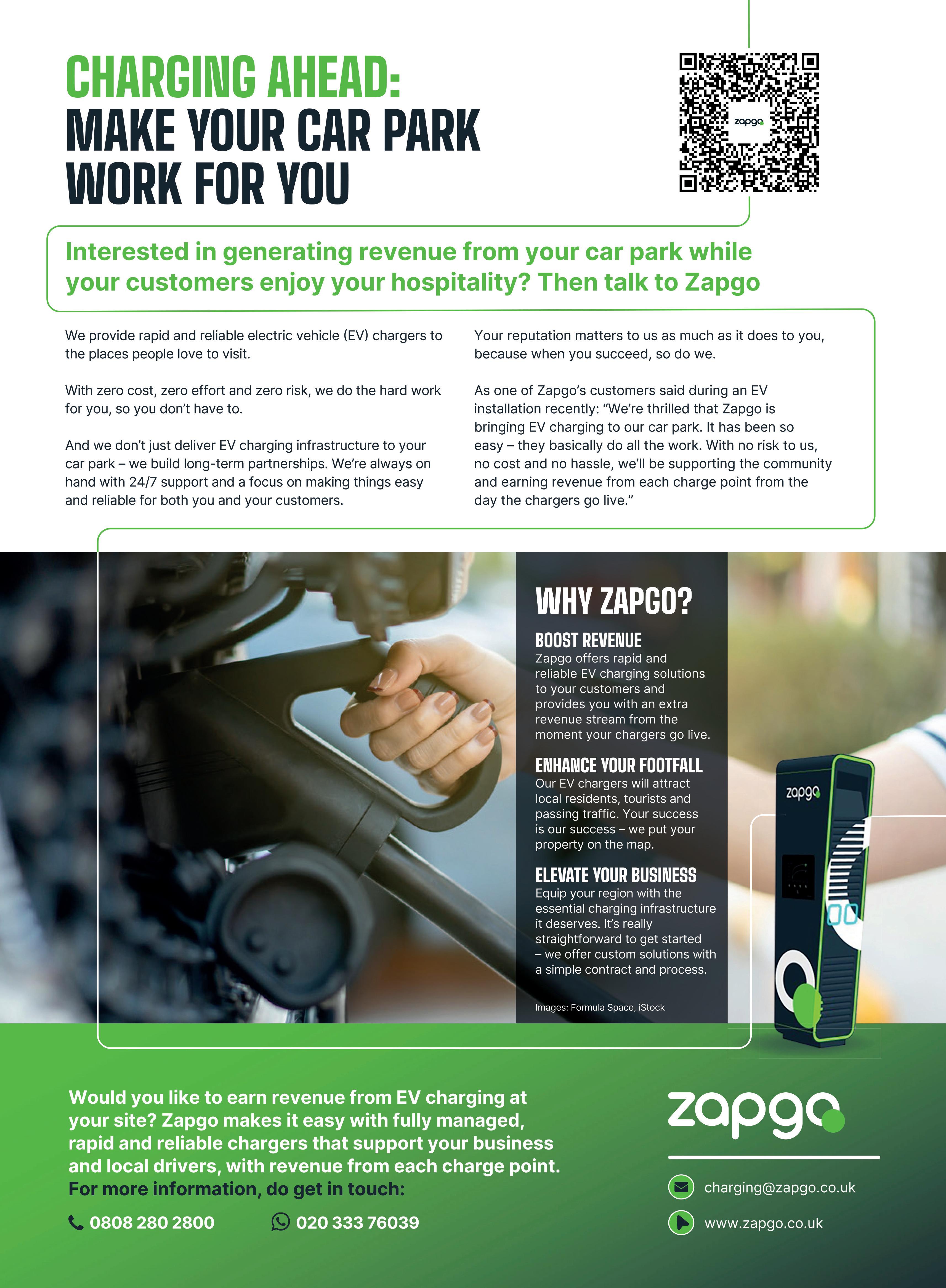

“Christmas is the Season for Kindling the Fire of Hospitality”
Washington Irving

The festive season isn't just another trading period for UK hospitality operators—it's the financial lifeline that can sustain businesses through the challenging post-Christmas months. With Christmas and New Year representing up to 30% of annual revenue for many venues, preparation today determines tomorrow's survival.
The numbers tell a compelling story. Hospitality businesses generated year-on-year sales growth of 8.8% in December 2023, demonstrating the sector's remarkable resilience during the festive period. Looking ahead to 2025, early indicators suggest even stronger performance, with early Christmas bookings across the UK's restaurants and pubs up by 54% compared to the same point in 2023.
The scale of opportunity is staggering. Industry projections indicate that Christmas is set to give a £12bn boost to the hospitality industry, with pubs expecting 10 million visitors and restaurants anticipating 8.6 million covers during the festive period. This represents not just revenue, but the crucial cash injection that carries operators through January's inevitable downturn.

It was a particularly good final 2024 fortnight for the Long Alcoholic Drinks and wine categories. Beer sales were up by 6.9% and 14.5% in the weeks to 28 December and 4 January, while cider sales rose 3.6% and 9.8% respectively. Beer was boosted by a surge of interest in Guinness, leading to well-publicised shortages in some pubs in the run-up to Christmas. Wine also achieved big gains of 8.4% and 13.8% in the two weeks. Growth was also solid for soft drinks at 3.7% and 11.3%.

Q. What you get if you cross Santa with a duck?

The harsh truth facing hospitality operators is that festive profits must sustain businesses through the post-Christmas desert. Despite sales growth over Christmas, high business costs have forced hospitality businesses to implement cost-saving measures to maintain profitability. This reality makes maximising Christmas revenue not just desirable, but essential for survival.
A. A Christmas Quacker
January traditionally sees a drop in footfall as consumers tighten belts after festive spending. The operators who thrive are those who use Christmas profits strategically—not just to celebrate success, but to build reserves that fund marketing, maintenance, and staff retention through the lean months.
cover. This means strategic menu engineering, premium pricing for peak nights, and creating multiple revenue streams from the same customer visit. Consider these approaches:
Dynamic Pricing: Implement weekend premiums and peak-night surcharges

Q. Why are Christmas Trees bad at Knitting?
A. Because they Always Drop their Needles
• Minimum Spends: Set cover charges for prime December dates
• Package Deals: Bundle food, drinks, and entertainment for higher average spend
• Extended Trading: Capture early December corporate bookings and New Year recovery
The festive season allows for premium positioning, but this must be balanced carefully. Successful operators focus on high-margin items while maintaining perceived value. Create dedicated Christmas menus with 20-30% margin improvements over standard offerings, using seasonal ingredients that justify premium pricing.
The Psychology of Festive Spending Christmas customers have different spending psychology. They're celebrating, entertaining colleagues, or marking special occasions—creating natural opportunities for upselling. Train staff to recognise and capitalise on these moments:
• Champagne Moments: Identify celebration triggers and suggest appropriate upgrades
• Group Dynamics: Use the "celebration multiplier" where groups encourage higher spending
• Gift Opportunities: Sell vouchers, merchandise, and experiences as impulse purchases
• Technology-Driven Revenue Optimisation: Modern hospitality technology offers unprecedented opportunities for revenue maximisation:
• Dynamic Table Management: Optimise seating to maximise covers per service
• Automated Upselling: Use POS prompts to drive consistent upgrade offers
• Customer Data Mining: Target previous customers with personalised festive offers
Industry analysts CGA and NIQ’s December 2024 Daily Drinks Tracker revealed average sales in managed venues in the crucial seven days to Saturday 28 December were 4.4% ahead of the same period in 2023. In the following week to Saturday 4 January, growth was even higher at 7.5%.
The late surge in trading followed negative numbers in the first half of December. Those weeks were blighted by storms in some parts of the country, but brighter and drier weather made it easier for people to come out to celebrate as Christmas and New Year got closer. Unsurprisingly the best performing days of the festive period were Christmas eve, which saw an uplift of 65% compared to 2023, and New Years eve, out performing 2023 by 373%.
Early Bird Advantage The data is clear: early preparation wins. Group bookings are up 38% in comparison to 2023 and currently account for 26% of the total bookings for December.
Operators who launch Christmas marketing in September and October capture the planning cycle of corporate events, family celebrations, and group bookings that form the backbone of festive revenue.
Capacity Optimisation: Smart operators don't just fill tables—they maximise revenue per
• Incentive Structures: Create bonus systems that reward high performance during peak periods
• Cross-Training: Ensure multiple staff can cover key positions
• Retention Tactics: Offer New Year benefits to prevent post-Christmas exodus
Supply Chain Security: Nothing kills festive profits like running out of key ingredients on December 23rd. Build relationships with multiple suppliers, order early, and create contingency plans for high-demand items. Consider the premium customers will pay for guaranteed availability.
Quality Under Volume: Maintaining standards while serving triple normal covers separates successful operators from those who damage their reputation for short-term gain. Invest in systems, training, and preparation that ensure quality scales with volume.

Cash Flow Management The smartest operators treat Christmas profits as working capital for the year ahead, not as year-end rewards. Allocate festive profits strategically:
Q. Who his Santas favourite singer?

A. Elf-is Presley
• Inventory Intelligence: Price dishes based on real-time cost and demand data
The Private Hire Goldmine December's private hire market represents pure profit opportunity.
Corporate Christmas parties, family celebrations, and New Year events command premium rates with minimal additional marketing costs. Successful operators allocate 30-40% of December capacity to private bookings, often at double standard revenue rates.
Staffing Strategies: The festive season's success depends entirely on execution, which means having the right staff in place. Plan for:
• Seasonal Recruitment: Hire and train temporary staff in November
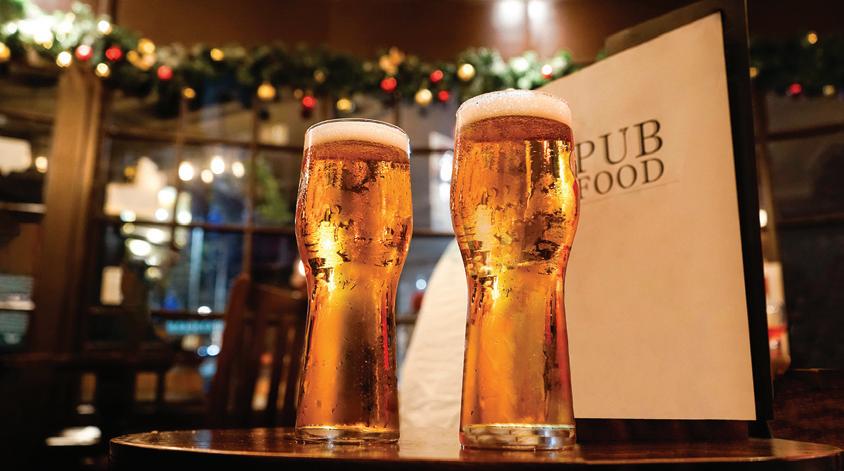
Data Capture for Future Growth: Christmas brings new customers who might not return for months. Capture their data, understand their preferences, and create reasons for them to return in January. Email marketing, loyalty schemes, and personalised offers turn onetime festive visitors into yearround customers.
2025 Opportunity
Industry analysis suggests 2025 could deliver the strongest Christmas performance since the pandemic. Consumer confidence is recovering, corporate entertainment budgets are returning, and the pent-up demand for celebration continues. However, this opportunity comes with increased competition as struggling operators fight for the same festive pound.
The operators who will thrive are those who understand that Christmas success isn't just about December—it's about building sustainable businesses that can weather the inevitable challenges of January, February, and beyond. Start preparing now, execute flawlessly, and use Christmas profits strategically to build the resilient, profitable operation your customers and your bank manager will applaud.
Christmas 2025 represents more than seasonal trading—it's the foundation of your business's future. The operators who treat it as such, preparing meticulously and executing brilliantly, will not just survive the post-Christmas period but emerge stronger, more profitable, and better positioned for long-term success.
The clock is ticking. Your Christmas 2025 performance is being decided by the actions you take today. Make them count.
Lanchester Wines’ James Dainty
shares tips for making your Christmas wine list sparkle.

The festive season is a golden opportunity to refresh your wine list and offer guests something special. It’s a time for celebration, indulgence and, importantly, encouraging customers to trade up from their everyday choices.
A festive wine list doesn’t need to be complicated. Curate selections that suit your guests’ tastes and don’t be afraid to switch things up if something isn’t working. Better still, invite regulars to taste potential additions, this builds loyalty and adds excitement.
Food pairings are key. Rich reds like Amarone pair beautifully with roast beef, while Douro wines such as Vallegre Colheita Tinto offer exceptional value for hearty winter dishes. Pinot Noir from France or Oregon is ideal
for duck or goose, and a classic Chablis works wonders with smoked salmon. For a sweet twist, try Vista Alegre Tawny Port with mince pies topped with Stilton, an unexpectedly delicious combination.
Sparkling wine is a must. Trevisana Bio Raboso Frizzante is a chilled, fizzy red bursting with wild berry flavours and subtle spice, perfect for party platters or roast meats. It’s a conversation starter and a brilliant alternative to traditional bubbles.
Don’t forget the classics. A well-chosen Brut Champagne by the glass, or large formats like magnums and jeroboams, can elevate your offering and add theatre to service. Rosé Champagne, now the UK’s second-largest category, is a festive essential.
Include no- and low-alcohol options too. Tommy Bacco Sparkling NonAlcoholic offers celebratory fizz without the ABV, ideal for inclusive toasts.
Finally, lean into the experiential. Whether it’s a festive wine flight, themed tasting or a wine list that tells a story, these touches help your venue stand out and create memorable moments.

For more information on Lanchester Wines and their full range, please visit the website at www.lanchesterwines.co.uk
In the world of hospitality, it’s the little details that guests remember the finishing touches that make an experience feel personal and special. That’s where Maple Moon comes in.
Born from decades of design and engraving expertise, Maple Moon creates beautiful enamel and wooden decorations that celebrate places, people, and stories. What began as an industrial engraving company evolved into a family-run studio producing high-quality Christmas decorations for hotels, venues, and heritage brands across the UK.

Their bespoke service allows hotels to transform their building, logo, or local landmark into a stunning enamel or wooden bauble, a distinctive keepsake that connects guests to the place they’ve stayed. From grand city hotels to boutique country retreats, Maple Moon’s creations add a sense
of warmth, character, and luxury to festive décor, guest gifting, and retail collections.
Each design combines fine craftsmanship with thoughtful storytelling, ensuring every piece feels unique and memorable. The enamel collection offers vibrant colour and polish, while the Landmark range pairs natural maple wood with a printed night sky; elegant, timeless, and perfectly suited to the season.
For hoteliers looking to elevate their Christmas presentation or offer guests something truly exclusive, Maple Moon’s bespoke decorations are a way to extend the magic of hospitality far beyond check-out.
Maple Moon – Lets Create something special.
To discover bespoke designs for your hotel, visit www.maplemoongifts.com

Heart & Soul Studio create a series of fun and engaging, yet affordable paper made products.
With over 40 years of industry experience, we began our journey by becoming leaders in quality handmade Christmas crackers. We proudly hold onto our legacy, bringing with us a wealth of experience and knowledge.
Our FSC certified Christmas crackers are specifically created for the catering and hospitality sectors. We offer plastic-free options wherever possible and are continually evolving to make every celebration more sustainable.
We also offer a range of handrolled crackers using opulent papers and bows, lovingly made here in Poole, UK. We provide a high level of customer service to each and every client, covering a wide range of price points

and industries.
We’re also immensely proud to support The Burnt Chef Project with our special charity cracker, helping to champion mental health across the hospitality industry. Visit our websiteheartandsoul.studio
For more information please email hello@heartandsoul.studio or phone us 01202 733330







The festive season is the busiest and most profitable time of year for pubs, restaurants, and hospitality venues. From Christmas lunches and festive buffets to New Year’s Eve parties, this is your chance to bring in new customers, fill tables, and showcase your special menu. But with so many venues competing for attention, how do you make sure your pub stands out?
The answer is simple: outdoor banners.

At HFE Signs, we specialise in helping pubs and hospitality businesses get noticed with high-quality, eye-catching banners designed to stop passers-by in their tracks. And this Christmas, we’re offering something extra special: two 8ft x 3ft PVC banners for just £90 + VAT, delivered anywhere in the UK!
WHY OUTDOOR BANNERS WORK
Outdoor banners are one of the most cost-effective forms of advertising available to pubs. Unlike online adverts or printed flyers that get lost in the shuffle, a well-placed banner outside your pub makes an immediate impact on everyone walking or driving past.

�� Instant attention – Bright, festive designs make your Christmas menu impossible to miss.

�� Promote your offers – Highlight your Christmas lunches, drinks packages, party nights, or New Year’s Eve specials.

�� Set the festive mood – A banner outside your venue adds atmosphere and excitement before guests even walk through the door.

�� Incredible value – For less than £100, you get weeks of exposure in the run-up to Christmas and New Year.
HFE’s banners are built to last all season long, no matter the weather.
Each banner is:
• Printed in vibrant, full colour using UV-stable inks
• Made from strong, durable PVC
• Supplied with reinforced hems and metal eyelets for easy hanging
• Suitable for both indoor and outdoor use
Whether you hang them across your pub frontage, by the roadside, or inside to promote your festive offers, these banners are guaranteed to
make your message shine.
CUSTOM DESIGNS MADE EASY
Not sure how to design a banner? Don’t worry — HFE Signs offers free design support with every order. Simply tell us what you’d like to include (menu highlights, prices, booking details, or festive graphics), and our in-house design team will create a professional proof for you to approve before printing.
That means your banners won’t just be seen — they’ll look great too. ORDER TODAY AND GET NOTICED THIS CHRISTMAS
With the festive season approaching fast, now is the time to get your marketing in place. Don’t leave your Christmas promotions to chance — make sure every passer-by knows about your menu, events, and availability.

�� Order your two 8ft x 3ft Christmas menu banners today for just £90 + VAT, delivered straight to your door.
Let HFE Signs help make this Christmas your busiest — and most successful — yet. www.hfe-signs.co.uk
Booker’s full range of seasonal supplies is now available in branches across the country, offering caterers, chefs, restaurants and foodservice operators one of the widest selections of festive dishes, drinks, desserts, and tableware designed to balance quality, convenience and on-trend appeal.
Booker’s selection of starters, main meal components, meat-free dishes, sides and accompaniments helps busy kitchens deliver high-quality, seasonal menus quickly and efficiently, offering ready-to-cook and partially prepared options that save time and labour, while still allowing chefs to add their own creative touch. Booker is also offering a limited edition selection of cheese options, a comprehensive portfolio of beers, wines, spirits, no and low alcohol drinks, as well as tableware, crackers and decorations.

The Christmas offering also features premium beef options including the Chef’s Premium Beef Shin Bourguignon Pie and Chef’s Premium Beef Short Rib with Maple and Bourbon Glaze, all prepared using traditional butchery methods to guarantee the best from every joint. At the butchery counter in branch, operators can also access bespoke advice and custom cuts to suit their specific menu requirements.
Beyond poultry and beef, the range includes Pork and Fennel Stuffed Pork Belly with prescored rind for perfect crackling, Lamb En Croûte with rosemary, garlic and redcurrant stuffing encased in all-butter puff pastry, and seafood options such as Chef's Premium Salmon en Croûte with Barber’s Cheddar Cheese Sauce.
cook from frozen.
Menus can finish with flair by tapping into the pistachio trend with Chef's Premium Salted Pistachio Semifreddo, and Pistachio, White Chocolate and Raspberry Roulade. Or offer seasonal sweet treats such as Lichfields festive chocolate orange and ginger mini loaf cakes, Christmas slices, mince pies with star embellishments, and cherry and walnut cakes. Seasonal highlights include Chef’s Premium Mint and Dark Chocolate Torte, Classic Handwrapped Panettone and a showstopping Champagne Sorbet – a sparkling dairy-free sorbet infused with real Marc de Champagne.
Booker’s extensive cheese offering features flavoured varieties including NCC Oak Smoked and Chilli Cheddar, premium brie options such as Vallage Triple Cream and Cornish Brie with Wild Garlic and other luxury artisan selections.
Starter dishes include the freezer-to-plate Chef’s Premium Smoked Salmon Terrine, and easy to prepare Chef’s Premium Croxton Manor Cheddar Cheese Souffle, both time-saving, luxurious seasonal options.
For the main event, trend-led poultry options include Chef's Premium Duck Leg Confit with warming spices and a showstopping Spiced Orange Glaze, alongside crowd-pleasing classics such as a Stuffed Turkey Breast Joint for those seeking traditional favourites.
Plant-based options include The Fat Chef Beetroot and Butternut Squash Wellington and Mediterranean Vegetable Tart, offering alternatives that appeal to flexitarians and traditional diners alike.
A full selection of festive sides offer quick, convenient solutions including Chef's Menu Shredded Brussels with Leek and Bacon, and Chef's Premium Mature Cheddar Gratin Dauphinois. Traditional trimmings are also available such as Blackgate Premium Pigs in Blankets and Chef's Premium Gastro Style Rustic Yorkshire Puddings - all ready to

The drinks portfolio includes exclusive Paul Langier Champagne created in partnership with Maison Burtin, Prosecco, and fortified wines including Royds Mulled Wine. Additionally, there is a comprehensive spirits range to enable operators to create on-trend serves such as a Kraken Salted Caramel Daiquiri, while the Nozeco Alcohol-Free Spritz offers a vibrant no-alcohol option with its bright orange hue and fresh citrus notes.
Access Booker’s Christmas 2025 guide at https://online.anyflip.com/hrqee/wwfc/mobile/index.html
As we look ahead to 2026, dining trends are being shaped not only by value, quality, and premium experiences, but also by powerful emotional drivers such as comfort, adventure, tradition, and sharing. Consumers are increasingly looking for food that excites, nourishes, and connects –while still offering healthier and more sustainable choices. Around half of diners are eager to try the latest food trends when eating out, rising to 65% among 18- to 39-year-olds, showing just how strong the appetite for innovation has become.
To help the foodservice industry keep pace, Bidfood has launched its 2026 Interactive Guide, a shoppable digital resource packed with consumer insights into the key food and drink trends, product recommendations, and trend-led inspiration. Designed to support chefs and operators, the guide offers everything from in-depth research and key statistics to menu ideas, trend safari videos, and new recipes – all focused on the themes that will define the year ahead.
This year’s food and drink trends promise bold flavours, creativity, and a balance between indulgence and wellbeing. They include:
• Topped and Loaded
• Fast-Forward Flavours
Sweet Adventures
• Tea Tonic
• Whole Lotta Goodness
Flavours Less Travelled
Topped and Loaded celebrates dishes that are visually indulgent yet

affordable. With 42% of consumers viewing this style as good value, the trend focuses on simple bases such as jacket potatoes, fries, or hash browns, piled high with premium toppings like BBQ pulled pork, chicken katsu, or chilli con carne. It’s all about satisfying comfort food with the option to customise, making it perfect for casual dining and sharing occasions.
Fast-Forward Flavours highlights how standout ingredients can elevate any dish. High-quality components such as chilli jam, gochujang, hot honey, and caramelised onion bring excitement and sophistication to menus, reflecting the 46% of consumers who prioritise ingredient quality when choosing where to eat out.
For those seeking indulgence and escapism, Sweet Adventures explores exotic global desserts and viral sensations. With 56% of diners wanting to experience new and unique cuisines, desserts like Japanese cloud cake, mango bingsu, and Dubai-style chocolate desserts offer a sense of discovery and delight.
Meanwhile, Tea Tonic redefines one of Britain’s favourite beverages. With 71% of people already enjoying tea, the trend embraces innovation through bubble teas, iced teas, and creative flavour pairings – capturing the interest of younger consumers and students who crave refreshing, modern twists on a classic.
On the health-conscious side, Whole Lotta Goodness reflects growing interest in wholesome, minimally processed foods. Nearly half of consumers are actively reducing ultra-processed foods, favouring dishes made with wholegrains, vibrant vegetables, lean proteins, and plant-based ingredients that support a balanced lifestyle.
Finally, Flavours Less Travelled celebrates authentic global cuisines that satisfy the growing curiosity for discovery. Korean, Malaysian, and South American flavours are at the forefront, offering vibrant, comforting, and adventurous dishes. From Korean bibimbap bowls and Malaysian noodle curries to Venezuelan arepas, Colombian bean stews, Brazilian croquettes, and Peruvian ceviche, these cuisines bring a world of taste to the table.

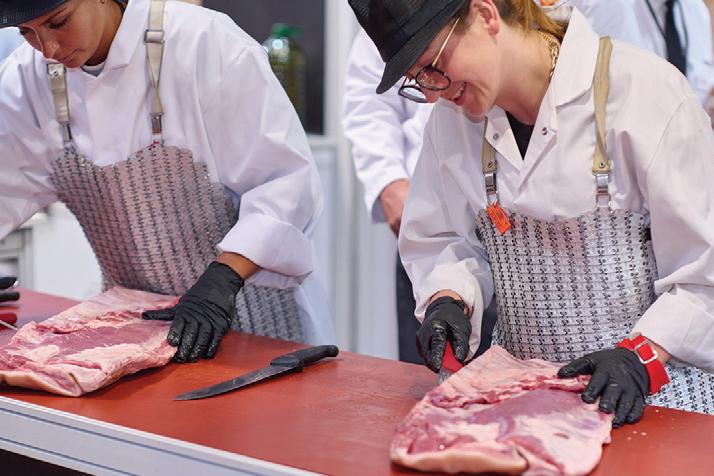
Booker is the UK’s leading food wholesaler, proudly serving over 340,000 hospitality and catering customers nationwide. From independent restaurants and gastropubs to hotels, event caterers, and street food operators, we empower every kind of food business to thrive with exceptional value, choice, and expert service.
We support chefs, kitchen teams, and front-of-house professionals with top-quality ingredients, essential supplies, and a can-do approach that makes all the difference in a fastpaced industry. Our dedicated team - including Master Butchers, specialist buyers, culinary trend experts, and hospitality-savvy colleagues - understands the unique needs of
every food business, whether sourcing the freshest produce, navigating seasonal menus, or delivering last-minute stock when it matters most.
With 190 branches, nine distribution centres, and a 7-day delivery network featuring real-time tracking and flexible credit options, Booker guarantees availability, quality, and consistency - even amid supply chain challenges. Our “We Can Save You Money” programme, loyalty schemes, and competitive pricing help customers manage rising costs, while our Own Brand ranges deliver quality without compromise to support profitability in tight-margin environments.

Beyond supply, our catering team offers hands-on advice on menu planning, portion control, compliance, and cost optimisation. We back this with sector-specific guides and clubs that provide insights, savings, and ongoing innovation.
More than a wholesaler, Booker is a trusted partner focused on the long-term success of the catering industry. With over 85,000 customer visits annually and continuous investment in people and technology, we deliver a seamless, customer-first experience that keeps kitchens stocked, guests delighted, and businesses growing.
For further information please visit www.booker.co.uk
Ever since LittlePod’s launch in 2010, the natural ingredients company’s responsibly-sourced products have been exported all over the world.
These days, the King’s Award for Enterprise winners are in close contact with customers in Germany, Japan, Estonia, Nepal and countless other countries besides.
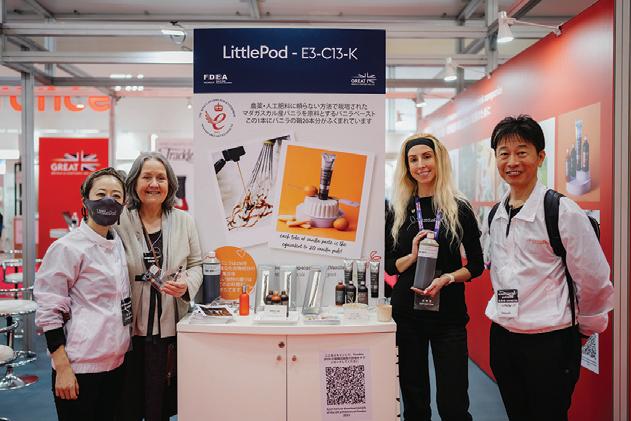
From time to time, this has led to language barriers that have had to be overcome.
This autumn, the LittlePod team have done something about it.
“October is LittlePod’s most-important month,” explained Janet Sawyer MBE BEM, the company’s Managing Director and founder. “On October 17th, we celebrate International Real Vanilla Day, an annual occasion that we use to underline the importance of REAL vanilla, and those who grow it, to the planet and its people.
“On International Real Vanilla Day, we reach out to LittlePodders all over the world and thank them for helping us to support the farming communities in the Equatorial regions.
“This October, we wanted to make it easier to communicate with our customers, no matter their location or language. To do this, we have made our website multilingual!”
LittlePod’s website is now available in 20 languages – including Japanese, German, Spanish, French, Arabic, Hindi and Indonesian.
It has proved useful already, with Janet having travelled to Japan to celebrate International Real Vanilla Day 2025 at the renowned Barakura English Garden in Tateshina, before meeting with officials at the British Embassy in Tokyo.
Janet is also visiting customers and contacts in Canada, Australia and Singapore during her trip, underlining that her company’s Campaign for Real Vanilla is a truly global affair.
“I am so excited to be catching up with our international LittlePodders this month,” she added. “No matter where in the world you may be, your support is crucial to our Campaign for Real Vanilla and I’m delighted to say that LittlePod speaks your language!”
Visit www.littlepod.co.uk
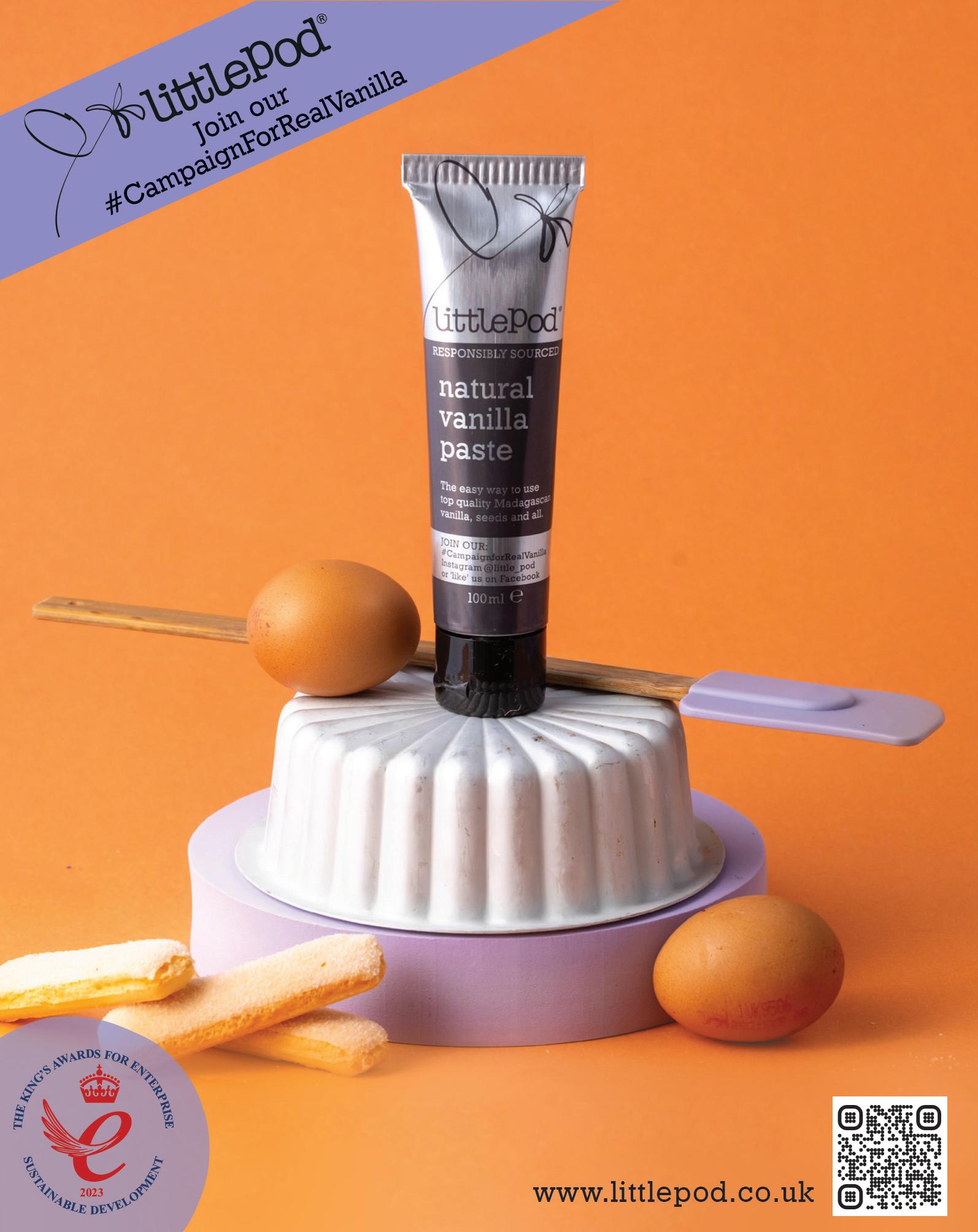
In a professional kitchen, sharpness isn’t a luxury — it’s a necessity. From the first prep of the day to the final plating at night, chefs count on their knives to deliver precision. That’s where the Tormek T-2 Pro Kitchen Knife Sharpener comes in — a sharpening solution trusted by culinary professionals around the world.
Backed by over 50 years of sharpening expertise, and developed for the intensity of the commercial kitchen, the Tormek T-2 Pro Kitchen Knife Sharpener gives chefs full control over their edge. The machine is gentle on knives — it sharpens, not shortens. Thanks to the slowrotating diamond grinding wheel and high-precision guide, it only removes minimal steel, preserving the life of your knives while delivering exceptional sharpness.

fessional-grade results. No guesswork. No overheating. Just consistent, razor-sharp edges — time after time. With its lownoise operation and compact design, it integrates seamlessly into even the busiest culinary spaces — and is also suitable for sharpening other blades commonly used in food preparation.
The Tormek T-2 Pro Kitchen Knife Sharpener is designed to handle a wide range of kitchen knives — from large chef’s knives to small paring blades — and can also be used to sharpen other common kitchen blades, including mandoline blades and S-blades. No matter the task, a properly sharpened knife is essential for efficiency and control. The Tormek T-2 doesn’t just sharpen knives — it elevates the entire kitchen workflow. tormek.com
What sets the Tormek T-2 Pro Kitchen Knife Sharpener apart is its blend of simplicity and pro-
Phone: +46 581-147 90
Email: info@tormek.se
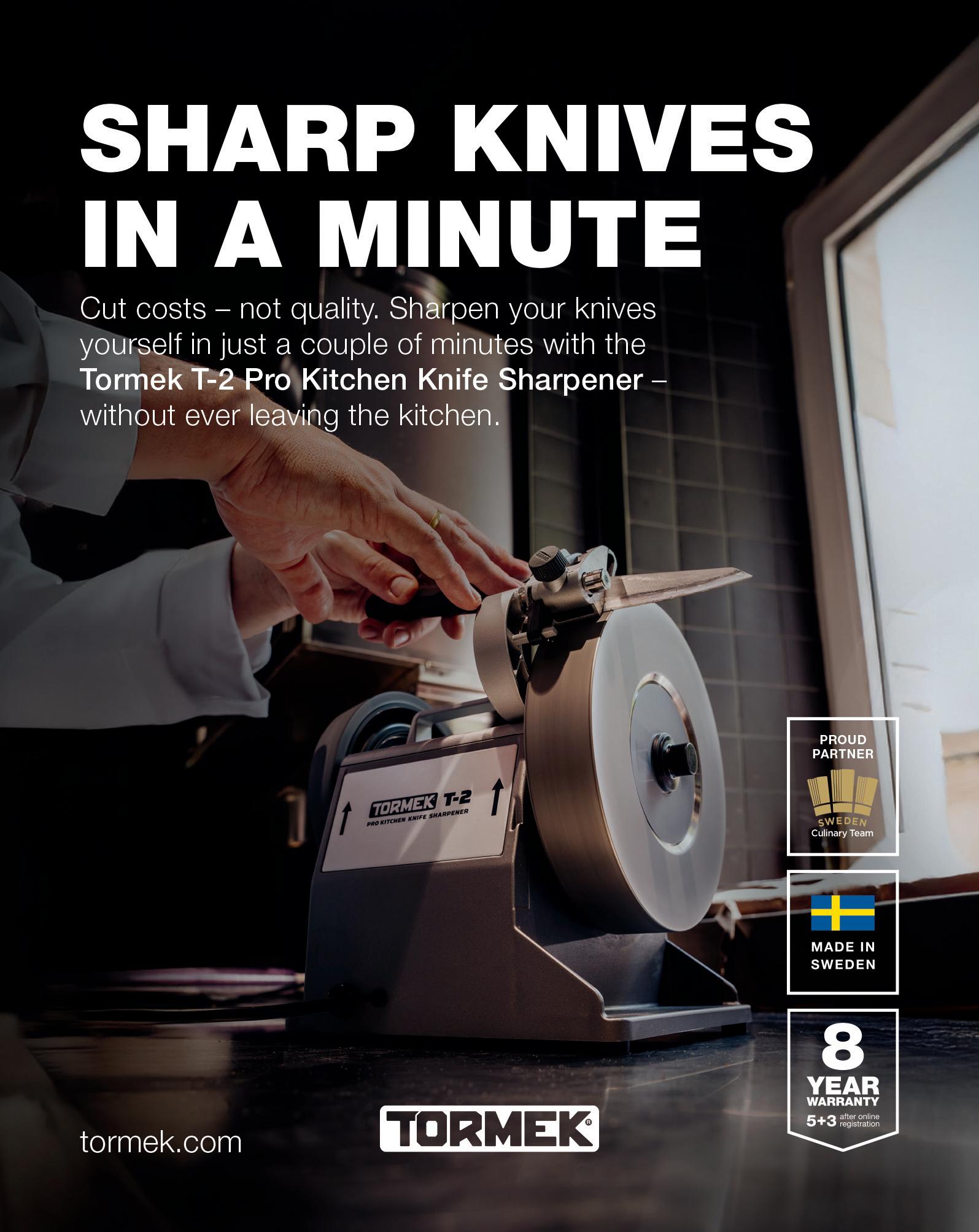

Northern Ireland’s drink industry is experiencing a dynamic resurgence, driven by a blend of heritage, innovation, and global ambition. With a growing number of distilleries and breweries operating across the region, it is becoming a powerhouse for premium spirits, craft beers, cider and RTDs.
Many of the Northern Ireland producers are award winners across the globe, including the Great Taste’s 2025 Golden Fork Award Winner, Basalt Distillery, a rising star in Irish spirits. The producer picked up the award for its flagship Basalt Volcanic Rock Gin (42.1%) while winning 2* Great Taste awards for their Basalt Volcanic Rock Gin (50.1%) and Basalt Volcanic Rock Vodka. These are crafted with ultra-pure water filtered through the ancient basalt rock of the Giant’s Causeway, a UNESCO World Heritage site characterised by the precise structure and placement of the dramatic basalt columns. The Distillery was founded by chemical engineers Martha Garbe and James

In the heat of a professional kitchen, oil does a lot of heavy lifting. From deep-frying to dressings, it’s the invisible backbone of flavour, texture, and consistency. But not all oils are created equal — and many chefs are now quietly making a change that’s transforming both their food and their bottom line.
High Oleic Sunflower Oil (HOSO) is emerging as the smarter choice for busy kitchens. Its unique composition means it stays liquid at room temperature — so it’s easy to work with, whether you’re portioning for prep or blending for sauces. It’s also naturally high in monounsaturated fats, supporting a healthier approach to frying and cooking without compromising on flavour.

down. The result? Less frequent oil changes, consistent food quality, and measurable savings on kitchen costs — all while reducing waste. Sustainability-minded caterers are also taking note. Sourced from crops grown with lower environmental impact and processed without the need for tropical cultivation, HOSO offers a cleaner, more responsible alternative for modern operations that value traceability and stewardship.
For professional kitchens striving for better performance, better food, and better value — it’s time to think high oleic.
Where HOSO truly shines, however, is in efficiency and longevity. Thanks to its exceptional resistance to oxidation, it can withstand high temperatures and prolonged use without breaking
To learn more or find your nearest distributor, contact FlavOil today.
See the advert below for details or visit https://flavoil.co.uk/

Richardson, who expertly blend scientific precision with geological heritage to produce spirits of exceptional character. The heritage is tens of millions of years old, with the geology helping to filter and purify the water drawn from the borehole. Using the purest water possible, they use state-of-the-art stainless- steel distilling equipment to create gin with complex taste and detailed flavour profiles while ensuring every drop of liquid is identical, a skill which is almost impossible to achieve within craft gin distilleries.
You can learn more about Basalt Distillery’s products and where to find them on their website www.basalt-distillery.com
To learn more about the impressive portfolio of NI drinks producers please contact Michelle Charrington: michelle.charrington@investni.com or Alex Taggart: alex.taggart@investni.com or visit BuyNIFood.com
In 2026, cheese will no longer be just a topping - it’s a strategic ingredient transforming the UK’s out-of-home dining landscape. From gastropubs to quick-service counters, chefs are leveraging cheese to drive culinary innovation, enhance flavour profiles, and streamline kitchen operations.
CONSUMER TASTES ARE EVOLVING RAPIDLY.
With nearly 60% of UK diners eating out weekly and over 90% saying it remains within budget, there’s a growing appetite for gourmet experiences and health-conscious choices. Cheese is at the heart of this shift.
Flavour-forward blends like chilli mozzarella, truffle cheddar, and jalapeño-infused mixes are gaining tractionespecially in premium formats such as Neapolitan and Detroit-style pizzas. These bold combinations offer chefs a way to differentiate menus and delight customers.
FUNCTIONALITY IS KEY.
Pre-shredded blends and varied grates improve melt, stretch, and consistency - saving prep time and reducing waste. Ingredient-inclusive cheeses provide flavourful, high-performance solutions during busy service periods.
HEALTH IS FIRMLY ON THE MENU.
High-protein options like Eatlean Protein Cheese (with 37% protein) meet GLP-1 and HFSS guidelines, helping operators cater to nutrition-focused diners without compromising on taste or texture.
VISUAL APPEAL MATTERS MORE THAN EVER.
Stuffed pizza crusts are also evolving with bold flavours like Tex Mex Chilli and Garlic & Herb. Novelty-shaped cheeses - hearts, stars, festive trees -add a playful, shareable touch that resonates with the TikTok generation. SUSTAINABILITY IS NON-NEGOTIABLE.
At Joseph Heler Cheese, we’re proud to lead the way in responsible production—using Red Tractor-certified milk, harnessing solar energy, and actively reducing emissions. With 70% of consumers prioritising sustainability, our practices help partners meet growing demand for ethical sourcing.
Cheese in 2026 is about creativity, functionality, and flavour. Let’s shape the future of pizza together.
To explore new cheese solutions or discuss your menu needs, contact: Richard Thorpe richard@eatlean.com

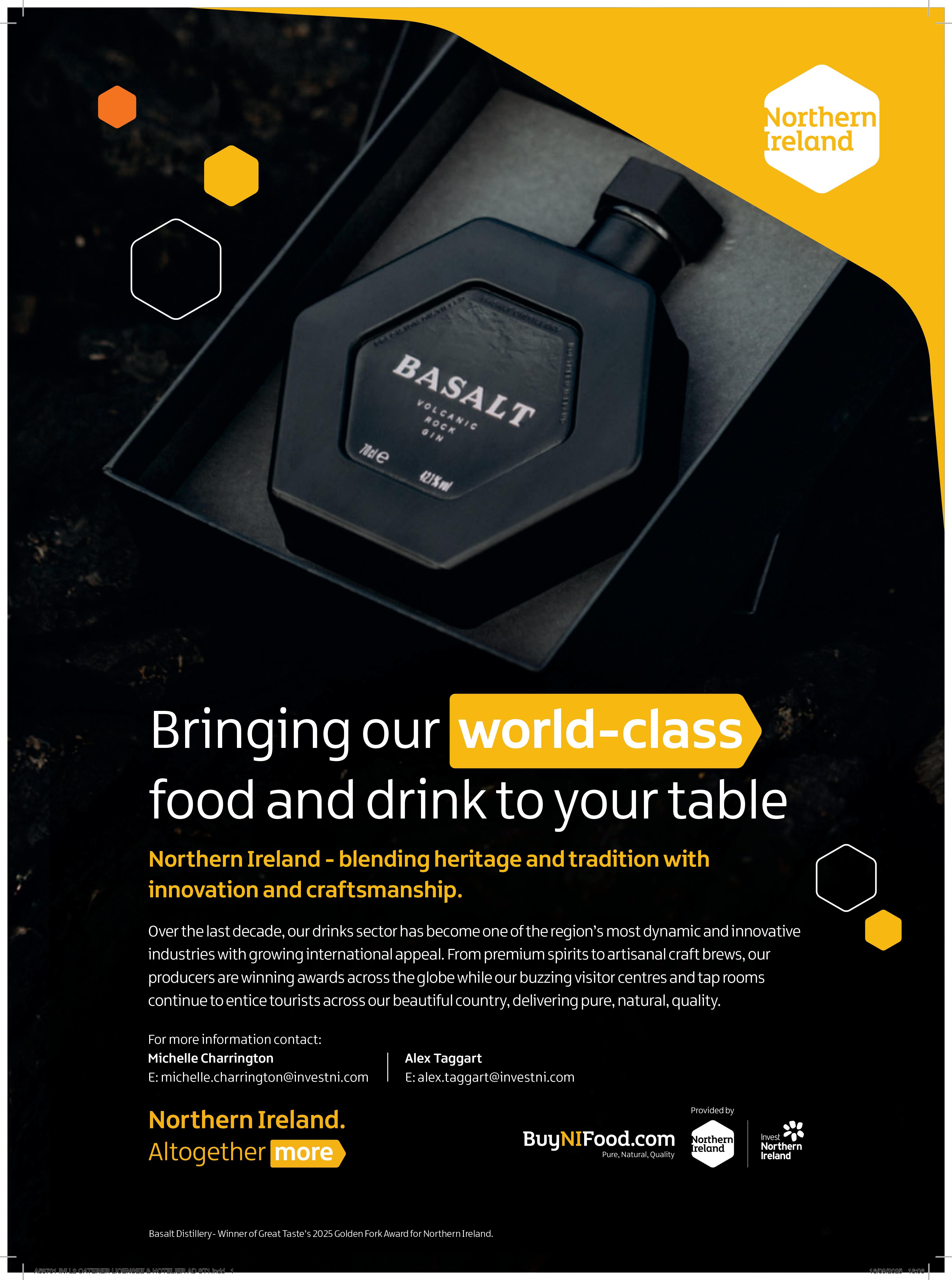

Jinro, Korea’s most iconic distilled spirit, is beloved for its smooth and crisp taste, making it a versatile companion to a wide range of dishes. While it is traditionally paired with Korean cuisine, Jinro also complements international flavors exceptionally well. It cuts through rich, fatty foods, balances the intensity of spicy dishes, and enhances the freshness of seafood, creating a truly global culinary experience. So, which international dishes pair best with Jinro? Here are three must-try pairings that will elevate your drinking and dining experience.

A refined Italian appetizer, carpaccio is a surprisingly excellent match for Jinro. Made from thinly sliced raw beef or fresh seafood, carpaccio is typically drizzled with olive oil, lemon juice, capers, and parmesan cheese, offering a delicate yet deeply flavorful experience. The clean finish of Jinro enhances the nutty richness of the olive oil while harmonizing with the zesty acidity of the lemon juice. For an even more exquisite pairing, opt for tuna carpaccio, where the fresh, silky texture of the fish is beautifully complemented by the crisp and refreshing taste of Jinro.
Mexican tacos might not be an obvious choice for a soju pairing, but they create an unexpectedly delightful combination. The soft, chewy tortilla encasing juicy, well-seasoned meat, fresh vegetables, and bold spices results in an explosion of flavors with every bite.

Jinro smooths out the intensity of the spices while cleansing the palate of any lingering tangy or smoky notes. This pairing works especially well with spicy salsa-laden tacos, where the soju’s refreshing aftertaste enhances the overall balance of flavors, making for an exciting and satisfying culinary experience.
Spain’s signature dish, seafood paella, is a luxurious combination of fresh seafood and saffron-infused rice, boasting rich umami flavors. Brimming with shrimp, mussels, and squid, paella offers a depth of taste that pairs remarkably well with Jinro. The light and smooth profile of the soju enhances the sweetness of the seafood while cutting through the savory, slightly smoky essence of the dish. This pairing delivers the same harmony found in traditional Korean seafood dishes paired with soju, making it a natural and effortless match.

Jinro transcends cultural boundaries, making it an ideal companion for international cuisine. Whether elevating the delicate flavors of Italian carpaccio, complementing the bold, spicy notes of Mexican tacos, or harmonizing with the umami richness of Spanish seafood paella, Jinro proves to be more than just a drink—it is an essential part of an unforgettable global dining experience. The next time you pour yourself a glass of Jinro, venture beyond Korean cuisine and explore these exciting international pairings. A world of new and delicious flavors awaits.
Discover more about JINRO and its wide range of products on JINRO official social media: Instagram, Facebook, Youtube, TikTok.
See the advert on the page opposite for details.

Fitch & Leedes has earned the trust of bartenders and mixologists worldwide, becoming the pouring partner of choice for over 130 leading spirits. Known for its refined range of tonics and bespoke mixers, the brand consistently delivers sophistication and balance. Crafted with pristine, quadruple-filtered water and infused with vibrant botanicals, each infinitely recyclable can offers a perfect serve. Standouts include the elegant Pink Tonic, with rose petal and cucumber notes, the zesty Grapefruit Tonic – ideal for a Paloma – and the striking Blue Tonic,
blending blueberry and cardamom with a captivating ocean hue. QR codes on every can connect consumers to cocktail recipes, videos, and pairing guides, turning every sip into a mixology experience.
GLOBAL RECOGNITION AT THE 2025 TONIC & MIXER MASTERS AWARDS
Fitch & Leedes UK was celebrated at the 2025 Tonic & Mixer Masters Awards, earning multiple Gold and Silver Medals. Gold went to Indian Tonic, Pink Tonic, and Grapefruit Tonic, while Cheeky Cranberry and Blue Tonic secured Silver. Judged by leading industry experts, these accolades affirm the brand’s dedication to flavour, innovation, and craftsmanship.
SUSTAINABILITY AT THE CORE
With an eco-conscious ethos, Fitch & Leedes uses only infinitely recyclable cans, eliminating glass waste. Its sustainability pledge is clear: Crafted with Purpose. 100% Recyclable. No Glass. No Waste. EMBRACING TRADITION AND EXPLORATION
Balancing heritage with innovation, Fitch & Leedes inspires both classic and modern serves, securing its place on the global stage.
EXPANSION INTO EUROPE
Building on its UK success, Fitch & Leedes is now expanding into European markets, bringing its award-winning mixers to new audiences. Raise your glass to a signature serve – just add Fitch. See the advert below for details.


As the festive season approaches, Port remains a staple on many drinks lists. Its rich, warming character makes it a natural partner for winter menus and celebratory moments. But beyond the traditional cheese board pairing, Port offers hospitality venues a chance to diversify their offering with a product that is steeped in heritage and increasingly versatile.
For venues looking to offer a classic serve, a Fine Ruby Port such as that from Vista Alegre is a reliable choice. With its vibrant red fruit and smooth finish, it is ideal served by the glass or paired with rich desserts. For something with a little more depth, a Tawny Port - aged in oak for a softer, nuttier profile - offers a refined alternative, particularly when paired with festive treats like mince pies or fruitcake.
Operators might also consider a Late Bottled Vintage (LBV) Port for a premium upsell. Unfiltered and full-bodied, LBV Ports like Vista Alegre’s 2015 vintage offer structure and complexity, making them a great match for blue cheese or dark chocolate.
Port also lends itself well to creative serves. Try a White Port with tonic and citrus for a refreshing aperitif, or use Pink Port as a base for winter cocktails.
Winter Fruit Bramble
- A pour of Pink Port
- Combination of winter fruits (Blackberries, blueberries, redcurrants, blackcurrants, etc etc)
- lime wedges
- crushed ice
Muddle the fruit and lime wedges. Top the glass with ice and pour pink port to top
Rosé Port Martini
With party season just around the corner, those extra touches behind the bar can turn a good night into a great one.
With Flavour Blaster, it’s easy to give guests that festive wow moment without slowing service down.
Match the scent to the season.
Think mint, chocolate, ginger, nutmeg — and over 20 other aromas to play with. A warm spiced cloud floating over a cocktail doesn’t just look good; it sets the tone before the first sip.

Flavour Blaster is designed to make life simple for the whole team. No faff. No complicated setup. Just a quick trigger pull to turn a regular serve into something people want to film, share and talk about.
From Christmas cocktails to New Year’s Eve specials, it’s the easy way to add a bit of theatre to every serve and keep the good vibes flowing all season long.
Flavour Blaster UK — match the scent to the season and make every serve unforgettable. Learn more at www.flavourblaster.com
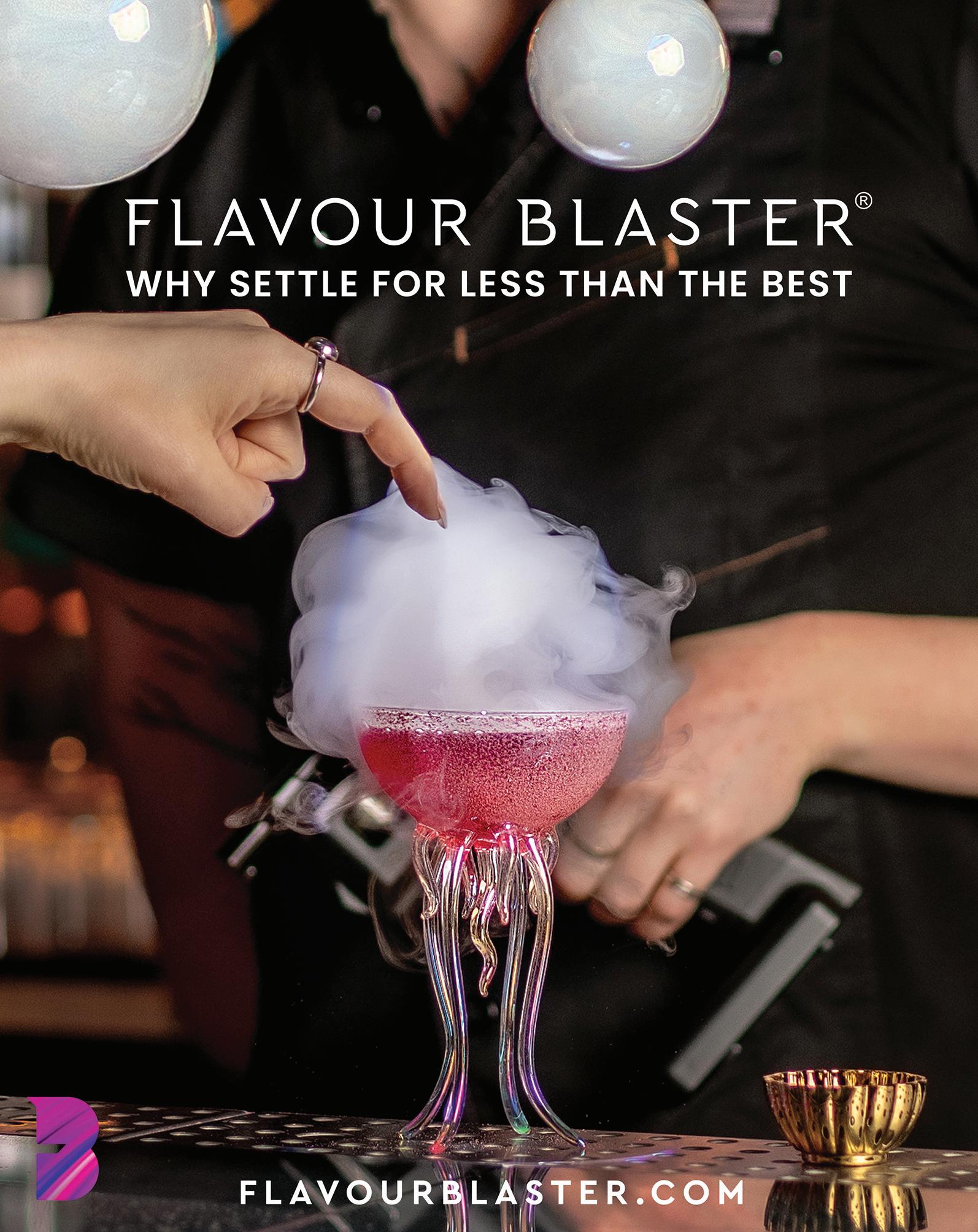
Serve in a chilled martini glass. In a cocktail shaker combine: • 2 measures Rosé Port • 1 measure gin
Strain and pour into a chilled cocktail glass
Add your own house twist by experimenting with white or ruby ports, or adding a dash of cranberry, rum or even mescal
With strong margin potential and a growing interest in fortified wines, Port deserves a place on every festive drinks list. For more information, contact sales@lanchesterwines.co.uk
Penderyn Bad Wolf, Icons of Wales #13, is a 10year-old whisky fully matured in old Tawny Port pipes, which have previously held port wine for around 60 years.
Penderyn ‘Bad Wolf’, number 13 in Penderyn's Icons of Wales series, is a brand-new bottling and celebration of contemporary modern arts in Wales and a collaboration with leading production company Bad Wolf in Cardiff. Penderyn is delighted to be able to celebrate the 10th anniversary of Bad Wolf with the release of this 10-yearold bottle of single malt Welsh whisky.
The companies have collaborated to produce a premium bottling, and the whisky was personally chosen from the Penderyn warehouse by Bad Wolf Chief Executive Officer Jane Tranter and her team.
Jane Tranter, CEO and Co-

Founder of Bad Wolf Studios, said: “There is something characteristically bad ass and unexpected in marking our 10th year of Bad Wolf by having a whisky in our name. I love the idea that while we have been producing hundreds of hours of drama in Wolf Studios Wales, in parallel this ten-year-old whisky has been quietly biding its time, maturing until ready to be appreciated. Great things come to those who wait."
Stephen Davies, Penderyn CEO, said: “This is one of the most exciting bottlings we have ever done. Bad Wolf has brought huge creativity to Wales and to the capital city of Cardiff, and through the medium of contemporary arts has been telling fantastic stories over the last 10 years. It seems fitting to dedicate a 10-year single malt to the company’s 10-year anniversary and raise a toast to many more years of success to come.”

“Tell them stories. They need the truth you must tell them true stories, and everything will be well, just tell them stories.”
Philip Pullman
www.penderyn.wales

As the festive season approaches and winter bugs proliferate, maintaining impeccable hygiene standards has never been more critical for the UK's hospitality sector
The countdown to Christmas has begun, and for licensed premises across the country, the next few months represent the most lucrative period of the year. Yet alongside the promise of packed bars and fully booked restaurants comes an uncomfortable truth: a single adverse hygiene review could unravel months of hard work in a matter of hours.
Today's hospitality operators face scrutiny that would have been unimaginable a generation ago. Every customer carries a publishing platform in their pocket, and they're not afraid to use it. A sticky table, grimy glassware, or questionable toilet facilities can be photographed, captioned, and shared with thousands before the shift manager has even noticed the complaint.
The court of public opinion sits in permanent session, and its verdict is swift and merciless. A single viral post highlighting poor hygiene standards can devastate a venue's reputation, particularly during the critical festive trading period when customer confidence is paramount.
As we enter the season of colds, flu, and norovirus outbreaks, the importance of robust cleaning protocols intensifies. Winter bugs spread rapidly in crowded, warm environments – precisely the conditions that define a busy hospitality venue during the festive period.
The potential consequences extend beyond individual illness. An outbreak
traced back to a pub, bar, or restaurant can trigger temporary closure, environmental health investigations, and lasting reputational damage. The financial impact during peak trading weeks could be catastrophic. A comprehensive cleaning programme requires more than good intentions. It demands structure, consistency, and accountability.
Professional-grade cleaning products and equipment deliver better results than budget alternatives. The cost differential pales compared to the potential losses from an outbreak or negative publicity. Similarly, ensure adequate supplies are always available – running out of essential cleaning materials during a busy shift is unacceptable.
Customers need to see cleanliness, not just experience it. Regular visible cleaning during service hours reassures guests that hygiene is a priority. Staff wiping down surfaces, changing service items, and maintaining spotless facilities sends a powerful message.
Consider the customer journey through your venue. What do they touch? What do they see? Menus, condiment bottles, toilet facilities, glassware – every element contributes to their overall impression. A beautifully presented meal served on a table with sticky residue from previous diners creates cognitive dissonance that undermines the entire experience.
As party bookings fill the diary and walk-in trade increases, the temptation to cut corners grows. Pressure mounts, staff are stretched, and maintaining standards becomes challenging. This is precisely when discipline matters most.
Providing customers with attractive and properly equipped washrooms is essential for an organisation’s image and, of course, for legal compliance. Often however, the costs of maintaining those facilities can far exceed the costs of installing them.
Typically, the biggest expenses are associated with consumables: the ongoing costs of the soaps, paper towels and toilet tissue used in washroom dispensers and equally, the time and labour costs associated with checking and replenishing them.
Consequently it is often helpful to choose larger-capacity dispensers. They will reduce the need for regular intervention and, importantly, help to ensure that guests don’t find them empty when they need them.
In high-use environments, damage and breakdowns can be costly too, so it makes sense to choose well-constructed dispensers made of robust materials. Stainless steel is an excellent choice; it resists accidental damage, wear and corrosion, it’s also hygienic and easy to clean,
Behind-the-mirror systems are an especially durable option. With all the working elements set behind a mirror, dispensers aren’t subject to accidental knocks and scratches and they stay well-protected against tampering and vandalism.
Such systems may cost more initially, but they should greatly outlast less sturdy alternatives and by requiring less
A negative hygiene review in early December doesn't just impact that day's trade – it poisons the well for the entire festive period. Customers planning office parties or family gatherings will think twice about booking a venue with recent hygiene complaints. The financial consequences multiply rapidly.
Meeting Food Standards Agency requirements and environmental health standards represents the minimum threshold, not the aspiration. Truly successful operators recognise that exceptional cleanliness differentiates them from competitors and builds customer loyalty.
In an era where customers can access Food Hygiene Rating Scheme scores instantly on their smartphones, anything less than a five-star rating raises questions. But beyond the official ratings, the subjective experience matters enormously. Venues that feel clean, smell fresh, and demonstrate attention to detail earn customer advocacy that no advertising campaign can buy.
Establishing a rigorous cleaning regime requires initial investment in time, money, and effort. The temptation to economise is understandable, particularly when margins are tight. But the long-term cost of inadequate hygiene vastly exceeds the expense of maintaining high standards.
A strong reputation for cleanliness takes years to build and minutes to destroy. In the social media age, with winter bugs circulating and the crucial festive trading period approaching, operators who prioritise hygiene protect not just their customers' health, but their business's future.
The question isn't whether you can afford to implement comprehensive cleaning protocols. It's whether you can afford not to.
maintenance and fewer repairs and replacements, they should incur substantially lower costs overall.
Good washroom equipment can also make an important contribution to the customer experience. Guests will be quick to notice poorly equipped or badly maintained facilities; the condition of the washroom can say a lot about a business. Specifying more reliable washroom equipment will make an important difference, but stainless-steel products offer another attractive feature: they can be produced in a variety of styles and finishes – brushed, painted and lacquered – to match existing corporate branding.

Finally, many businesses are keen to promote sustainability and here, stainless steel dispensers afford another benefit. Made from 60% recycled content, they can be fully recycled at the end of their long working lives. Moreover, Dudley Industries’ products are made in a factory using 100% renewable energy, so their carbon impacts are further reduced. For added peace of mind, they are also supported by up to 10
warranty. For further information see the advert on this page.

Tork, an Essity brand and the global leader in professional hygiene, announces findings of a global Insight Survey of end users and cleaning staff that explored attitudes toward hygiene in washrooms. Tork continues to push for inclusive hygiene by identifying barriers that prevent people from comfortably meeting their needs in public washrooms and the resulting impact on businesses.
Significant societal shifts have taken place with regards to awareness and accommodation of individual physical circumstances and conditions in washrooms in public spaces and the workplace. Changing places are more commonly seen in shopping centres and disabled toilet cubicles are incorporated into the design of public washrooms, signposted by the wheelchair sign. However, globally 95% of people who report physical or cognitive conditions are not in a wheelchair.
The global Tork Insight Survey reveals that many needs remain unrecognised in washroom design and maintenance. In fact, globally, 1 in 2 people are likely to face barriers to hygiene in washrooms meaning there is a disconnect between their capabilities or needs and the washroom environment. 33% of those who report a physical or cognitive condition have skin sensitivity, 29% have anxiety and 22% have rheumatism. Such sensory sensitivities, cognitive conditions or paruresis (shy bladder) can result in people refraining from using washrooms or being

Drawing similarities with the global view that 1 in 5 washrooms do not meet hygiene cleanliness expectations, 24% of people surveyed in the UK cite ‘unhygienic’ as a reason for never using or having avoided a washroom, and 50% say they have not used a washroom at a venue even though they needed to. Overall, in line with disappointing global survey stats, 83% of end users surveyed in the UK are concerned about hygiene
• 30% have spent less time at a venue because of the state of the washroom
• 17% have avoided eating and drinking at a venue
• 10% have told their friends to avoid the location and 7% have left a poor online review
• 18% of people have made a complaint to staff or workplace management about poor washroom experiences
• 15% worked from home more than they otherwise would, because of poor washrooms at work, hindering compliance with return to office policies
able to fully meet their needs in the washroom.
In the UK, 17% of those who report a physical condition suffer from a skin sensitivity such as eczema, which can be aggravated by harsh soaps, and 12% are challenged by arthritis or suffer from chronic pain, which can make using toilet paper and accessing soap from dispensers difficult.
We’ve all experienced it, sitting down at a restaurant only to find the menu clinging to the table. That tacky feel is one of hospitality’s biggest guest turn-offs and can quietly harm a venue’s reputation.
Sticky tables signal poor hygiene, even in otherwise spotless settings. This perception can be costly: guests may assume standards are low, leave negative reviews, and avoid returning. The problem, however, usually lies not with cleanliness but with cleaning practices themselves.
Many restaurants use sanitising sprays that contain quaternary ammonium compounds (quats). Over time, these leave behind a thin, sticky residue that attracts dirt and grime. Re-using damp cloths across multiple tables spreads the problem further, while heat and humidity make it worse. The result? Tables that look clean but quickly feel anything but.
The good news is that sticky tables aren’t inevitable. Restaurants can break the cycle by choosing alcohol-free,
To learn more about how inclusive hygiene can improve your business please visit:
www.torkglobal.com/gb/en/about/inclusive-hygiene
Tork Insight Survey 2025, conducted in US, UK, Germany, France, Mexico, Canada, Australia, Spain, Sweden, Netherlands and Poland among 11,500 people from the general public and 1,000 cleaning staff.
residue-free wipes made for food-contact surfaces, using ready-to-use products to avoid dilution errors, cleaning before sanitising, and allowing surfaces to air dry properly.
Sticky tables might seem minor, but they influence perception, reviews, and loyalty. A clean table doesn’t just look good - it builds confidence, compliance, and longterm trust in your brand.
At Sani Professional®, we’ve developed Protect 360° biodegradable sanitising wipes to solve this challenge sustainably. Their plant-based active formula cleans effectively and dries residue-free, helping hospitality teams deliver a spotless, guest-ready finish every time.

Request your FREE Protect 360° samples by writing an email to samples@sanipro-intl.com



The combination of damp winters, humid summers and building stock with outdated insulation and ventilation has made tackling mould an increasing challenge for the hospitality industry. Beyond being unhealthy and unpleasant, mould is costly, difficult to tackle and increasingly subject to regulation. The gravity of this situation is underlined by the introduction of Awaab’s Law this October, which will impose strict timeframes on social housing landlords to investigate and repair reports of damp and mould.
To help address the issue, Pazco has introduced Inducoat Fungi to the UK market - a proven, one-coat, 24-hour anti-mould solution from Dutch surface hygiene specialists Inducoat. Inducoat Fungi provides up to five years of mould protection, reducing maintenance and, in turn, saving time, labour and material costs. The system is highly effective on a wide variety of surfaces from walls to ceilings and even woodwork, making it the ideal choice for the hospitality sector.
Inducoat Fungi works by harnessing next-generation technology to actively combat
mould. The paint’s advanced formula bonds a powerful blend of biocides directly to its molecules during production, ensuring a slow and sustained release that provides extended protection against mould regrowth. The specialist engineering techniques employed in its production minimise leaching, meaning that Inducoat Fungi maintains its effectiveness far longer than other mould-resistant paints.
Inducoat Fungi is the only anti-mould coatings manufacturer to receive a CTGB number accreditation from the Dutch Authorisation Board. The paint is also tested to the highest European standard for antifungal coatings (EN15457).
Bobby Hall, Director at Pazco, comments: “Mould is more than just a maintenance issue – it’s a reputational and regulatory risk for the hospitality sector. Inducoat Fungi gives operators peace of mind by delivering proven, long-lasting protection, creating a better guest experience and saving time and money on maintenance.”
For further information, please visit www.pazco.co.uk
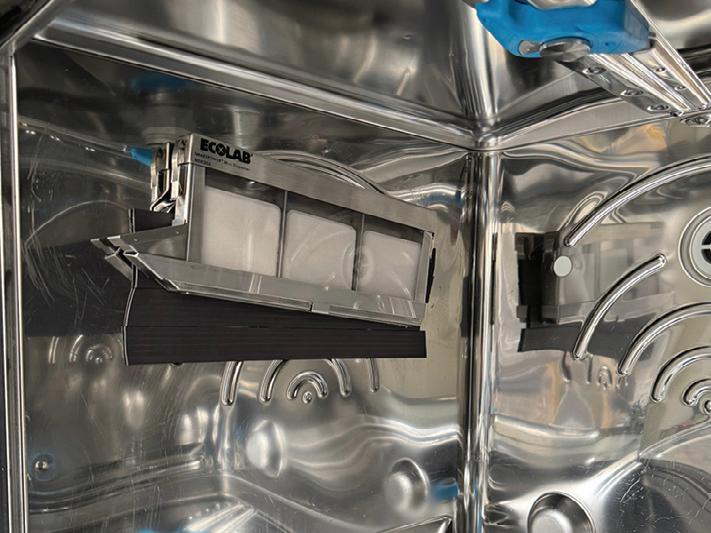
In care homes, clinics, and hospitality settings, where hygiene is non-negotiable and space is at a premium, two innovations are redefining how cleaning gets done: SMARTPOWER™ Mini and ReadyDose™.
The SMARTPOWER™ Mini is a compact, solid detergent and rinse system designed for undercounter dishwashers. It delivers up to 150 washes per refill, with no leaks, no mess, and no need for tools during installation. Its passive dispensing system ensures consistent results while reducing packaging waste by up to 93% and cutting CO2 emissions by over 70% compared to traditional liquids. It’s a win for safety, sustainability, and simplicity—especially in environments where staff turnover is high and training time is limited.
Complementing this is ReadyDose™, a tablet-based cleaning programme that’s perfect for small-footprint sites with limited access to water lines or space for dispensers. Whether it’s a care home kitchenette or a
boutique hotel bar, ReadyDose™ offers a professionalgrade clean with a straightforward, no-fuss routine. Each tablet is pre-measured, eliminating dosing errors and reducing chemical exposure for staff. It’s ideal for locations where safety, speed, and ease of use are paramount.
Together, SMARTPOWER™ Mini and ReadyDose™ empowers customers to streamline operations, reduce environmental impact, and maintain the highest hygiene standards.
To learn more or request a demo, contact your Ecolab representative today or visit the SMARTPOWER Mini homepage or ReadyDose homepage to discover more and register your interest in a free trial.


Because when it comes to cleaning, small innovations can make a big difference.
https://en-uk.ecolab.com/
Hoteliers and hospitality operators are being urged to prioritise Legionella safety as the sector prepares for the busy seasonal rush.
Cases of Legionnaires’ disease - a potentially fatal lung infection caused by inhaling water droplets containing Legionella bacteria - have reached record levels, with 604 cases reported in England and Wales in 2023, up from 488 in 2017.1
Legionella thrives in stagnant water - particularly in temperatures between 20°C and 45°C - common in unused or little-used water systems. The risk is particularly high in hotels and hospitality venues that may have been vacant or experienced intermittent use during the off-season ahead of the seasonal rush.
With this, Hydrosense, the UK’s leading authority in rapid Legionella testing technology, is urging the sector to pay due diligence to Legionella risk when preparing for the festivities.
“As bookings ramp up for the busy festive season, hoteliers and the like mustn’t overlook the importance of ensuring a robust approach to water safety,” said Greg Rankin, CEO at Hydrosense. “Legionella bacteria can build up quickly in stagnant or underused systems, especially during warmer months - creating the perfect conditions for bacteria to grow. Taking action now - flushing systems, checking temperatures, carrying out risk assessments to incorporate rapid Legionella testing, can make a big difference in keeping guests safer and establishments compliant.”

Under UK health and safety law, all property owners and duty holders are responsible for identifying and controlling the risk of exposure to Legionella, including hoteliers, caterers and hospitality providers.
Along with regular maintenance, frequent flushing, and risk assessments, Hydrosense asserts there is also a clear case to incorporate regular rapid Legionella testing – which can detect Legionella in just 25 minutes – as part of any water safety regime.
“With Legionella cases on the rise, prevention is far easier - and far less costly - than managing an outbreak,” Rankin adds. “Rapid testing as part of peak-season preparations gives hospitality operators peace of mind, safeguarding both guests and reputation.”
For further information, visit Hydrosense: https://hydrosense-legionella.com/

A year after the much-heralded Allocation of Tips Act 2023 came into force, a new study by URocked, a leading digital tipping platform, reveals a troubling truth: consumer trust in how UK restaurants handle tips remains woefully low. Despite the law's clear mandate, a staggering 54% of consumers doubt that restaurants are passing on 100% of tips to staff.
This crisis of confidence isn't unfounded. The research, conducted in September 2025, exposes significant gaps in the legislation's implementation, which became law in October 2024. A quarter of employers admit to making no changes since the law's introduction, and 24% of restaurant staff report no shift in their employers' tipping practices. While 20% of staff claim to have received more tips, a concerning 23% report receiving fewer.

A critical issue is the widespread misunderstanding of the law itself. While 53% of decision-makers correctly identify the requirement for 100% pass-through, a substantial 45% still believe that deductions, exemptions, or discretionary distribution are permissible. This confusion trickles down to staff, with 14% suspecting their employer isn't complying. Alarmingly, some decision-makers mistakenly believe the law only applies to full-time staff (21%), that policies printed on receipts offer flexibility (15%), or that admin fees can still be deducted (9%).
This lack of transparency and understanding is not just impacting staff morale and earnings; it's also stifling a significant opportunity for increased customer tipping. A striking 60% of staff believe customers would be more inclined to tip if they had better confidence in the restaurant’s distribution process. This is particularly crucial given that 65% rely on tips / service charge to some degree.
As David Dillon, CEO of URocked, rightly comments, "While nearly nine out of ten respondents say the new law has made things fairer for staff, our research shows there's still work to be done in building consumer trust and ensuring universal employer compliance."
The onus is now on the industry to bridge this trust deficit. Transparency in tipping practices and robust education for both employers and consumers are not just desirable, but essential to restoring confidence and ensuring that the spirit of the Allocation of Tips Act is truly upheld. Without these measures, both staff and customers will continue to question the fairness of a law that’s designed to protect them.
Tipping platforms like URocked can help bring in much needed transparency. To find out more about URocked and to access all the findings from the tipping survey, click here. https://urocked.com/blog/tips-act-one-year-later/
Hotels and Pubs run best when F&B purchasing is seamless, transparent and reliable. The great adage ‘the right tool for the job’ is very apt when we think about the needs of Chef’s, cooks and gastro imagineers.
AUTOMATED
AND ACCOUNTS
PAYABLE
If you’re still manually entering paper, PDF and emailed invoices it’s time to stop wasting your valuable time and put in a system that’s made to do it for you. Get your invoices coded, approved and sent to AP for payment without manual errors.
ORDER IN ONE GO

Stop going to each supplier site, calling, emailing and order from multiple suppliers in one go – modern systems are so much better at solving those fragmented ordering process challenges so get back control of

your purchasing.
Buying tools with flexible and more importantly supplier centric portals helps ensure you’re reaping the benefits of engaged supplier networks. Comprehensive product information, descriptions, images all ensuring supplier products are beautifully represented to your teams improves visibility, makes purchasing faster and more informed.
When suppliers are empowered and supported by both your team, the tools you use to engage with them and their customer service teams you get tighter supplier relationships, transparency and trust and happy chefs - making delicious food that your guests will rave about.
PurchasePlus is for any organisation drowning in manual procurement and invoicing. Simple, modern way to buy, manage suppliers and process invoices automatically. www.purchaseplus.com

CardsSafe has been used by pubs, restaurants, bars, hotels and golf clubs all over the UK, from independent inns like the Deers Hut in Hampshire to top chains like Hilton Hotels and golf clubs like Silvermere and Lord’s, the home of cricket for over twenty-five years. The CardsSafe system is designed to retain customer bank cards while you run their tab safely.
Deterring dine and dash incidents will reduce losses and improve the bottom line. Consider hiring the CardsSafe system, which is designed to securely retain customer credit, debit, and ID cards while the cardholder runs a tab. It’s the ideal deterrent for anyone contemplating walking out of your establishment without paying because their card is safely tucked behind the bar in a CardsSafe unit.
CARDSSAFE IS AFFORDABLE
The beauty of CardsSafe is that it’s remarkably affordable—it pays for itself. One CardsSafe unit contains ten drawers that can hold ten customer bank cards. It can be hired for just £9.95 per month, and each hire comes with customer service, troubleshooting and free replacement keys. Just one £120 dine and dash incident is the equivalent of one ten-card CardsSafe unit per year. With CardsSafe, the potential to prevent thousands of pounds of loss is significant.
The system is super easy to use and requires minimal instruction, saving you time and virtually eliminating the hassle of staff training. It is not hardwired and does not capture any data. Our hospitality clients use it alongside existing point-of-sale behind the bar, while our golf centre clients use it across their site to offer refreshments on the green.
THE SECUREST WAY TO KEEP BAR TABS
It’s a fact that hospitality and leisure customers want their bank cards kept secure when they run a tab. Leaving a bank card in a till or folder is irresponsible and not good practice. Eliminating the worry that customers’ credit or debit cards are professionally looked after while they enjoy a meal and drink should be a top priority at every venue. For more information, visit www.cardssafe.com or call 0845 500 1040.
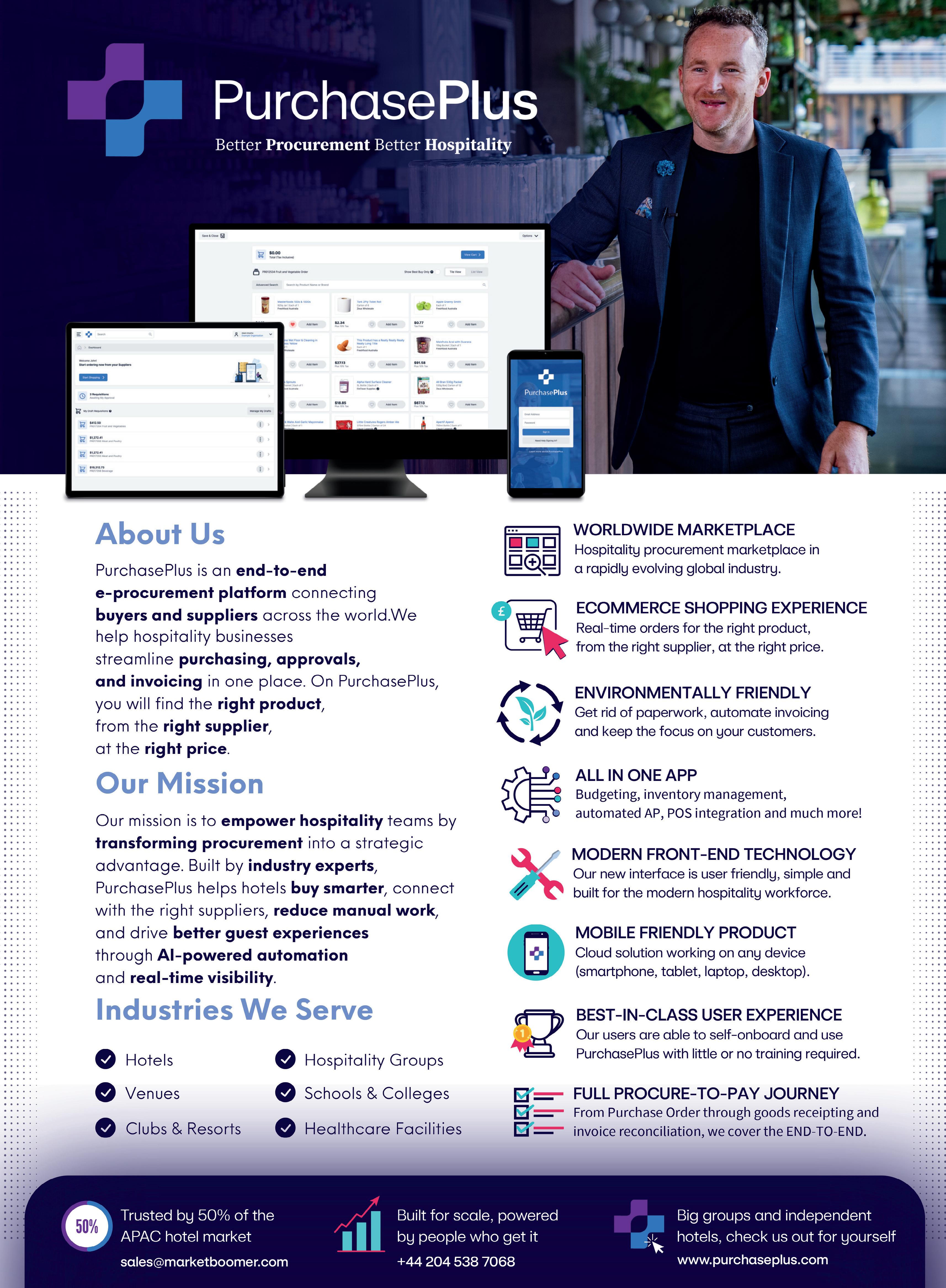

Moneypenny, renowned for its world-class client conversation solutions, has launched a brand-new AI Voice Agent designed specifically for the hospitality sector, building on a successful beta programme. This intuitive virtual assistant speaks naturally with clients over the phone, offering greater flexibility in how hospitality businesses manage enquiries, protect billable hours and deliver exceptional client care.
Built and run from centralised architecture at Moneypenny, the AI Voice Agent is human sounding, warm and always available. Capable of holding natural conversations using everyday language, it removes the frustration of automated menus or lengthy hold times. Clients simply speak and the AI Voice Agent responds instantly and clearly in a way that feels professional and reassuring.
Designed to reflect each hospitality company’s brand and enhance the client journey, the AI Voice Agent can triage high call volumes, understand enquiries and handle straightforward requests such as opening hours, directions, bookings or document requirements. It also captures key information including client names, contact details and booking requests, and can transfer calls to either a Moneypenny receptionist or the appropriate person, ensuring that sensitive or complex matters are always handled correctly.

Available 24/7/365, the AI Voice Agent ensures no call is ever missed, even during peak periods, and can manage multiple enquiries at once, eliminating voicemail backlogs and long wait times. Operating within strict guardrails, it delivers only accurate, company-approved information, supports lead capture and appointment scheduling and reduces interruption for in-house teams. If a query is too complex or a client prefers to speak to a person, the AI Voice Agent escalates instantly to a real Moneypenny PA or a member of the company’s team with no disruption.
Jesper With-Fogstrup, Group CEO at Moneypenny, commented:
“Our AI Voice Agent has been developed recognising that many hospitality businesses want to automate straightforward enquiries, while ensuring that complex and sensitive conversations remain firmly in human hands. It is about balancing efficiency and empathy and enhancing the already brilliant client-focused service we are known for.
For further information please visit www.moneypenny.co.uk or call 0333 202 1005

In football, it's not only about the game; it's about creating a memorable experience for fans. That's why clubs are continuously seeking ways to enhance matchday experience by reducing queues and providing more options for their supporters.
Notts County FC adopted an innovative strategy to achieve this by installing a new bar inside a repurposed shipping container at their Meadow Lane stadium, with the aim of improving fan experience and boosting matchday revenue.
To ensure seamless operations and efficient transactions at the new bar, Notts County turned to MCR Systems, a leading provider of EPOS (Electronic Point of Sale) solutions.
INSTALLING A WINNING
MCR Systems swiftly responded to Notts County's needs by installing eight cutting-edge EPOS terminals with the new bar. These state-of-the-art terminals were equipped with interactive media screens and integrated payment devices, providing a robust solution to manage the bustling crowds during home games.
MCR Systems conducted thorough training sessions with the club's team to ensure a seamless transition

and help the team maximise the functionality of the new system.
The installation had an immediate and practical effect. Fans enjoyed shorter wait times and quicker transactions, significantly improving their matchday experience.
Encouraged by these positive outcomes, Notts County FC decided to take further steps to enhance their matchday offerings by expanding their partnership with MCR Systems.
Notts County ordered an additional ten terminals from MCR Systems for two new sections in the away end of Meadow Lane. These terminals were operational just in time for the Boxing Day fixture against Doncaster Rovers, further enhancing the stadium's amenities and revenue potential.
T: 0116 299 7000
E: enquiries@mcr-systems.co.uk www.mcr-systems.co.uk

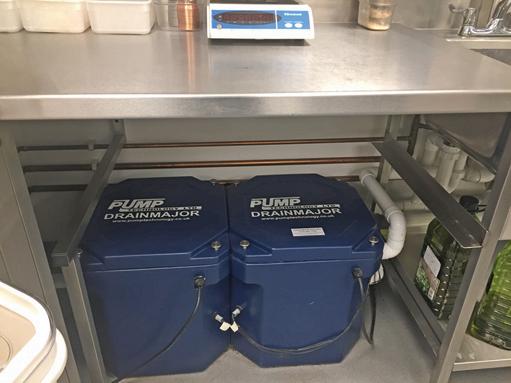
For large commercial kitchens without gravity drainage a reliable pumping system is essential to ensure service is not interrupted. A pump failure when the kitchen is busy can be extremely financially challenging.
Selecting a reliable and proven waste water pumping system such as the DrainMajor Duo or DrainKing, fitted with Jung Pumpen pumps, from commercial kitchen experts Pump Technology Ltd is often the kitchen designers first choice to mitigate against such a problem.
Discussing an installation with the application team at Pump Technology Ltd is a fast and worthwhile process. They will select the right size pumping system for the number of sinks and appliances required, taking into consideration factors in the site which users might not have been considered when first thinking about pumps.
Often a dual pump, duty standby configuration will provide the solution. Not only will this offer a backup if one pump fails, but it will easily also serve a number of sinks and appliances such as dishwasher, pasta boilers etc.
This type of unit can be an extremely cost effective and efficient alternative to buying and installing multiple pumping systems.
The Pump Technology Ltd DrainMajor Duo and DrainKing are both twin pumping systems offering duty standby pumping protection. The choice will be based on a number of factors. The DrainMajor Duo has a rectangular footprint and the DrainKing a square one.
The Drainmajor Duo features two separate tanks, with each pump operating independently servicing different sinks and appliances. If one pump should fail, the liquid level will rise and flow through into the other tank. That pump will then also act as the standby pump. This configuration avoids the need for a control panel.
The DrainKing comes with two pumps in a common tank. It’s control panel swaps over the duty pump every pumping cycle. The benefit of this is
Caterquip Ventilation Ltd is proud to be celebrating their 25th Anniversary this year.
This Warwick based company offers nationwide coverage for all your commercial catering needs: free site surveys, quotations and designs (CAD), quality bespoke and standard fabrications, specialist knowledge of catering ventilation systems including input air, odour reduction (carbon filtration and ESP) and sound attenuation. Affiliated members of Constructionline and CHAS, Caterquip Ventilation have a strong hold in the marketplace often advising industry professionals on ventilation systems to a DW172 specification & BSEN:6173.
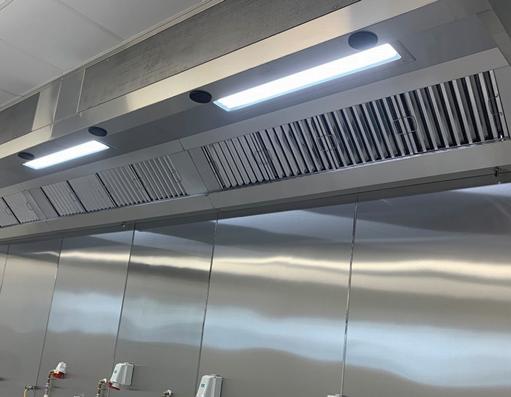
kitchen design service to help you build your ideal kitchen.
Projects undertaken have included Olympic Villages, Basildon Hospital, The Mitre Hotel at Hampton Court, The Truck Stop at Anglesey, The Lodge at Old Hunstanton, Colleges, Schools, Hotels, Restaurants and Public Houses. They ensure their systems are compliant with the current guidelines whilst maintaining an efficient and dynamic facility.
With extensive knowledge of manufacturing and installing ventilation systems, they can help you design the best kitchen within the space available.
They have strong relationships with all leading kitchen equipment suppliers, and they offer a
Call: 01926 887167, visit: www.caterquipventilation.co.uk, email: info@caterquipventilation.co.uk
that each pump operates for a shorter time and pump life is increased.
Both systems are fitted with a high-level alarm, allowing operators to know when a maintenance engineer is required even though they might not notice since there is no disruption to service.

The alarms also have volt free connections so they can be connected to a BMS system.
Contacting the Pump Technology Ltd team is simple and fast and allows customers to benefit from their knowledge to specify the best pumping solutions for any commercial kitchen.

Air Vent Technology offers three ranges of high temperature fans designed for installation into commercial kitchens. The “QBK,” the “QMF-HT,” and the “STR/MOS” can handle operating temperatures between 80ºC and 180ºC with performances from 0.10 m³/sec to 7.45 m³/sec, single and three-phase. For maximum durability, the motors are out of airstream, preventing overheating, reducing exposure to dirt and grease, and minimising maintenance and cleaning. All have acoustic linings to reduce noise breakout.

The "QBK" range comprises six fans and five sizes, single and three-phase. They have energy efficient, direct drive fans with backward curved centrifugal impellers. "QBK" units have flexible airflow configurations - straight through or 90º. Cases are of robust extruded aluminium frame in double skinned galvanised steel with a plastisol coated finish. All are fitted with energy saving controls. Attenuators, cowls, flexible duct connectors and weatherproof kits are available. The "QBK" range will operate in temperatures of up to 120ºC with perfor-
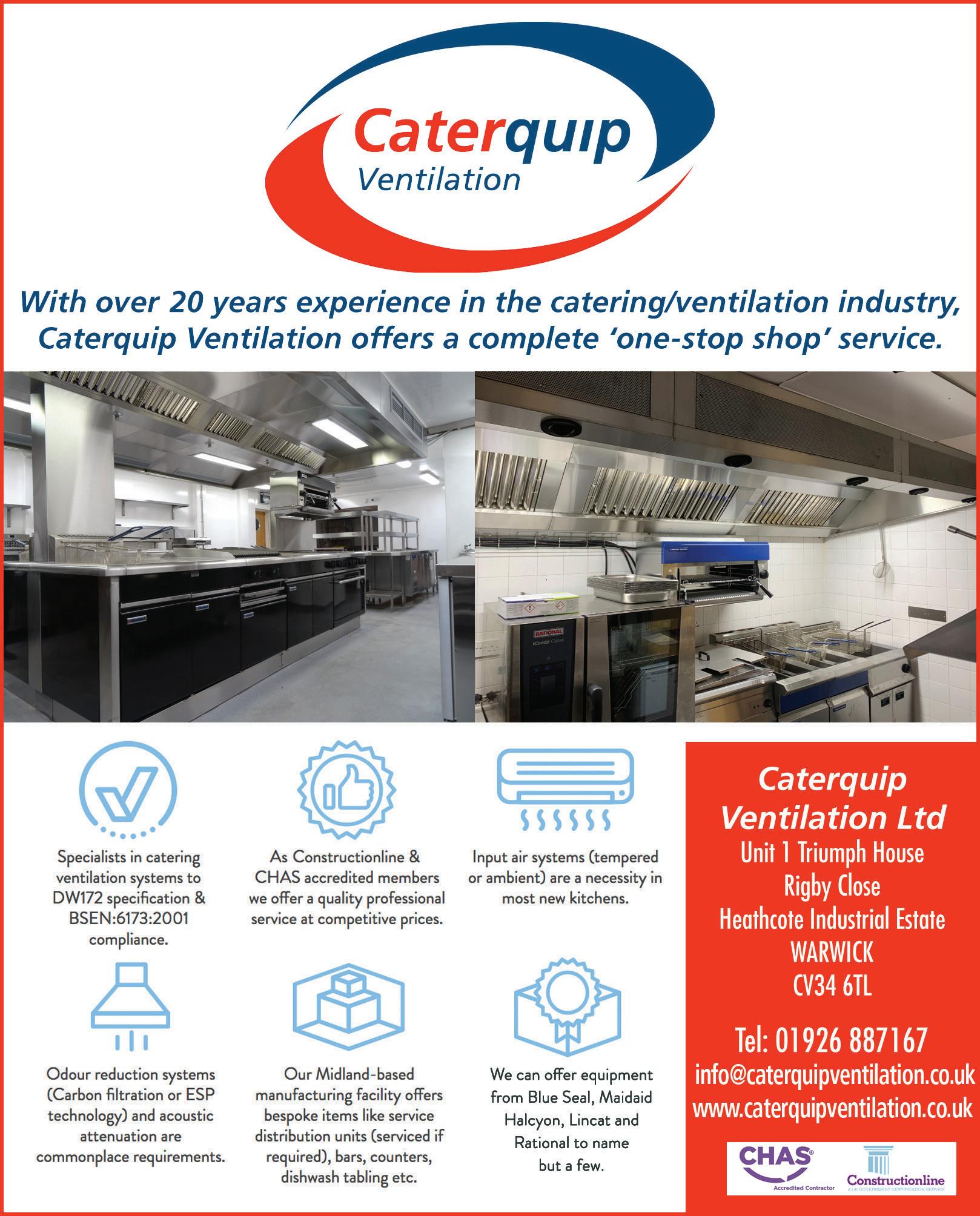
mances from 0.10m3/sec to 2.97m3/sec.
The “QMF-HT” range comprises nine sizes - single and three phase, four and six pole motors. They are continuous running in temperatures up to 180ºC with performances from 0.10 m³/sec to 3.40 m³/sec and are for ducted or direct installation. They are easy to install horizontally or vertically, inside or out.
The “STR/MOS” are continuous running in temperatures of up to 80ºC and can be installed internally and externally. There are two sizes, each with two motor ratings giving performances of between 2.00 m³/sec to 7.45 m³/sec. The “STR/MOS” are versatile with seven spigot options which can be set at installation. Air Vent Technology can design custom ventilation systems using these high-temperature fans to ensure optimal performance for any situation.
Tel: +44(0)1264 356415
Email: sales@airventtechnology.co.uk
Web: www.airventtechnology.co.uk

At Kitchen Clearance UK, we specialise in supplying top-quality refurbished and B-grade commercial catering equipment from some of the industry’s most trusted brands, including Rational, Lincat, Merrychef, Maidaid, Falcon, Foster, Blue Seal, and many more.

We carefully source only the best pre-owned commercial catering equipment, ensuring that each piece is fully refurbished to a high standard and rigorously tested by our expert engineers. All equipment can be viewed if required to see it working and see the quality of the item. We also supply B-grade catering equipment — items that may have minor cosmetic imperfections or have been
As a green business, we are dedicated to reducing waste in the catering industry by giving high-quality equipment a second life. Before disposing of any catering equipment, reach out to us, it’s not only better for your finances but also for the environment. Tel: 07790 612911 Email: kitchenclearanceuk@gmail.com www.kitchenclearanceuk.co.uk
Blue Seal have noticed over the last few years a definite increase and trend for modular suited cooklines, especially for front of house customer facing kitchens where there is a theatre element to the dining experience.
With the current sustainability/ high efficiency and carbon footprint directives, the requirement for electric equipment options to future proof and modernise the operations has become a priority. This expansion is predominantly for new site install, where the site has the power supply for 3phase and the operator is looking to future proof the kitchen and incorporate a full electric line up, including high efficiency induction hobs etc.
This complete electric specification also avoids the complication & cost of expensive gas regulation canopies and interlock systems. Electric equipment is also generally easier and cheaper to Install, routinely maintain, as well as having a longer life span in some cases. This encourages restaurants, Hotels etc. to invest in high efficiency, low carbon sites.
There has not, however been any downturn for demand on gas equipment in general, especially twin tank gas fryer units, chargrills, ranges and griddles. The

running cost of gas is on the increase, however there are a huge quantity of commercial kitchen sites in the UK that do not have the 3phase power supply to run a high-performance electric cook suite.
A more common general application is a balanced mix of high efficiency induction equipment and gas equipment such as char grills/ solid fuel grills/ high efficiency gas fryers, which give the operator a unique equipment performance or finish and flavour to food items. With most manufacturers investing their R&D into high efficiency technology & solutions, to replace gas equipment, long term there is no doubt that electric powered appliances are the future. www.blue-seal.co.uk
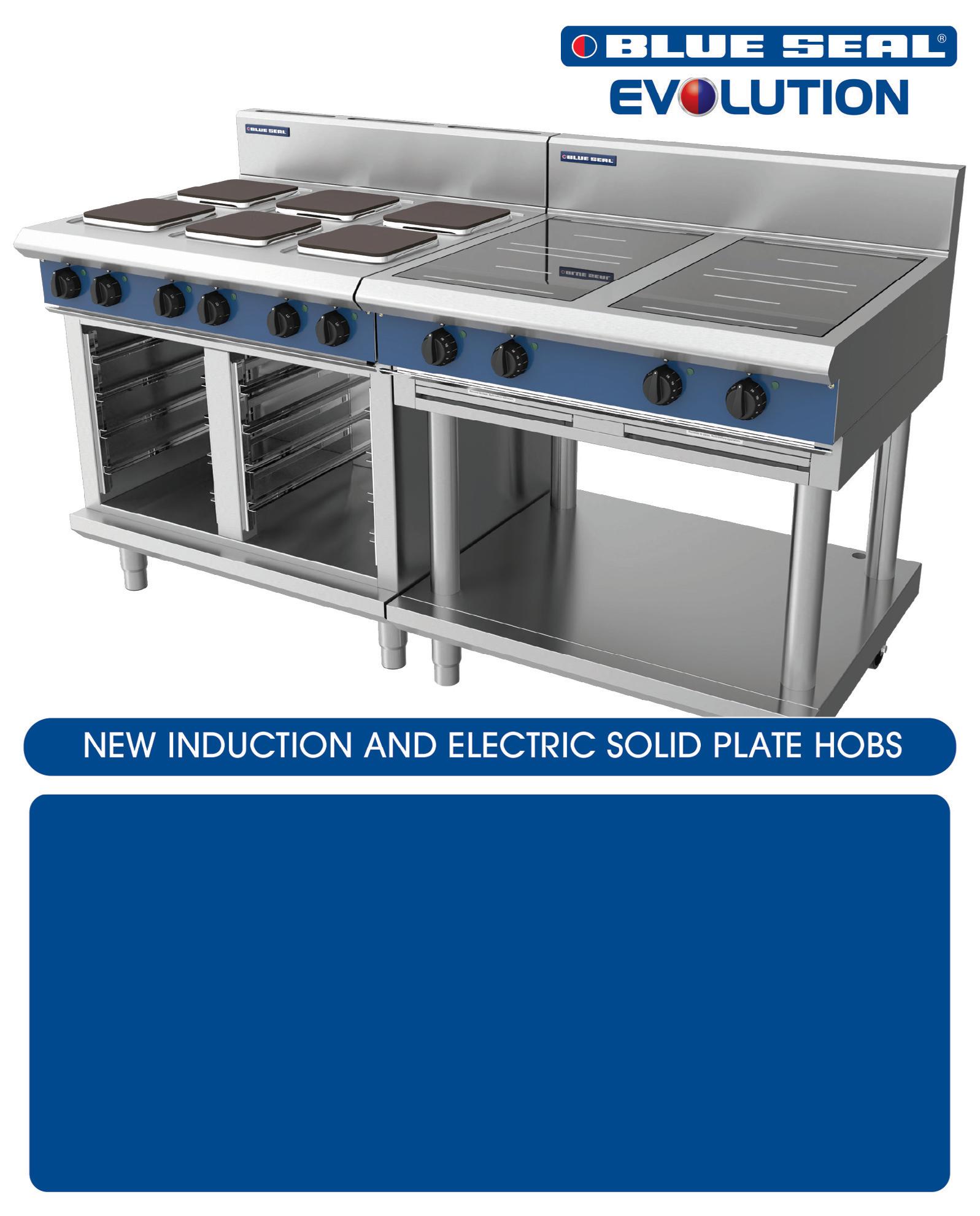


Rising costs, staff shortages, and shifting customer demands mean kitchen operators need to do more with less. And that’s where Alto-Shaam comes in.
Our pioneering Vector and Converge multi-cook ovens are transforming kitchen operations – giving you up to four ovens in one compact unit.
• Cook multiple food items – from meat, fish, cookies and cakes – at the same time with zero flavour transfer
• Deliver the highest quality and most consistent cooking results
• Control and update food menus anytime, anywhere with our ChefLinc® cloud-based management
In hospitality, speed, consistency and quality are everything. With fresh bread forming the backbone of countless staple dishes at busy hotels, bakeries and restaurants, slicing is a time-consuming bottleneck workers can do without. Whether prepping breakfast buffets, crafting elegant afternoon teas, or serving up artisan sandwiches, precision bread slicing matters.
That’s where MHS-Schneidetechnik comes in with its automated slicing technology. Designed for highdemand environments, MHS bread slicers bring over 30 years of German engineering to your kitchen. These machines offer slicing speeds of up to 220 slices per minute, with adjustable thickness down to 4mm, perfect for melba toast, rye, sourdough, and more.
From compact tabletop units to robust floor-standing models, MHS slicers fit seamlessly into hospitality spaces as narrow as 60cm. Built with hygienic stainless steel, easy-clean components, and GS-certified safety, they’re trusted by hotels, restaurants, bakeries, and catering operations across Europe. They are now available exclusively in the UK and Ireland through bakery equipment specialist EPP.
• Choose from stackable, waterless, ventless, and self-cleaning options to fit your kitchen requirements
Save space. Reduce labour. Cut costs. All without compromising on quality.
Discover Alto-Shaam's multi-cook oven range at www.alto-shaam.com or contact James Olbort, Alto-Shaam's UK Commercial Leader, directly at jameso@alto-shaam.com.
Fof further information, please see the full page advertisement on the back cover of this issue.
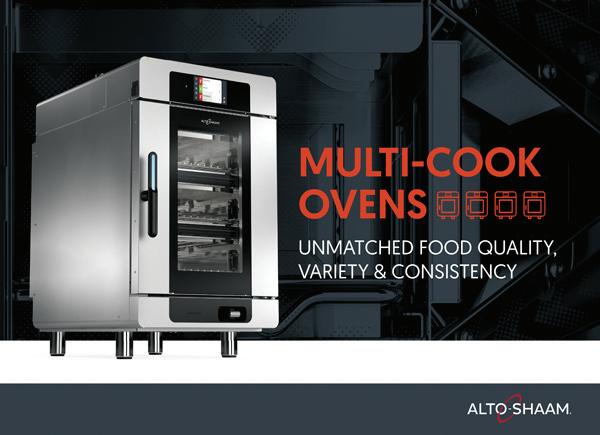
“Hospitality businesses need equipment that performs under pressure,” says Steve Merritt, Managing Director of EPP. “MHS slicers help automate prep, reduce waste, and deliver consistent results, saving time and money every day.”
Manufactured in Abstatt, Germany, All MHS models feature hygienic stainless-steel housing and easy-access components for quick cleaning. Its durable blades stand up to the rigours of hospitality and ensure quiet, efficient operation. Tabletop or floor standing models are available in a range of sizes, able to fit into hospitality spaces as narrow as 60cm.

Whether you're running a busy kitchen or scaling up production, MHS slicers are a smart investment in quality, speed, and reliability. Ready to upgrade your slicing game to cut costs and enhance productivity? Visit www.eppltd.co.uk to explore the full MHS range and take the stress out of slicing.
See the advert on the facing page for further information.
For 33 years, Aluline has solved the hygiene and compliance challenges that “automatic” boxes promise—but rarely deliver. We design, manufacture, install, and maintain stainless-steel grease traps and biological dosing systems (no enzymes, no gimmicks) that keep commercial kitchens flowing, odour-free, and fully compliant across the UK.
Every site is different. That’s why our engineers size and configure each trap to your actual volumes and fixtures, then pair it with biological dosing—naturally occurring bacteria that digest fats, oils, and grease (FOG) at source without pushing grease downstream. The result is less scraping, fewer callouts, and stable effluent quality that satisfies landlords, water companies, and environmental teams. Because we build what we install, our units are robust, serviceable, and built to last—from compact under-sink separators to heavy-duty, in-ground interceptors


• Be ready for your inspections
• Damaged fridge seals are unhygienic
• Make your fridge more energy efficient with a good seal on your fridge
• We provide custom seals for cold rooms, discontinued models, and units with no identification information
• Next-day delivery service
• Discounted prices on large orders WhatsApp,
for high-throughput sites. And with UK-wide maintenance plans, alarm options, and clear service records, we help operators prove compliance and avoid costly disruption.
If kitchen hygiene is mission-critical, don’t gamble on small plastic “automatic” gadgets and enzyme quick fixes. Choose the team that’s been on-site, in kitchens, and under sinks for over three decades—Aluline: engineered solutions, expert installation, and lifetime support.
Aluline — Design. Manufacture. Install. Maintain. Comply. www.alulinegreasetraps.com | enquiry@alulinegroup.com | 01928 563 532

discover a better way to do business. We are here to help you.
www.fridgesealsdirect.co.uk
At TheCommercialOvenStore.com, we know that the heart of any professional kitchen is a reliable, high-performance oven. That's why we offer an extensive range of ovens from the world’s leading brands –including Blue Seal, Lincat, Unox, Rational, and Merrychef.
Whether you’re running a bustling restaurant, a cozy café, or a fast-paced catering business, you’ll find the ideal solution with us. Our selection includes powerful gas and electric ranges, versatile combi ovens, highefficiency speed ovens, and durable convection ovens, alldesigned to keep your kitchen operating at peak performance.
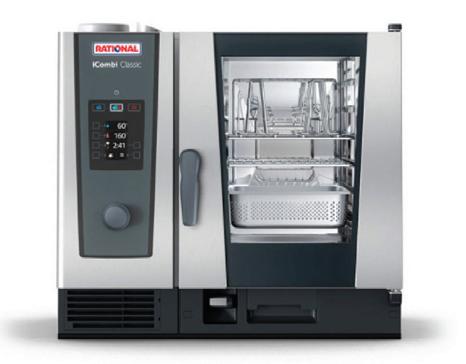
Explore cuttingedge features, energyefficient designs, and trusted engineering – all in one place. From compact units for smaller kitchens to heavy-duty systems for largescale operations, we make it easy to find the right fit for your needs and budget. Expert advice, competitive prices, and trusted brands – all at TheCommercialOvenStore.com Get the equipment you can rely on, and take your kitchen to the next level. T 0207 965 7502

The new versions of Williams top of the range Jade refrigerated counters are ‘best in class’ when it comes to energy efficiency. Although there are other refrigerated door counters with the same A+ grading, the Jade models have the lowest kWh figures on the market. They also have a smaller footprint, giving even greater versatility in installation, while the multiple options available mean that operators and designers can customise their counter so that it exactly fits their application.
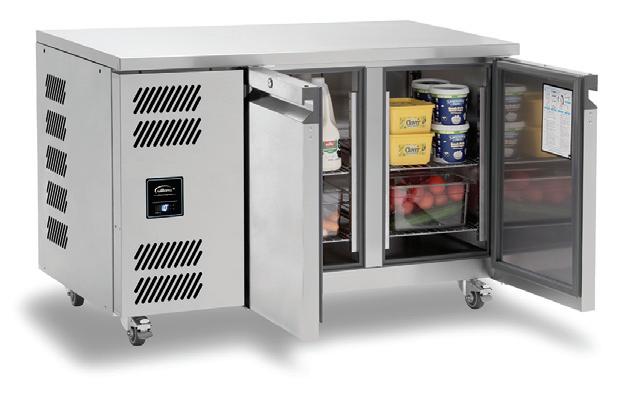
less than its predecessor – it’s now just 1,338mm wide, compared to 1,400mm. Meanwhile the four-door JC4 is 98mm less, measuring 2,262mm. The depth, 700mm, and the height, 857mm, are the same for all three Jade models. Their ‘squeeze-ability’ is further enhanced by the fact that they can fit into the tightest spaces as they need no ventilation gaps at the back, top or side, thanks to their front breathing refrigeration system, which has a fully automated, air-cooled condensing unit.
The Jade counters have a variety of energy saving features and components. They include Willams’ updated CoolSmart controller, which monitors operation and internal temperature, minimising energy by only running the system when it’s required. Its sleek new capacitive touchscreen is highly sensitive and accurate, using clear visuals, including a bright white temperature display, to help staff check the operating status at a glance. Since it is IP55 rated, the screen is both water- and dust-proof.
The Jade counters use a natural refrigerant. As well as enhancing energy efficiency, this makes them a truly green choice, with low GWP and zero ODP. All Jade models offer premium performance, being tested to Climate Class 5 and capable of operating efficiently in ambient temperatures up to 43°C.
The Jade’s customisability is exceptional. Williams can offer a huge range of options so that the specifier can get exactly the counter they need for their precise application. They include raised pan holders and cut out wells to hold ingredients as a prep station; drawers instead of doors, in banks of either two or three; and a choice of counter height. Both refrigerated and freezer Jade counters are available in three sizes, two-, threeand four-door, with capacities of 317 litres, 469 litres and 622 litres respectively. All are designed to accommodate 1/1 GN shelves.
The Jade’s reduced footprint will help designers tasked with squeezing more productivity out of the kitchen. For example, the two-door JC2’s width is a full 62mm
The noise level output across all new Jade counter models is also significantly reduced compared to their predecessors, which is especially beneficial for open plan kitchens.
For example, standard refrigerator models such as the HJC3 have a noise level of just 50 dBA compared to 63dBA of the equivalent predecessor. A 13 dBA reduction in noise level means a noticeable decrease in perceived loudness, roughly equivalent to halving the perceived sound.
Meanwhile the superior usable capacity means that the two door counter can hold up to 186 litres, while the three door HJC3 can store 280 litres – significantly more than its market competitors.
The ‘easy grab’ full length door handle is both an attractive feature and a practical one, since it makes opening the counter easy with one hand. Indeed, the Jade’s design is all about making life easier for the chef. For example, its durable construction ensures it can stand up to the toughest kitchen environment, while shelving and racking is easy to remove for cleaning. Meanwhile the Jade is also a good looking model, as suitable for front of house as for the kitchen.
List prices for the new Jade counters are the same as for their predecessors, starting at £4,370 for the JC2 refrigerator.
To learn more about Williams extensive product range visit www.williams-refrigeration.co.uk



Your venue’s outdoor furniture may be packed away until warmer days return, but if some of it isn’t fit to see out another summer, why not take advantage of the great offers currently available on our contract grade outdoor furniture? As well as taking the opportunity to save now, don’t forget there’s no need to store it away for next year as these stylish and versatile tables and chairs can also be used inside your venue!
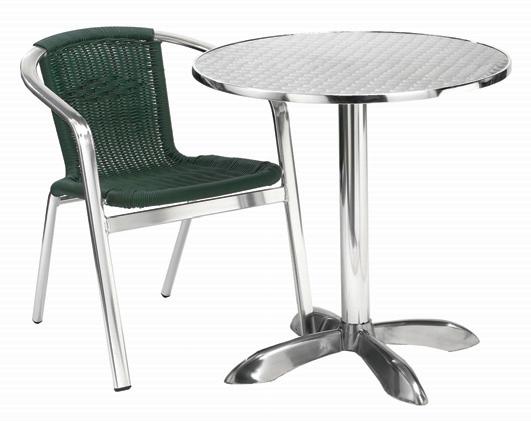
The Alma Aluminium Table currently has 15% off both the square and round versions. Rust and water resistant when used outside, its stylish modern design means it’s just as at home inside cafés, bars and conservatories. If you prefer a wooden table top, take a look at the Capra Table. Again available with a square or round tabletop, its weather-resistant aluminium base and attractive synthetic teak top makes it a solid option, both indoors and out.
These tables look fantastic paired with most chairs, but they work
particularly well with our bestselling Monaco Stacking Chair, which again is built for the great outdoors, but looks just as good in an indoor setting. Don’t miss the chance to snap it up for 10% off it in aluminium, wood effect, or eye-catching green or red wicker.
Our ever popular Plaza Chair is also available with 10% off for a limited time, both as a side chair and an arm chair. Made from rust-resistant steel frames and goes-with-anything synthetic black rattan, this chair looks great indoors following a summer in your outdoor seating area. And just like all our stacking chairs, its lightweight frame means it’s easy to store when not in use.
Call our experts on 0116 286 4911 or email sales@trentfurniture.co.uk to take advantage of these great deals.
See the advert on this page for other offers.

From busy pub gardens to stylish dining terraces, the right outdoor space isn’t just extra seating—it’s extra revenue. For over two decades, AEL Outdoor Solutions has partnered with independent operators, multi-site groups, and national pub companies to turn outdoor areas into high-performing trading spaces.
We design, manufacture, and supply a wide range of outdoor furniture, structures, and equipment—combining style, durability, and practicality so you can maximise covers, extend trading seasons, and create spaces that encourage customers to stay longer and spend more.
MADE IN READING – SOURCED FOR QUALITY

Many of our products are crafted at our own Reading facility, giving you control over customisation, lead times, and quality. We also work with trusted manufacturing partners to expand our range and deliver the best value. From booth seating and benches to planters,
shelters, and dining sets, every item is selected or made to meet the demands of busy pub and hospitality environments.
“We work with your budget and brand, producing 2D designs and visuals so you can see exactly how your outdoor space will look before committing,” says Laura Gardiner, Head of Marketing. “Whether you run one site or a national estate, our tailored seating, tables, and structures are built for your customers and your trading needs.”
Everything You Need for a Profitable Outdoor Area
Our range spans everything from contemporary seating and dining furniture to shade structures, shelters, and outdoor solutions, complemented by heating, lighting, and safety features. We also offer play equipment that encourages imaginative, active fun while meeting the highest safety standards, ensuring each space is both functional and inspiring. We also offer bespoke solutions to match your brand and venue style—whether for a single garden or a full estate rollout.
BUILT FOR PEOPLE, BUILT TO LAST
We prioritise responsibly sourced materials and design for longevity—reducing replacement costs and supporting your sustainability goals. All products are chosen or built to meet strict hospitality standards for safety, comfort, and performance.
FROM CONCEPT TO COMPLETION

From free quotes to full installation, our design, manufacturing, and sourcing teams keep projects on track, on budget, and exactly on brief—whether you need a quick refresh or a large-scale rollout.

EXPERIENCE OUR 10,000 SQ FT SHOWROOM
See our products in real pub-garden settings at our Reading showroom, or browse online at www.aelsolutions.com. With over 20 years’ experience working with the UK’s top pub companies, we know how to create outdoor spaces that boost trade in all weathers.
Email: sales@aelsolutions.com
Download your brochure: www.aelsolutions.com
AEL Outdoor Solutions – Your partner for profitable, allweather trading spaces.
The UK outdoor furniture market is heavily influenced by changes in weather conditions, with consumers more likely to purchase picnic benches during periods of good weather. MG Timber specialise in the manufacturing and supply of high-quality wooden picnic tables. Their picnic tables are made from high-grade timber and are designed to withstand the harsh outdoor elements.

Crafted from the finest Swedish Redwood, each piece is expertly pressure treated to ensure longevity and protect against the elements. Renowned for their robustness, our treated wooden

As autumn's golden leaves begin to fall and winter's chill approaches, the UK hospitality sector faces a question that would have seemed absurd a decade ago: how do we keep our outdoor spaces thriving through the colder months?
The transformation has been remarkable. British diners and drinkers have finally embraced what our continental neighbours have known for generations: there's something magical about dining al fresco, regardless of the weather. From Manchester to Margate, pavements and beer gardens that once lay dormant from October to March are now buzzing with activity throughout the year.
This cultural shift represents more than just changing consumer preferences. For operators, weatherproofed outdoor spaces have become a genuine revenue driver. Additional covers mean additional turnover, and with indoor capacity often stretched during peak periods, outdoor areas can significantly boost the bottom line. Many establishments report that well-appointed outdoor spaces can increase overall capacity by 30 to 50 percent during shoulder seasons, translating directly into enhanced profitability.
The numbers speak for themselves. Operators who have invested in quality outdoor infrastructure report extended trading hours, improved customer satisfaction, and crucially, a competitive edge in increasingly crowded markets. When customers can comfortably enjoy a pint or Sunday roast outside in November, they're more likely to choose your establishment over competitors still shuttering their terraces.
Today's hospitality supply market has evolved to meet this demand with sophisticated solutions. From sleek patio heaters and elegant fire pits to retractable awnings and stylish outdoor furniture built to withstand British weather, suppliers now offer comprehensive outdoor dining systems suitable for any establishment.
We
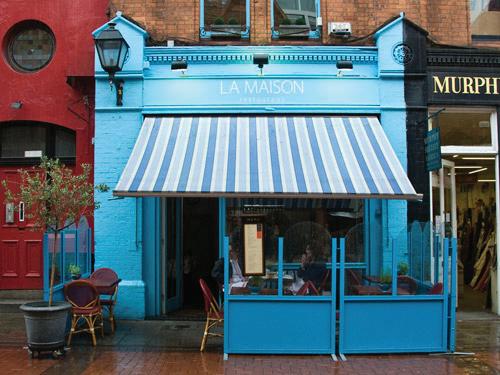
Our hardy planters are built to order using rot proof artificial wood planks. This unique material is not only completely waterproof but is formed from UK
factory waste plastics and materials that would otherwise have gone into landfill. They will last you countless years and are a genuine recyled investment.
From our workshops in Kent we deliver UK wide and are happy to visit and survey your site to to discuss your needs and prepare a drawing and quotation outlining what could be done, all within your available budgets.
We firmly believe the better you look on the outside, the more customers will come to the inside so contact us on 01733 559437 or sales@cafeculture.biz

Whether you're running a traditional country pub or a contemporary urban restaurant, there are products designed to enhance your outdoor offering whilst complementing your brand aesthetic.
Quality outdoor heating, lighting, and shelter systems have become more affordable and energy-efficient, making year-round outdoor operation economically viable even with rising energy costs.
As we move into autumn, the message is clear: outdoor dining isn't just for summer anymore. The operators who recognise this and invest accordingly will find themselves well-positioned to capture additional revenue streams whilst meeting evolving customer expectations. The great British outdoor dining revolution is here to stay, and the only question is whether your establishment is ready to make the most of it.
For more than twenty-five years, Gala Tent has been helping Britain’s hospitality industry get more from its outdoor areas — from boutique hotels and wedding venues to bustling pub beer gardens and live-event spaces. Based in South Yorkshire, the award-winning manufacturer is the UK’s leading supplier of heavy-duty pop-up gazebos and commercial marquees, renowned for its commitment to quality, innovation, and long-term value.
As customer expectations evolve, outdoor dining and entertainment spaces are no longer seasonal luxuries but year-round essentials. Traditional marquees remain the classic choice for larger spaces, but the new generation of heavy-duty pop-up gazebos offers a faster, larger, and much more flexible alternative.
Gala Tent’s flagship Gala Shade Pro 60 is the largest and strongest pop-up gazebo in the country, available exclusively in 6m × 6m and 4m × 10m sizes — giving hospitality operators the same generous coverage as many marquees, but with setup measured in minutes rather than hours.
These aluminium-framed structures are designed for continuous commercial use, providing reliable

shelter for alfresco dining, functions, or bar service in any weather. Multiple units can be seamlessly linked to create elegant modular layouts, while optional branding, lighting, and heating accessories allow venues to tailor each space to their style and season.
By investing in professional-grade pop-ups, hotels, restaurants, and bars can extend capacity, host private events, and increase revenue without the labour or downtime that traditional marquees demand. Discover how Gala Tent can transform your
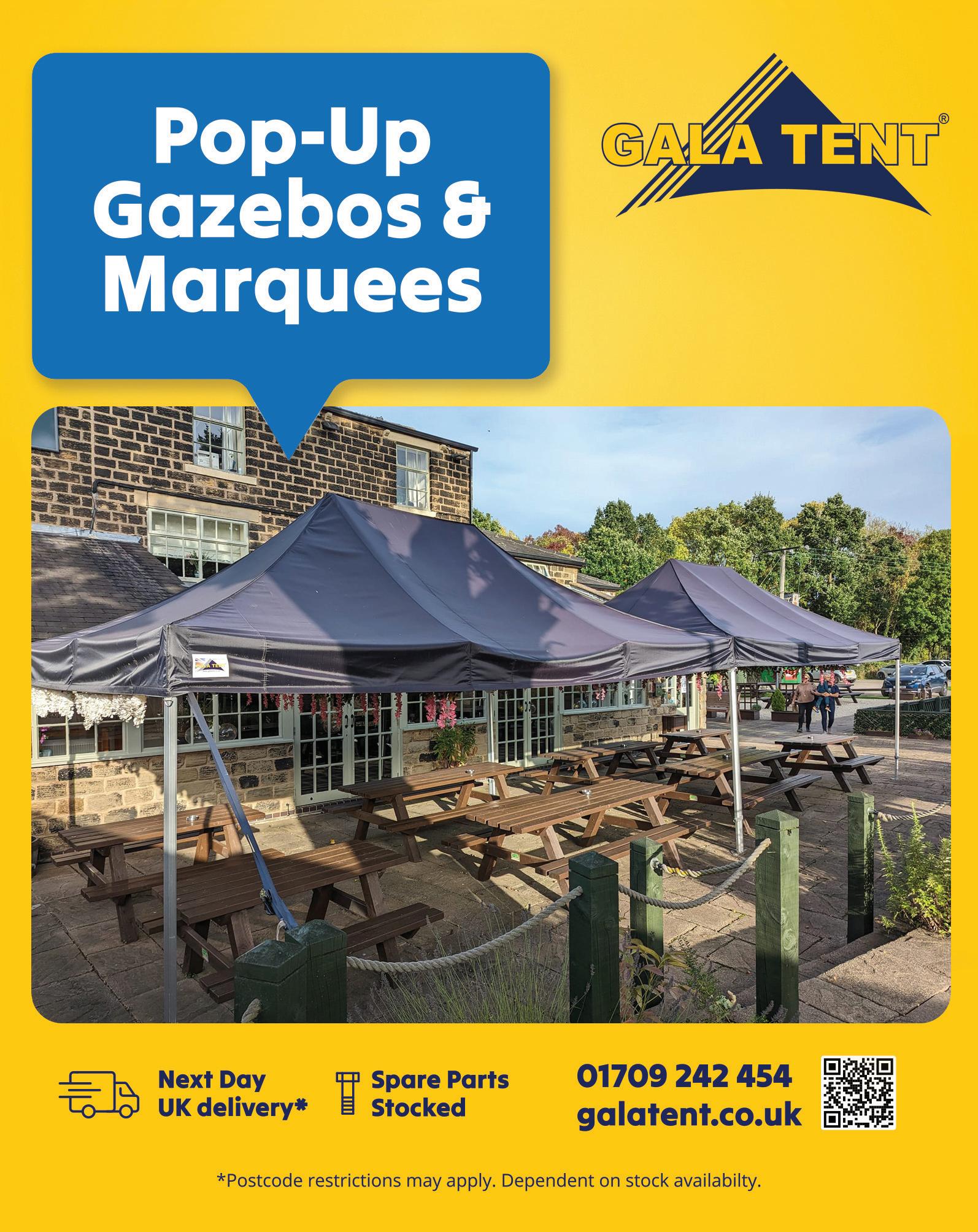
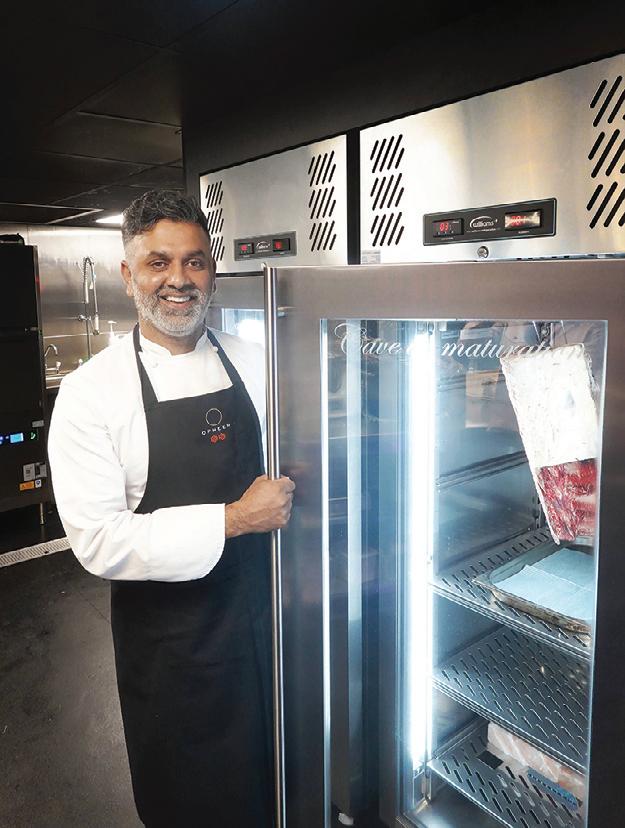
Two Michelin-starred chef Aktar Islam pushes the possibilities of food ageing in pursuit of flavour with Williams meat ageing refrigerators
Opheem is the only two Michelin star restaurant in Birmingham, and one of just two Indian restaurants in the UK to achieve this. At its core, this level of fine dining demands a seamless synergy between quality ingredients, technique and personality. Aktar Islam, chef and proprietor of Opheem, explains it simply. “We’re in a business of flavour. Any process which we adopt has to be for that reason.”
The restaurant’s menu focuses on seasonal British produce but through the culinary practices, history and flavours of Indian cuisine. It combines classic approaches with modern techniques and aesthetics. For Aktar, Opheem’s marriage of cultures is emblematic of its setting, his home city of Birmingham.
“I think over the last sixty years one thing Birmingham has always been good at is adopting new cultures,” says Aktar. “The food scene here is incredible. To be part of that is really important to me.”
Growth is at the heart of Opheem, having transformed its kitchen three times since its opening in May 2018. In light of this, and the importance of using dry-aged ingredients on the menu, Opheem recently purchased three Williams meat ageing refrigerators.
“I think the decision to install three Williams dry-agers into the kitchen is important. It’s very much part of the journey we’re on,” says Aktar.
Before installing the Williams meat ageing refrigerators, Opheem would often rely on its suppliers to dryage its proteins. This had its limitations as the level of customisation required was not always possible. The team would often end up with “makeshift” dry agers, particularly when ageing fish. Upon installing the three
J&E Hall cellar coolers are playing a significant supporting role as the popularity of the Boom Battle Bars entertainment chain gathers pace.
While games such as axe-throwing, crazier golf and augmented reality darts are proving to be a major draw, quality food and drink also contribute to a formula with a multigenerational appeal.

The business opened its first venue in Norwich in December 2020 and has grown steadily since. Boom Battle Bars are a high-volume business serving a lot of draught refreshments, so quality cellar cooling is essential. Having a very good cooling system for the customer-facing area is critical to the experience that the customers expect.
Heat Recovery (HVAC) has installed J&E Hall cellar cooling equipment in a dozen venues so far. Coowner Mike Higginson says: "In mid-2020 I had a call from one of the Boom Battle Bar designers who I had done a lot of work for over the years –
presenting a great opportunity. We became involved in work at the Liverpool bar in late 2020 during lockdown and it all went on from there. We have installed J&E Hall cellar cooler equipment of varying sizes and specifications in a dozen venues so far. The units are good quality, easy to use and maintain. They are a very good product for the price range."
Ideal for beer cellars and other applications down to 4°C, J&E Hall’s complete range of cellar coolers provide a cost-effective and reliable solution to maintain specific temperatures required for beer and wine cellars.
Boom Battle Bars is the market leader in a new entertainment concept, competitive socialising, offering games including American shuffleboard, augmented reality darts and axe-throwing as well as conventional pool and beer pong.
See the advert on page 3 or visit www.jehall.co.uk for details.

With over 60 years experience of UK manufacturing for the beverage dispense industry, Universal Dispense Systems (UDS) have an unrivalled reputation in the design and manufacture of a large range of dispense fonts, taps and beverage dispense systems which are designed and manufactured in the UK and exported worldwide.
From the clean lines of the Eco Tube Font to the hand-crafted Artisan range of fonts, there is something to fit every theme and concept. If you require a bespoke font, we are able to create customer specific designs to meet your requirement and these are avail-
able in a full range of finishes and branding options.
Our range of fonts have been specifically designed and hand-crafted at our London based manufacturing facility to meet the ever-growing need for brands to stand out from the crowd. Reflecting the heritage of both established and craft beer brands along with providing stylish fonts that are at home in today`s marketplace.
Our range of stainless-steel taps are available in free flow or with flow control capabilities. All our taps are precision engineered using the highest quality materials and manufactured at our purpose-built engineering facility in London. Contact us here for more information or a quotation- sales@universaldispensesystems.com For further information see the advert on page 5.
Williams meat agers, all dry-ageing was able to move in-house.
“Now we dry-age all our proteins. We have control over the entire process.”
Of the three Williams meat ageing refrigerators currently installed, one is used for poultry, another for beef, and the third for fish. All require different conditions and so flexibility and control is essential. For Aktar, the Williams units allow for this.
The equipment at Opheem was supplied by Vision Commercial Kitchens Limited. Aktar’s relationship with Vision is longstanding, having worked with the company’s managing director, Jack Sharkey through multiple projects over the last fifteen years. The kitchen at Opheem has itself had three renovations in a six year period since its opening in 2018, and for Aktar, Vision has been on board every step of the way.
While other meat agers are available on the market, Aktar chose Williams Refrigeration. “I’ve always opted for Williams Refrigeration because I find it to be very dependable. That’s really important when it comes to refrigeration.”
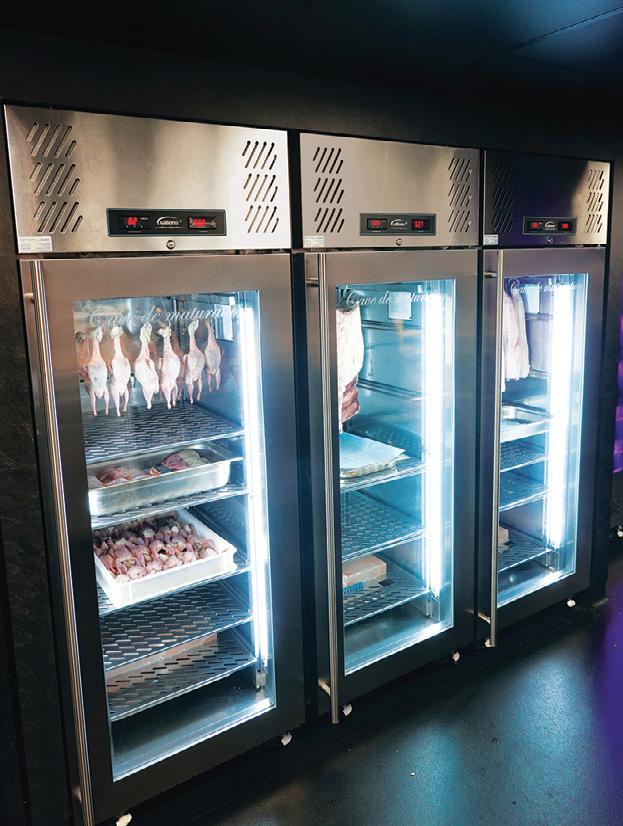
“I think because Williams is a British product manufactured in Britain, if I ever do have any issues, it’s all there. Labour, service and after care; they’re always able to support you.”
"I’ve been behind this movement for well over two decades and the Williams Meat Ageing Refrigerator is something I wholeheartedly recommend. I think your customers will love it.”
Williams Refrigeration offers a comprehensive range of commercial refrigeration including gastronorm cabinets and counters, specialist bakery equipment, coldrooms, multidecks and blast chillers.
To learn more about Williams extensive product range visit www.williams-refrigeration.co.uk.
Based in Chorley, Lancashire the team at Eat My Logo Limited strive to make brands tasty. Every week they send tens of thousands of branded food items to business around the UK to help them promote their brand in a fun and tasty way.
With a wide range of products that include cakes and biscuits, confectionary and chocolate, there is plenty to choose from to meet the needs of your business.
Eat My Logo bake their own cake and biscuit

CLEAN Linen & Workwear are one of the UK's most trusted laundry companies. They supply tailored workwear solutions provided by real people. Their comprehensive laundry network means they can service customers throughout England and Wales, providing chefswear, workwear and linen rental services. Whether you operate from a single-site hotel, pub or restaurant or have multiple locations, CLEAN can tailor a workwear rental solution to suit your business requirements. They offer various uniform options to support the entire kitchen brigade, from Executive Chefs to Kitchen Porters.
ranges, many of which are decorated with high quality edible branding images, printed directly into fondant icing. Customers can buy the finished product or just the fondant toppers to add to their own decorations.
Their chocolatiers create delicious, branded chocolate bars and chocolate boxes using high quality couverture chocolate. These unique chocolate products are ideal hotel room favours, whether branded with an edible logo or a small pack of truffles.
A growing confectionary range offers a choice of traditional sweets, packed in small eco friendly bags that are branded with your own brand or logo. You can also choose from tubs, jars and tubes. With low minimum order quantities and competitive prices, they can offer a great range of products to add that extra special touch to your hospitality offering.
For 25% OFF YOUR FIRST ORDER, please register your details via the QR code. www.eatmylogo.co.uk
emlsales@eatmylogo.co.uk
01772 472 580 See the advert on page 7 for details.

over your contract, and ensure quality and care with every wash. Delivery is free, and there are no hidden charges; contracts even include repairs. Each item of clothing can be branded and tailored to the wearer with logos and embroidery. Their managed service prevents issues compiling when supplying your team with work clothes; a convenient locker valet service helps distribute and store uniforms, and they tackle minor repairs early to extend the service life of a uniform. Ultimately, this avoids costly replacements wherever possible as it reduces uniform losses, and uniforms only need replacing when a repair is not safe or cost-effective.
With their workwear rental service, you can say goodbye to the hassle of purchasing, storing, and maintaining chef and kitchen uniforms. Instead, enjoy the convenience of a hassle-free rental system that provides freshly laundered garments whenever your team need them. By renting with CLEAN, you can avoid upfront purchase costs, spread the payments
With CLEAN's workwear rental and laundry service, business owners can focus on what matters most — running their business — while CLEAN takes care of the rest.
To find out more: www.cleanservices.co.uk or see the advert on page 3.
Saniflo is pleased to announce the launch of the brand new Clear Water range — a complete line-up of innovative pumps designed for the collection, distribution, and pressurisation of clean water. Building on over 70 years of expertise in wastewater management, Saniflo’s Clear Water range now offers robust, sustainable solutions for clear water applications, including jet pumps, booster pumps, submersible pumps and underground lifting stations. Whether it’s for rainwater collection, garden irrigation, draining basements, or boosting water pressure in domestic systems, the Clear Water range has a high-performance product to suit every need.
Sanijet is a range of 5 stainless steel centrifugal surface pumps optimised by a Venturi (jet) system for increased suction up to 8m. Automated for ondemand and self-priming for a simple start, the pumps have a max head between 50 and 54m and max flow rate from 3.6m³ up to 5m³.
SaniMHP is a 10-strong range of multi-stage surface pumps ideal for irrigation, rainwater use and water supply. From the 4-40 through to the 9-50 PC4 model offering max head ranges from 40m to 52m and max flow from 4m³ to 8.7m³, there is a model that will tackle pretty much every clean water movement requirement.
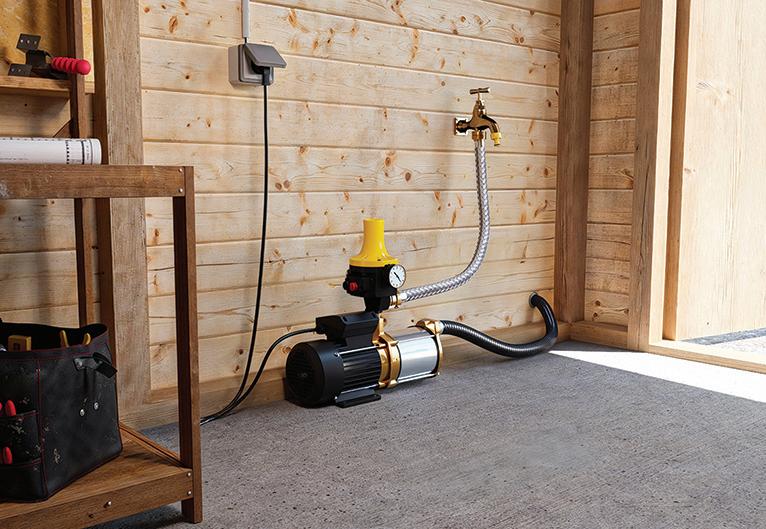
With 4 models in the range and max head capacities between 40 – 54m, the new Saniboost range is a domestic booster pump ideal for optimised and smooth water supply. Max flow from 3.6m³ to 5m³ ensures there is a model to increase and regulate the pressure of water collected in most sizes of domestic water tank and the units operate automatically and are particularly suited for low-flow consumption. A Saniboost includes a buffer tank that limits the frequent starts and stops of the pump to which reduces noise disturbances and wear on the product. Each model offers guaranteed service pressure on drip irrigation installations
Mayfair Furniture will be celebrating 12 years this year of providing the UK’s fastest and affordable commercial furniture. Supplying all kinds of establishments from high end hotel chains to small local takeaways.
We keep in stock a huge variety of items ready for immediate dispatch, and can fulfil a wide range of bespoke orders. We deliver to all areas of the UK, Ireland & Europe. We are not just a supplier; we understand that from time to time hospitality and leisure establishments
or automatic flush mechanisms.
Sanisub is a family of submersible pumps designed for a variety of applications including flood recover, basement drainage, rainwater re-use and, in some cases, light commercial operations.
With flow rates between 9–15m³/hour and heads up to 11m, Sanisub models like the ZPK, 800 Rainkit, and Steel + Emergency Kit provide powerful, reliable water management for challenging environments.
The Sanifos range offers two pre-assembled lifting stations with 110L and 280L capacities for the management of grey or treated water. With four inlets, flow rates up to 14m³/hour and heads of 7-10m the robust Sanifos can be discretely installed underground to move water from buildings, garden rooms and multiple small units – such as pods.
From a sustainability perspective, the Clear Water range promotes responsible water reuse and offers eco-conscious solutions that support the full water cycle—from collection and storage to redistribution. By enabling the reuse of grey water and alternative water sources like rivers, pools, and rainwater, these pumps help reduce demand on treated mains supply.
The addition of the Clear Water means that Saniflo is now a one-stop-show for all water management requirements; offering complete solutions for both wastewater and clean water applications. Whether you need to flush, drain, or pump — above or below ground — Saniflo provides easy-to-install, reliable systems designed to perform automatically with minimal maintenance.
To learn more or download the Clear Water brochure please visit www.sfasaniflo.co.uk



Looking to invest in new furniture for your venue ahead of the festive season? Now’s the time to act, because right now we have some fantastic discounts on some of our all-time bestsellers.
Thanks to its timeless style and contract-grade durability, the Sorrento Chair is a firm favourite for restaurants, bars, cafés and more. Currently available with 10% off most of the range, you can choose from chic upholstery to match your décor scheme or low maintenance faux leather in a choice of five colours.
The crowd-pleasing Washington Side Chair in three wooden finishes now has 10% off, and you can save 15% if you choose to add an upholstered seat pad in a vast choice of fabrics. For a more modern take on this classic design, opt for the Black
Metal Washington Chair which is available with 20% off for a limited time. And with a 10% reduction, you can also save on the Tall Black Washington Stool to pair with your poseur tables.
Need a lightweight stacking chair? The York Crossback Stacking Chair is a hugely popular choice as it offers stylish design with the benefit of easy storage. Choose from four wooden finishes with a fantastic 20% off.
When it comes to tables, nothing says classic design like a shaker style table, and with 10% off, now is the perfect time to update your tall tables with our Rectangular Shaker Poseur Table and Square Shaker Poseur Table. Choose from two solid rubberwood top sizes in light oak, dark oak or walnut to find the perfect finish for your space.

Don’t miss this opportunity to acquire these classic favourites for less. To find out more or to place an order, give our expert team a call on 0116 286 4911 or email sales@trentfurniture.co.uk
Have you recently taken over premises, just fancy a change or need to replace your tired old fixed seating and fixtures? At Drakes, we can help you realise your dreams with our bespoke furniture design service. Every week we build new tailor-made furniture up and down the UK, working with owners to come up with design concepts for fixed seating, booths and even bars and fixtures. We can take ideas from you, or your interior designer, or we can design something ourselves, all done efficiently, with professional quality and on time within budget.

Our service provides a unique opportunity to make your establishment stand out from others and add additional comfort for your customers.
We have been providing bars, pubs, restaurants, cafes, clubs, and hotels with high-quality furniture and fixtures for decades. We employ over 15 joiners, upholsterers, polishers and designers who are capable of installing fixed seating and bespoke joinery, new bars and full refurbishments, or simply making stools for the front of the bar, or providing quality tables that last. Our dedicated team are either time-served officially trained craftsmen or externally based professionals.
Got you interested? We are available for a chat on 01422 839 690. If you prefer, email us at sales@askdrake.com, and of course please visit our website www.askdrake.com
MST AUCTIONEERS Ltd specialise in handling & auctioning a wide variety of goods.
We act for Insolvency Practitioners, Receivers, Bailiffs and Solicitors as well as large PLCs.
We are members of The National Association of Auctioneers and Valuers (NAVA).


For the past 25 years, we've provided a unique disposal service tailored to suit, liquidators, banks, receivers as well as private and corporate vendors. We carry out probate valuations and conduct complete house and commercial clearances.

We have the largest Auction venue in the South of England. Our regular monthly Auctions occupy 45,000 sq.ft. of undercover space, selling over 2500 lots from 3 rostrums over two days.
We also hold regular Auctions ”On Site” and "On Line" Visit www.mstauctioneers.co.uk for further information.

In hospitality, design is about more than aesthetics – it’s about how spaces function. Fitouts and refits merge creativity and practicality to deliver spaces that reflect brand identity while ensuring operational efficiency. One often-overlooked element in this equation is the lift.
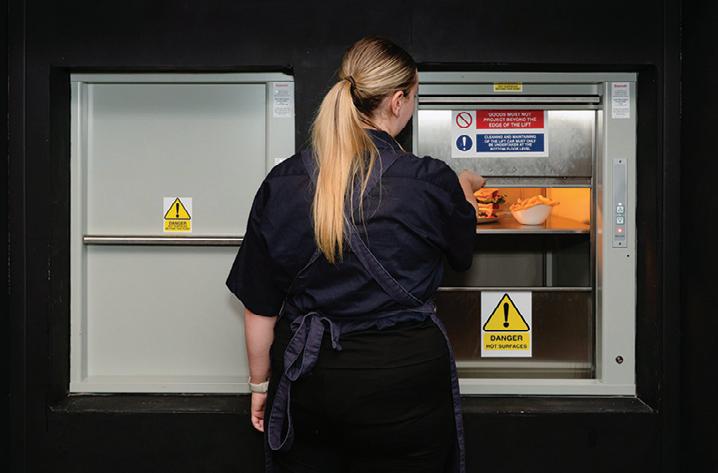
In a thoughtfully designed fitout, lifts enhance the guest journey:
Accessibility: Ensuring every guest, regardless of mobility, can move through the space with ease
Flow: Supporting smooth movement of guests and staff, especially during peak periods.
Experience: Modern lifts fit easily into refits with minimal disruption, offering whisper-quiet rides that reflect a brand’s premium feel.
Luxury venues may feature bespoke lift interiors, mirrored walls, soft lighting, even curated music, while boutique spaces offer compact and characterful designs to blend seamlessly into the aesthetic.
Behind the scenes, service lifts work tirelessly. Microlift dumbwaiters, with their compact footprint, are ideal carrying food between floors. Larger trolley & goods lifts handle roll cages, trolleys, and pallets, forming the backbone of back-of-house operations.
These systems enhance logistics, improve staff productivity, and meet Health & Safety and manual handling standards.
DESIGNING FOR THE FUTURE
Lift placement and performance can influence everything from guest satisfaction to staff efficiency. Modern platform lifts and configurable dumbwaiters offer flexible installation options without the need for pits or shafts, ideal for refits and upgrades.
Aligning lift selection with building structure and scheduling installations during fitouts or refurbishments, ensures lifts can be integrated with minimal disruption and maximum impact. Once installed, safety and reliability are non-negotiable. Choose a lift provider that offers tailored installations, compliancefocused maintenance, rapid emergency response, and long-term service contracts, regardless of make or model.
Lifts may not be the first feature guests mention in a glowing review, but their impact is undeniable. When thoughtfully integrated into a fitout, lifts elevate more than just people, they elevate the entire hospitality experience.
Let’s elevate your space. Stannah lifts do more than move—they make an impression.
www.stannahlifts.co.uk

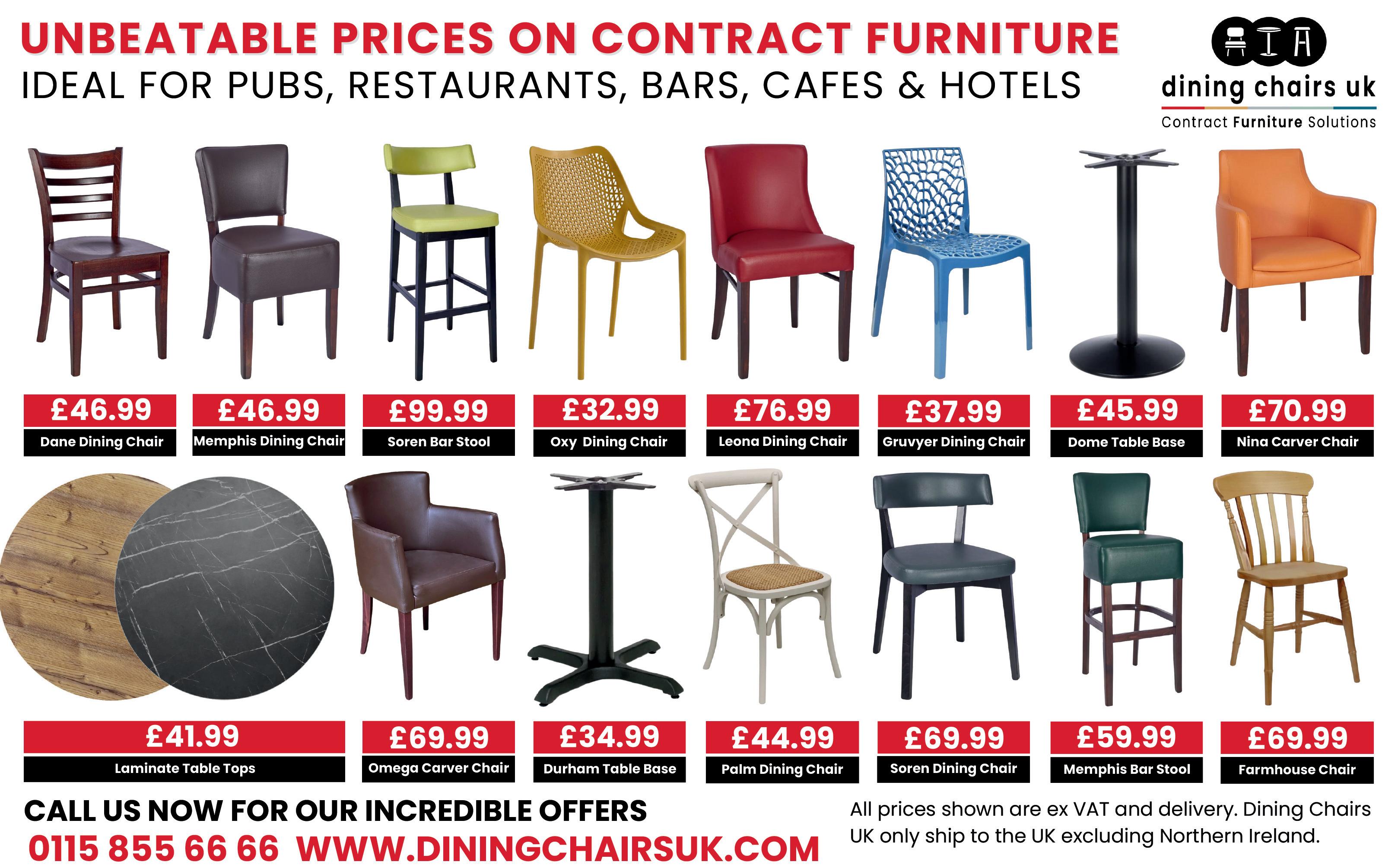

Hospitality is an industry built on optimism. Every successful publican, hotelier or restaurateur starts with a vision for how a space could be transformed. Yet when that space is a long-closed pub, a tired roadside hotel or a once-grand restaurant, optimism alone will not make the numbers work. These buildings can be costly to repair and challenging to adapt. But they can also become profitable, vibrant businesses once again – and the planning system, far from being a barrier, is often the key to unlocking that potential.
Before committing to a purchase, it is essential to know why a property failed. Some sites struggle because of structural decline or years of underinvestment. Others have been left behind by changing trade patterns or shifting customer expectations. A picturesque coaching inn that once relied on passing horse-drawn traffic is unlikely to thrive without an imaginative new offer and modern access arrangements.
A full appraisal should go beyond the building itself. Assess demand, catchment, competition, licensing constraints, parking and public transport links, and the need for planning consent. Many operators spend heavily on interiors and branding without fully understanding the regulatory framework, which could potentially bring about considerable delay and become one of the biggest items on the balance sheet.
That said, much of the negative folklore around planning is misplaced. In reality, planning exists to manage change, not to prevent it. Altering layouts, adding bedrooms or outdoor seating, expanding parking, or introducing new uses such as event space or co-working can all require permission (but not necessarily). Achieving the right planning consent can transform a business model, turning an unviable property into a profitable mixed-use destination.
Engaging a planning consultant early helps identify what is possible, what is likely to win support and where risk lies. Local authorities are usually keen to see empty or derelict buildings brought back into productive use. A well-prepared application that shows how a proposal will preserve heritage, create jobs and improve amenity is more likely to succeed – and often faster than applicants expect.
For many hospitality entrepreneurs, the phrase ‘listed building’ still rings alarm bells. Yet listed status should
By Simon Barry, Director of Boyer (an LRG company) -
not deter investment. The process of obtaining listed building consent is often more navigable than feared, particularly with experienced professional advice and the results of transforming a listed building can be stunning.
An example is our work with The Mitre in Oxford – the city’s oldest pub, with cellars dating back to the 1300s and an inn above built in the 1630s. Closed in 2019 by its then owner, Lincoln College, it required extensive repair but also needed to evolve to meet modern hospitality standards. When Gusto Italian acquired the building in 2022, it committed £1.4 million to restore historic features – from 17th century panelling and stone fireplaces to rare decorative stucco – while creating stylish dining spaces fit for contemporary diners. Securing listed building consent for such a site is about collaboration. Architects and planning consultants work together to identify what makes the building significant and how that can be retained while enabling a viable new use. Early ‘pre-app’ meetings with the council’s conservation team can shape proposals before formal submission, avoiding costly redesigns. In many cases, well-managed applications are approved by officers under delegated powers rather than going to committee.
The key is to recognise that planning is there to help historic buildings adapt. The system does not insist on a faithful return to past uses; it exists to allow meaningful, sensitive change. With careful engagement, listed buildings can be reborn as destinations that respect heritage while serving today’s market.
Consumer expectations have shifted. Flexible dining spaces, outdoor terraces, EV charging and high-speed Wi-Fi are now fundamental. Accessibility standards are higher, and sustainability – from energy efficiency to biodiversity net gain – is front of mind for both planners and guests.
Older buildings often need thoughtful adaptation to meet these demands. But planning can facilitate imaginative solutions: discreet extensions or garden rooms to create year-round space, sympathetic remodelling to improve flow and accessibility, or integrating renewable energy technologies in heritage settings. Local design codes and conservation policies can seem rigid but are usually negotiable when proposals enhance rather than erode character.
Too often, developers approach the planning process as a fight. In truth, collaboration works better. Most councils want to see heritage assets and empty buildings back in use. Engaging officers early, consulting with neighbours and community groups, and showing how a proposal will create jobs and amenities can significantly reduce delays and objections.
Where a site is listed as an Asset of Community Value (ACV), there are extra procedural steps and community bidding rights. But these do not make regeneration impossible. With the right advice, an ACV-listed pub can be sensitively upgraded or diversified while respecting its social importance.
MAKING THE NUMBERS WORK
Reviving a neglected hospitality site often requires phasing and careful funding. Many successful operators open a core food and drink offer first, then add rooms or events space once cash flow allows. Planning permissions can be structured to support this staged growth. In some locations, grants or local regeneration funding may also be available, particularly for listed building repair or sustainable upgrades.
OPTIMISM REWARDED
Taking on a tired pub, hotel or restaurant will always be a calculated risk. But it is a risk that can pay off –commercially and culturally – when combined with smart planning and informed design.
The planning system is sometimes portrayed as a brake on entrepreneurship. In reality, it is a framework for making ambitious projects viable, protecting what is special while enabling adaptation. For hospitality businesses prepared to work with it, planning is not a hurdle but a powerful tool to turn neglected buildings into thriving destinations once again.


We are a specialist company of top flight hospitality professionals that has all the necessary skills and experience to successfully attack and solve all the worrying issues that you are facing. We are here to support independent owners of Hotels, Pubs, Restaurants and Night Clubs (Leasehold & Freehold)
We arrange emergency finance at all levels for all reasons, we arrange 100% payroll funding, we organise full management cover, we sort out all vexatious litigation (landlord, bank, HMRC, utility, supplier, shareholder, investor & rates issues) we purchase pubs & hotels, we source tenants, we design bespoke Agreements, Leases, Business & Appraisal Plans, Debt & Creditor Plans, we are an excellent ‘one-stop shop’ for anything you need. Our range of services is extensive and unique, we move fast, we ‘think outside the box’ we solve problems ! our Associates covering all the necessary professional disciplines are the very best in the UK, we can supply numerous first class references from many satisfied clients – please note a selection of past client success stories;
• £2.6M raised to stop a joint Bank / HMRC hotel repossession (Kent)
• £650K raised to enable a tenant to buy-out the pub freeholder (Bedford) £510,000 raised for the purchase of 3 pub-leases (Taunton)
• £415K raised for a hotels cashflow funding ( Newcastle)
• £2.6M raised for a hotels redevelopment funds (Hampshire)
• Planning Consent gained for hotel ‘change-of-use’, freehold profit of £2.7M ( South Wales)
Insurance Payout for a Hotel increased from £57,300 to £165.450 (Mid-Wales)
• Management Contracts on 2 Hotels, buyers secured at £8.9m (Hereford and Manchester)
• Successful renegotiation of 5 pub lease rents, rents reduced significantly (Devon, Somerset)
• Long Term Tenant sourced for a renowned Country House Hotel ( Mid-Wales)
• Litigation against previous hotel owner, successful compensation for new owner £133,000
• Litigation against construction company, successful compensation for hotel owner, £115,400
• Successful tendering process on a nationally famous London Pub ( 116 applicants )
• 2 X Successful renegotiation of pub tenants exit costs to the landlord (Kent &Cornwall)
• 17 successful business plans, 22 successful loans, 14 successful cancellations of repossession
• 22 leases successfully re-negotiated, 27 quality tenants for landlords successfully sourced Call ourselves, don’t delay, we can solve your problems!
Tel. 07399 287402
Email : enquiries@hotelandpubrescue.co.uk www.hotelandpubrescue.co.uk

With
Our experts will analyse your entire operation and also its key operating figures if they are available. We then help you to identify strategies to manage costs and overheads associated with the core Profitability of running a Hospitality business.
The largest overhead, even higher than Cost of Sales, is the Labour cost, so, with detailed analysis of your wages and being able to understand ‘’the way your business

actually works’’ we can ensure that you are maximising the labour usage in your business.
Budgeting, Forecasting, Menu Management, Stock Controls, Purchasing, and controlling Variable Costs are just a few of the other areas that David Hunter, your Restaurant Consultant, will work on with you, and improve with you.
Managing people brings with it a whole set of new skills that are now needed more than ever. From ‘’Managing the Managers’’ through to Service and Kitchen staff, your team needs careful and skilful Management, Motivation, guidance and Development.
If your business is actually struggling, or if you just feel that it could be doing some things better, give David Hunter a quick call on 07831 407984 to arrange a ‘’Free of Charge’’ initial consultation (please quote CLH Offer), when David will discuss with you what could be achieved if you ask us to work with you.



